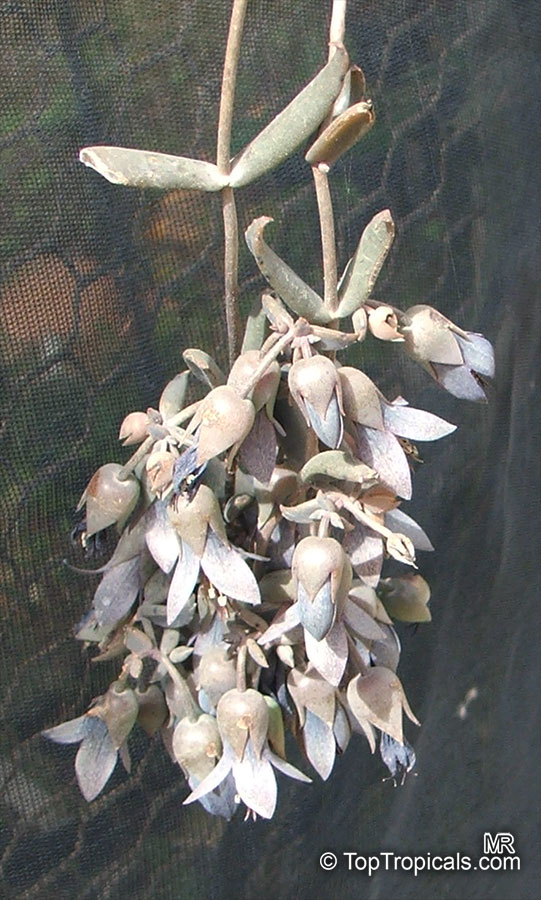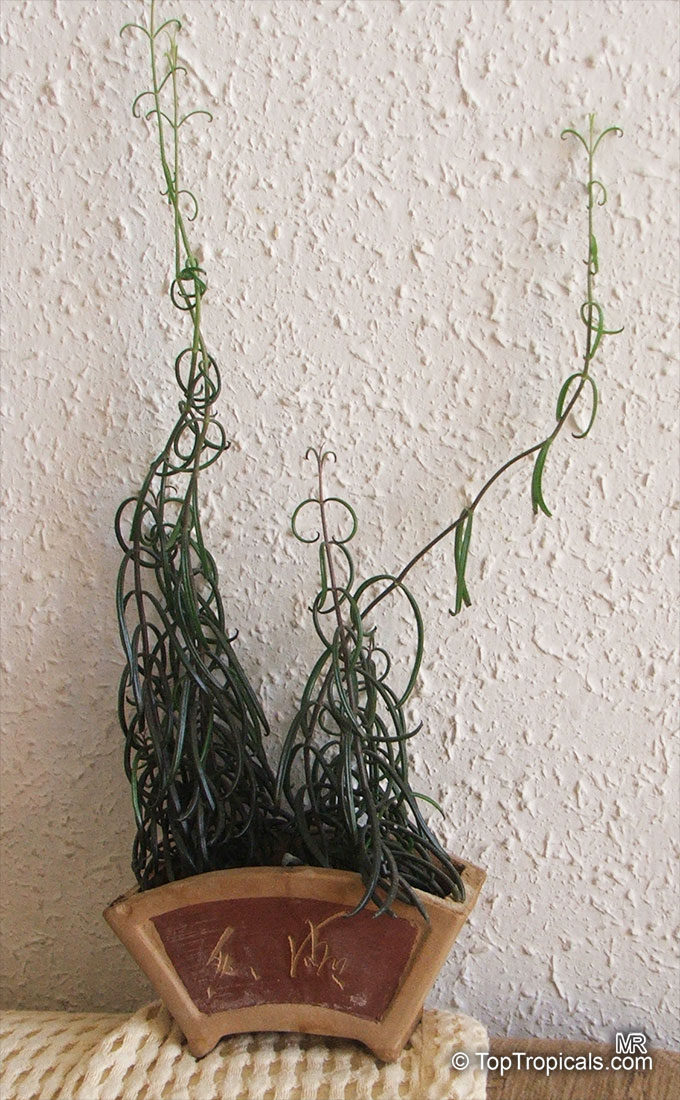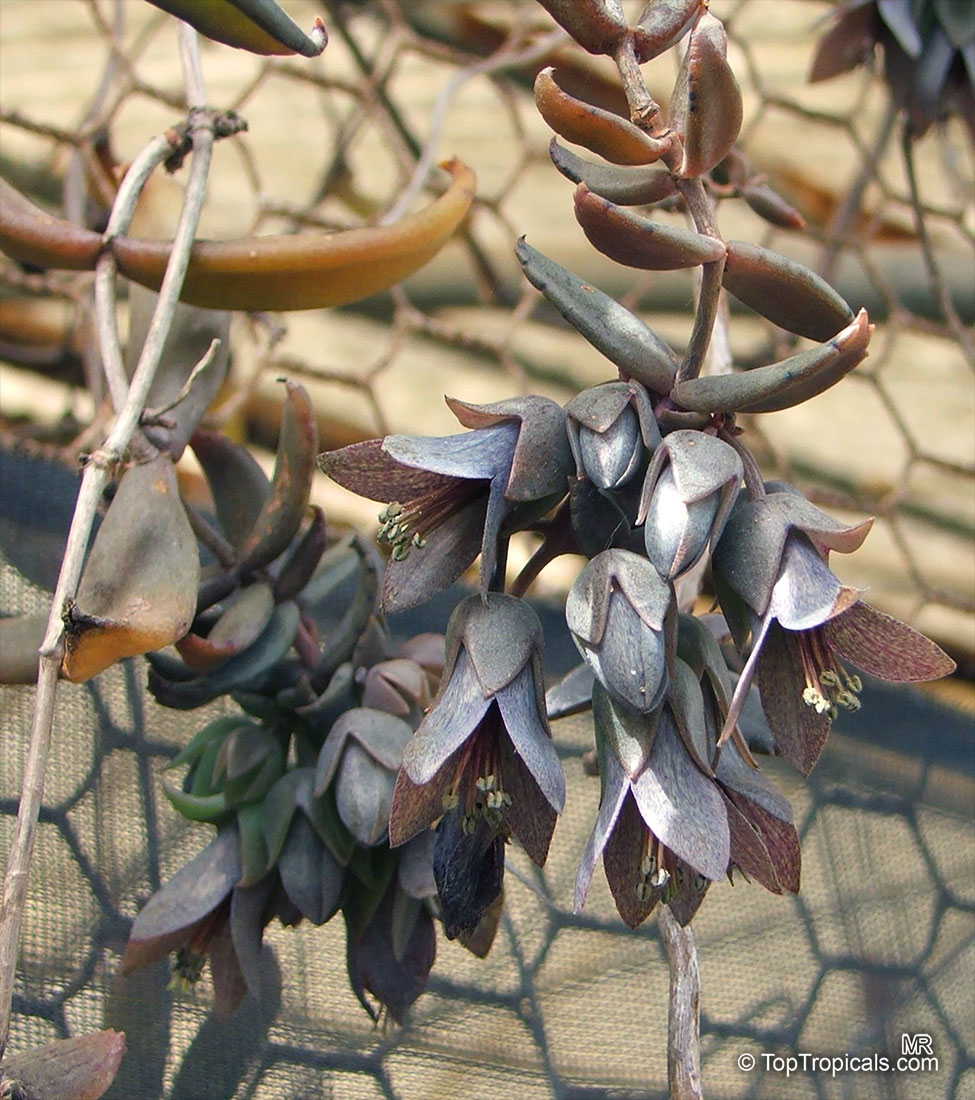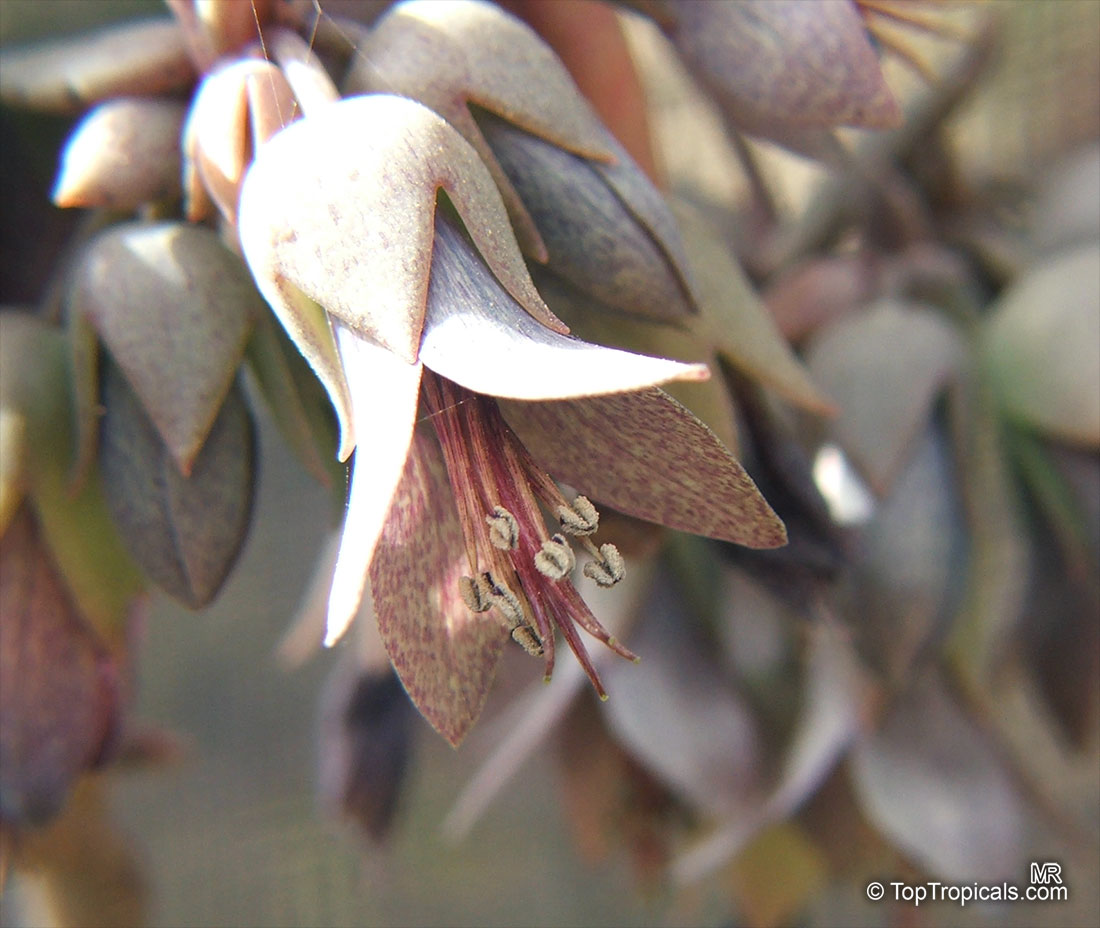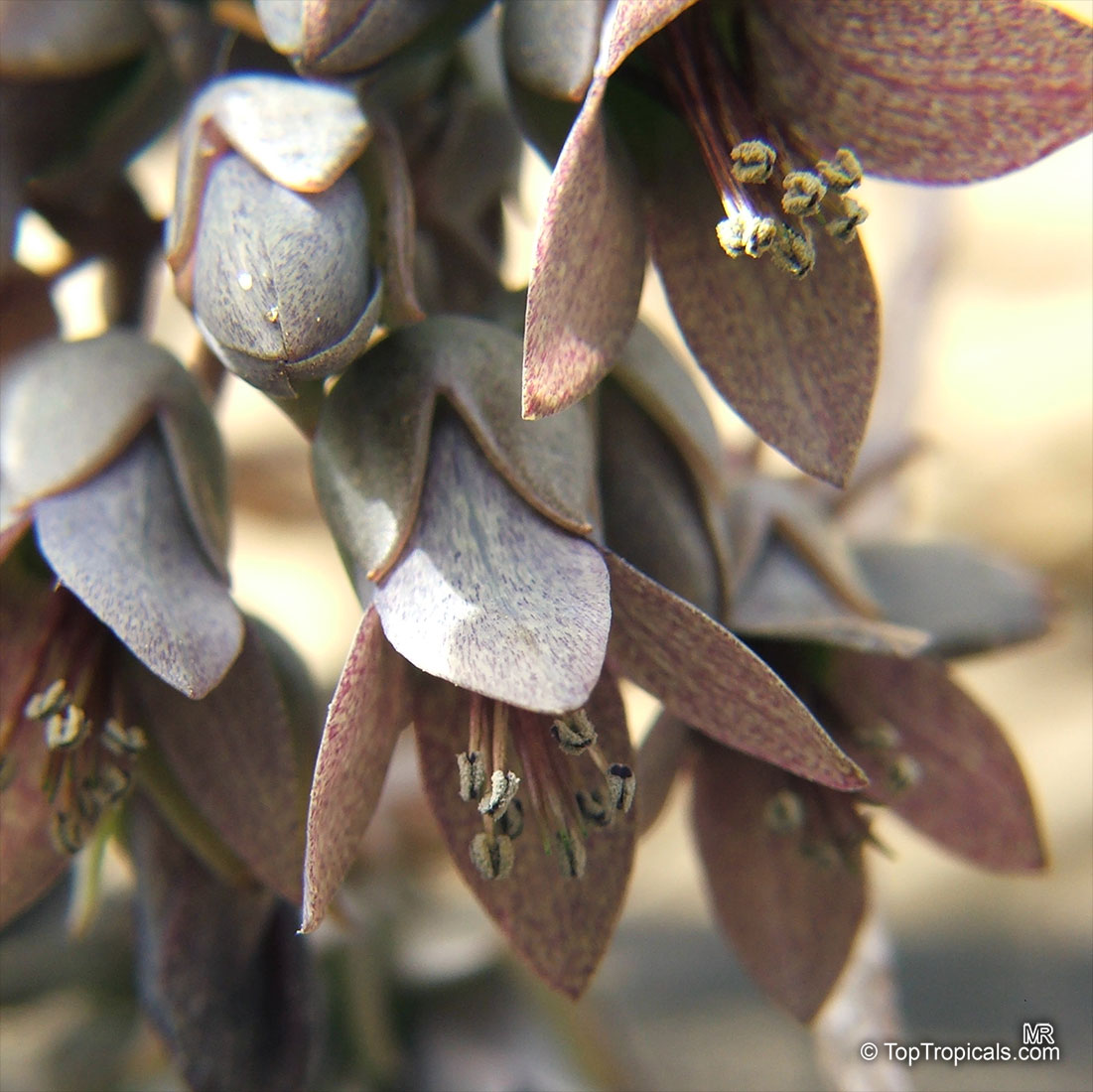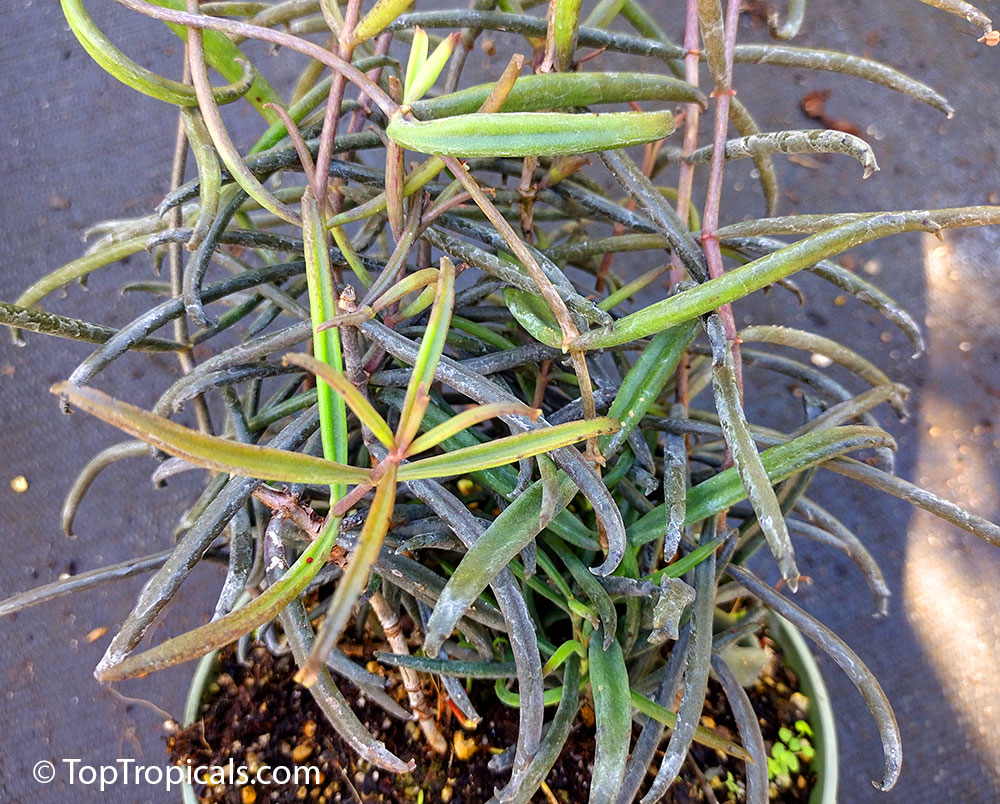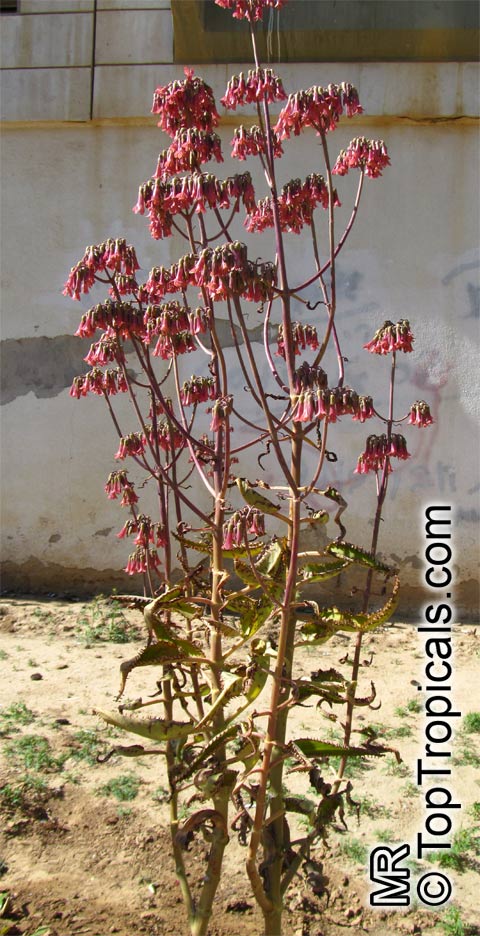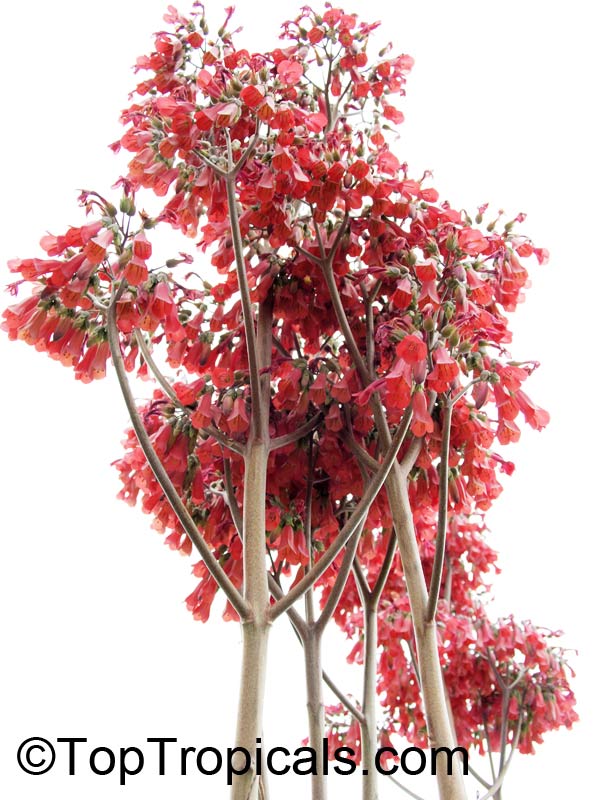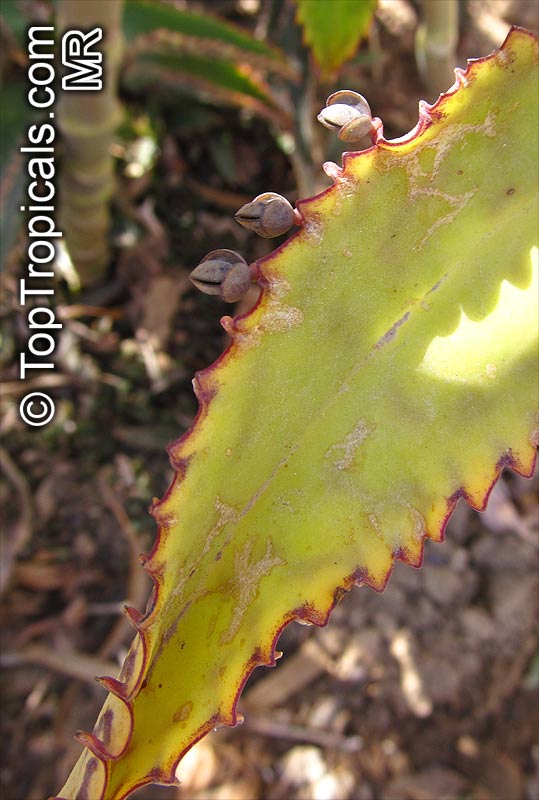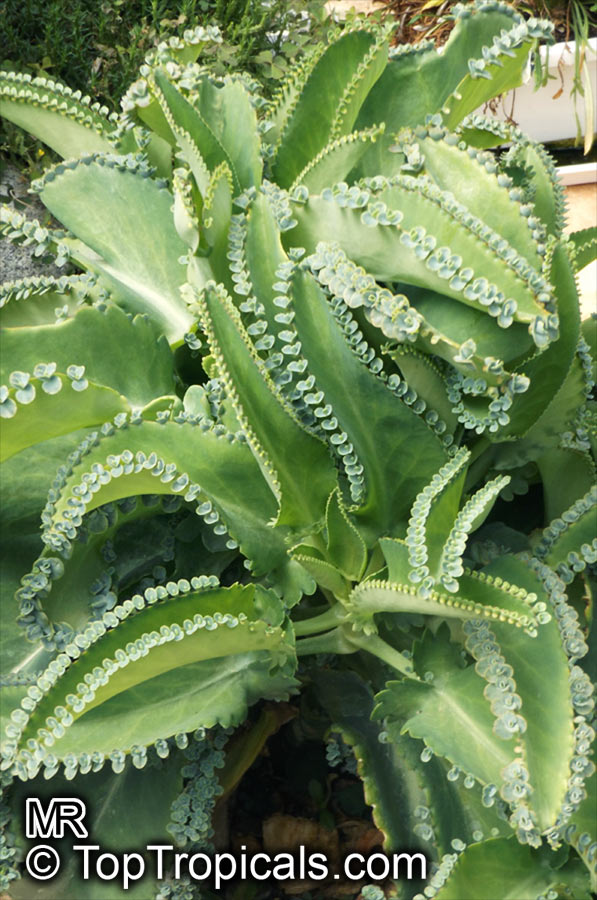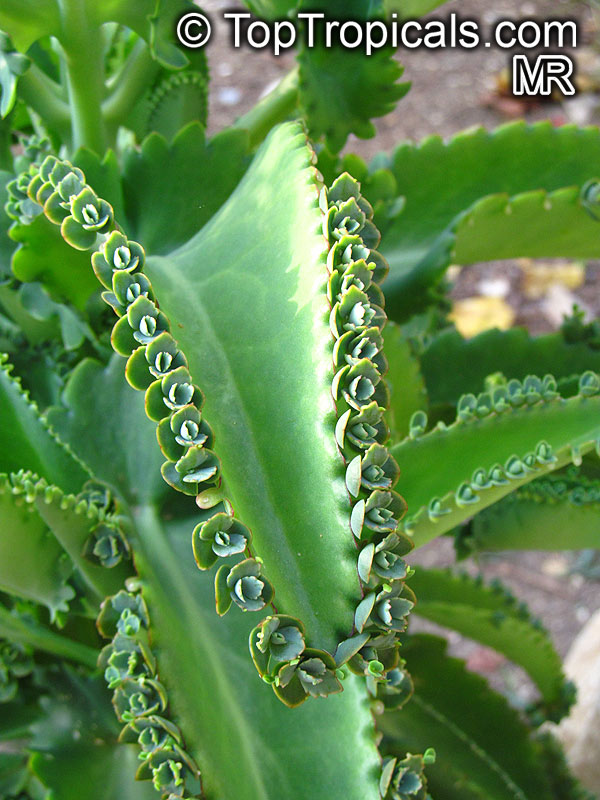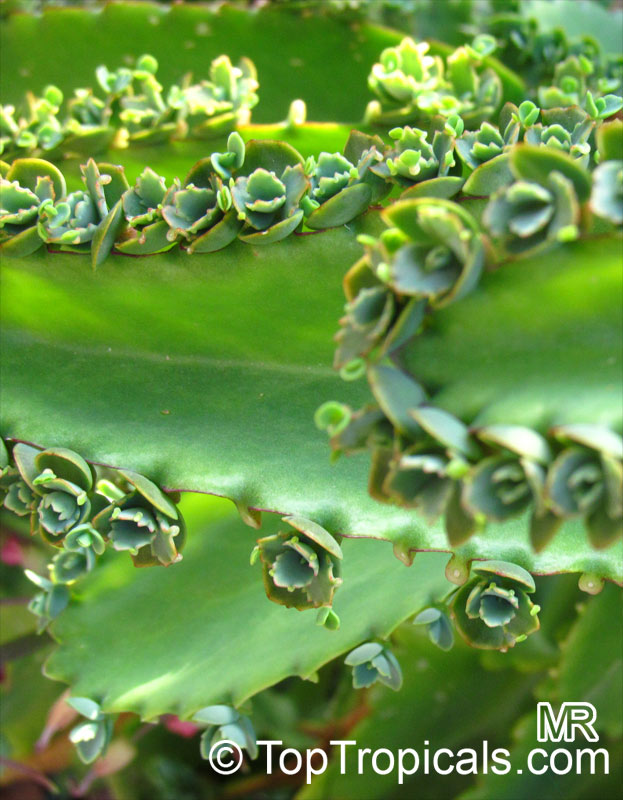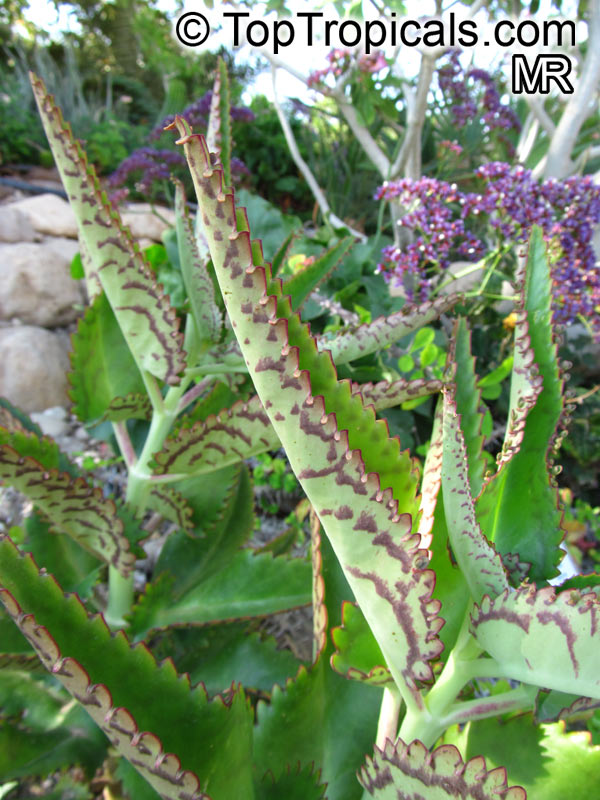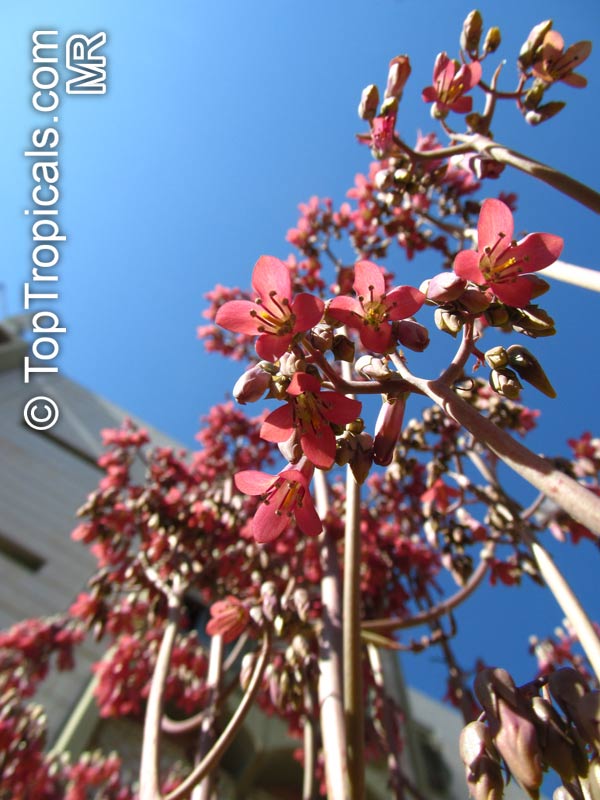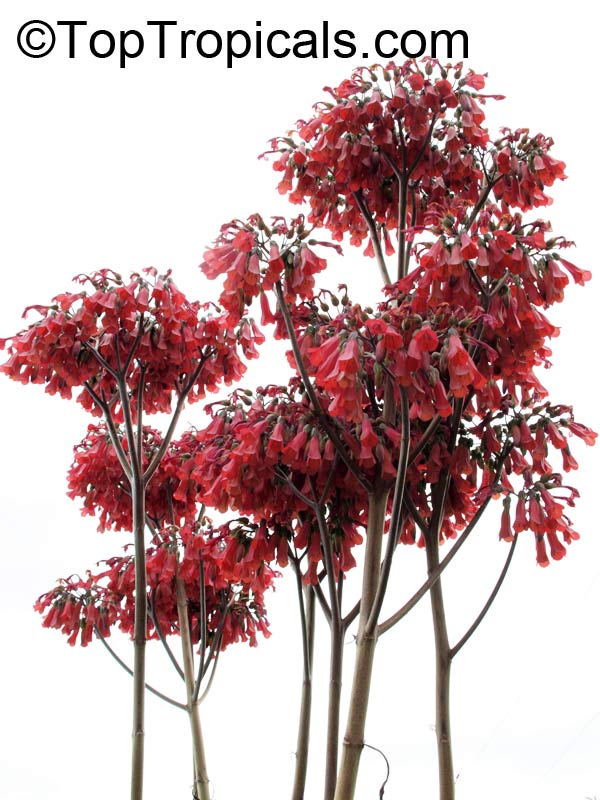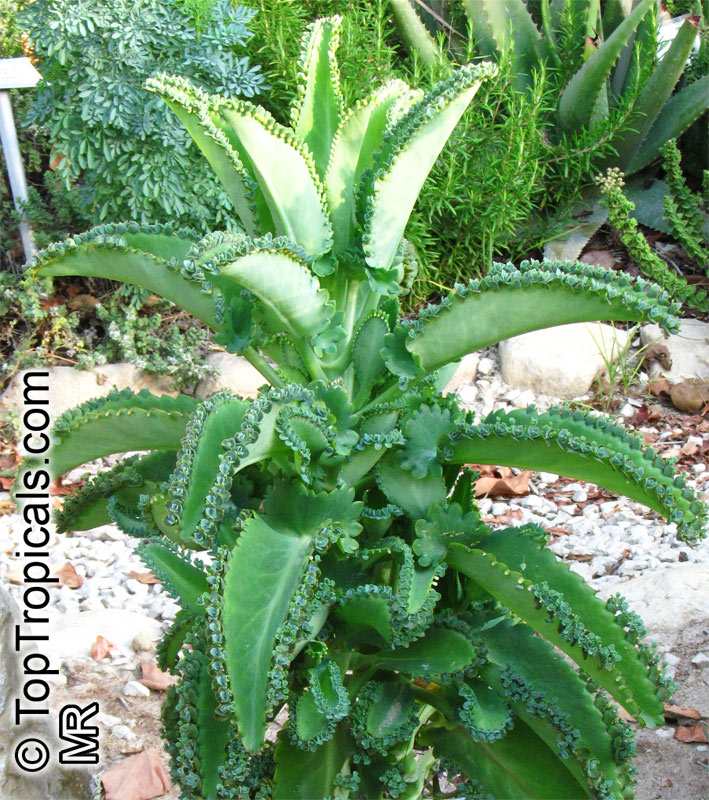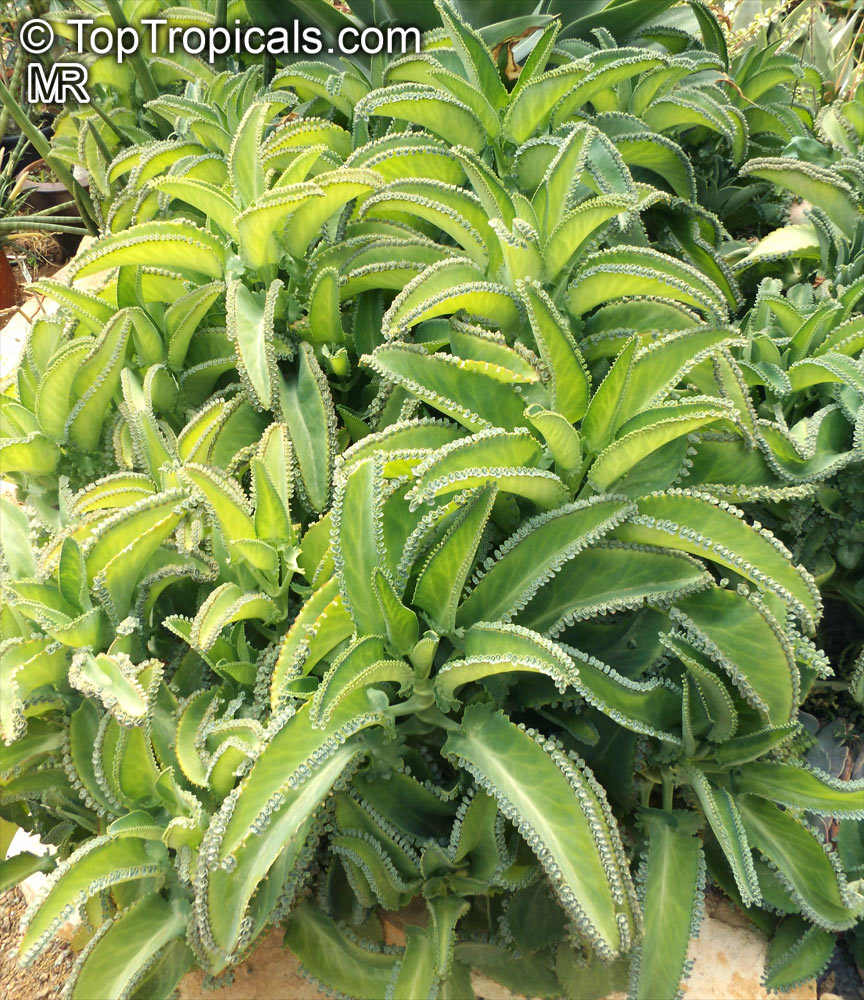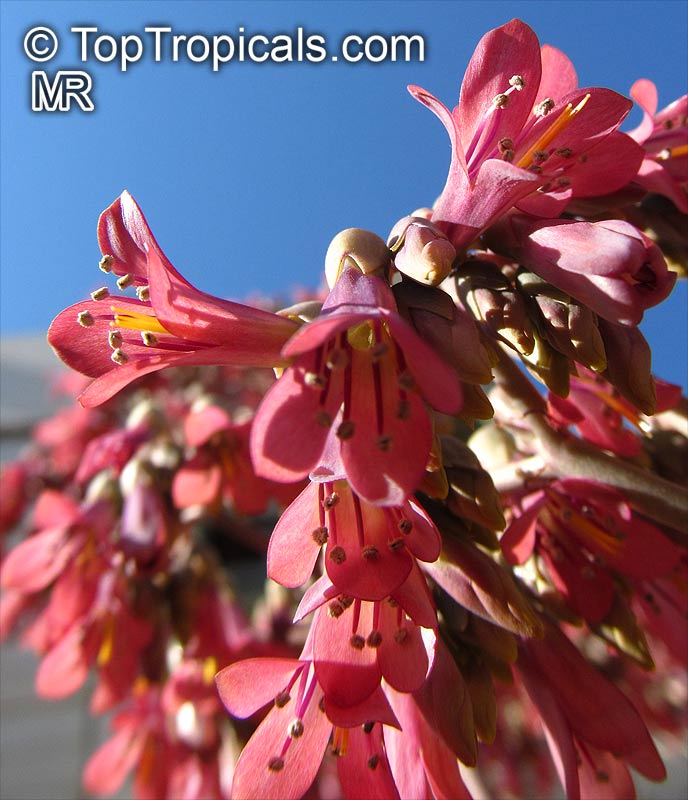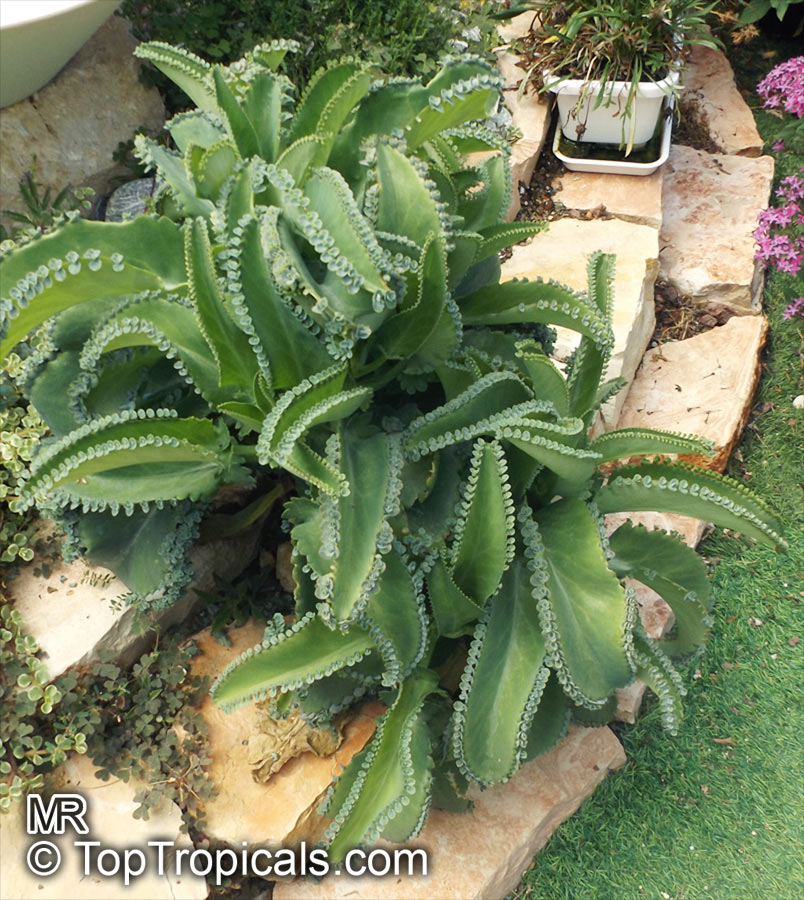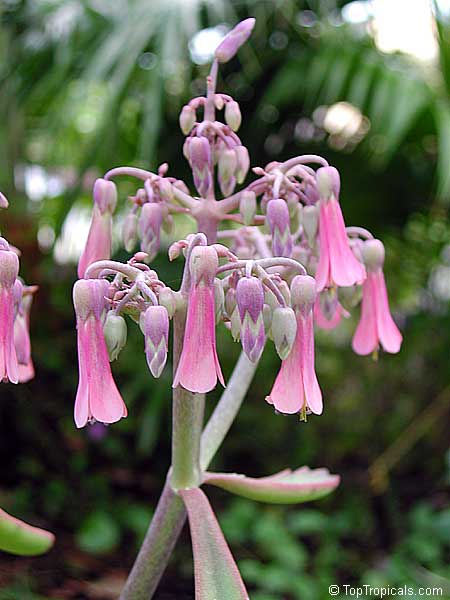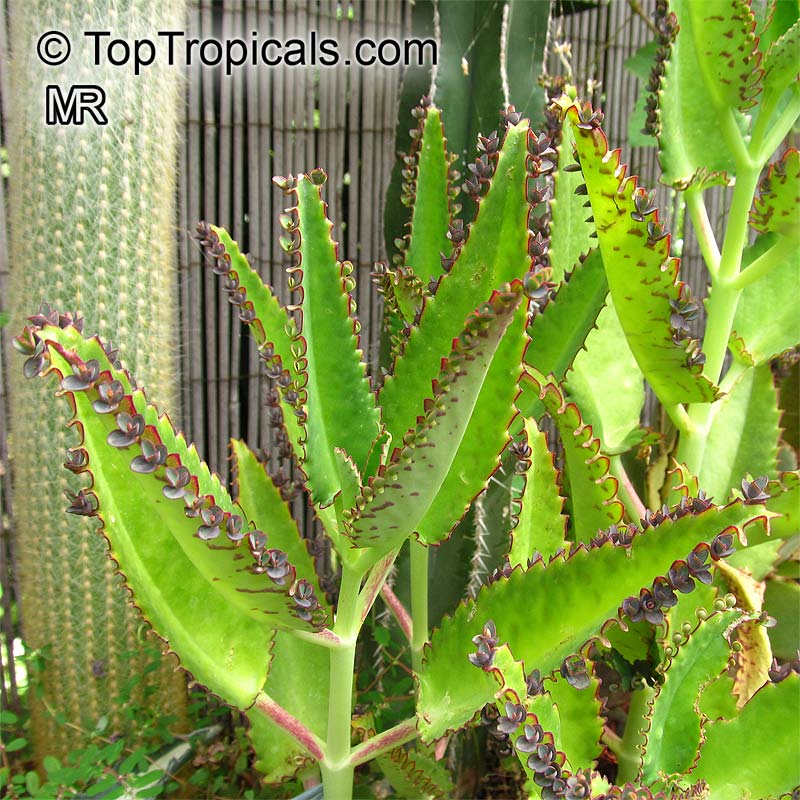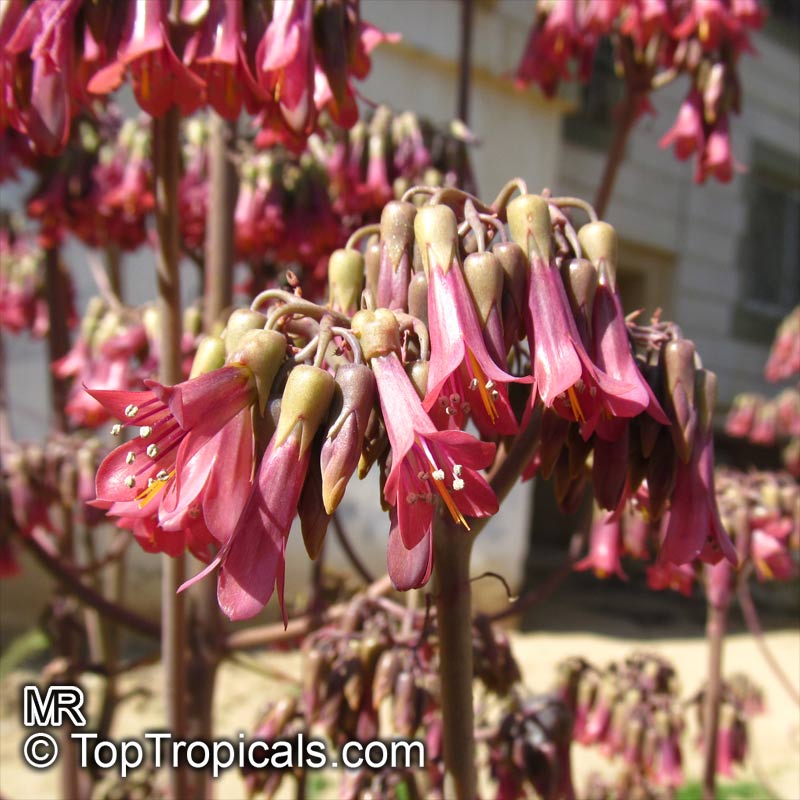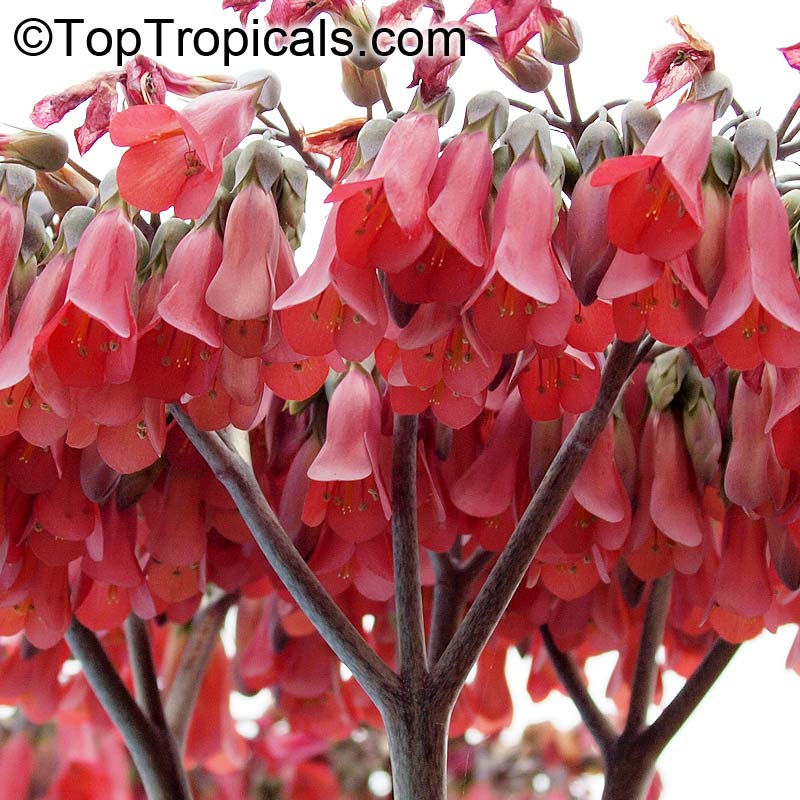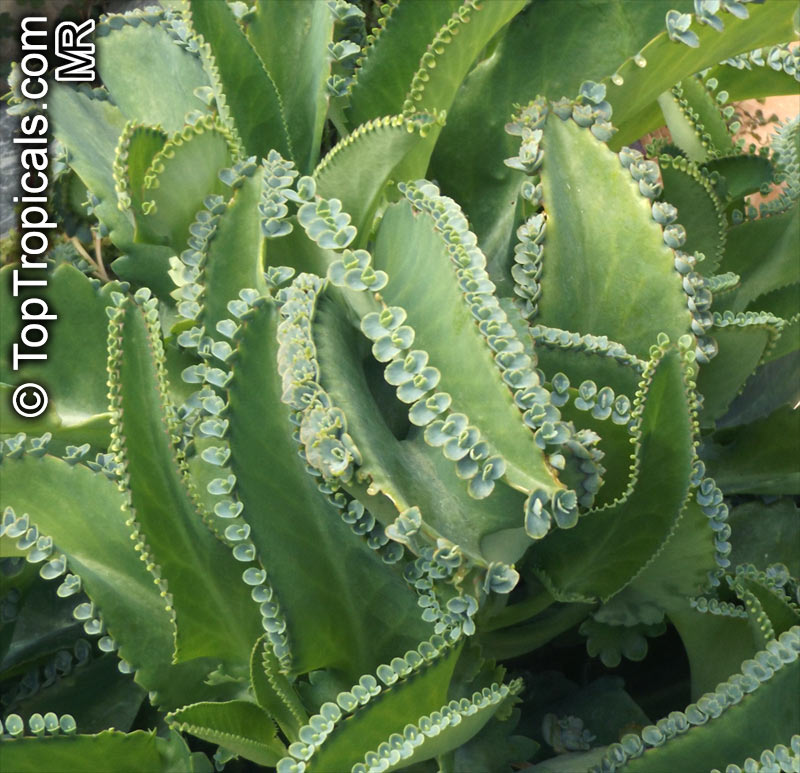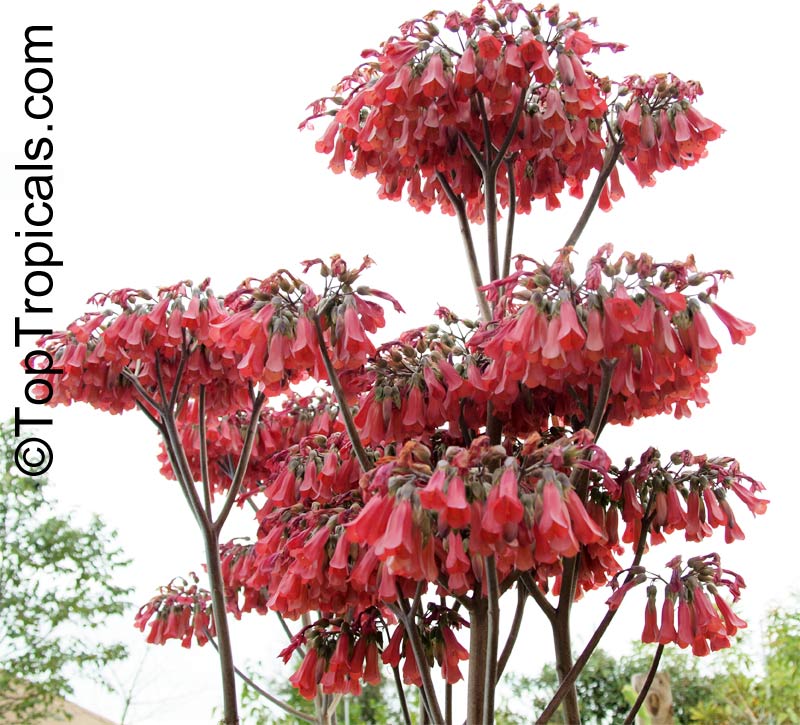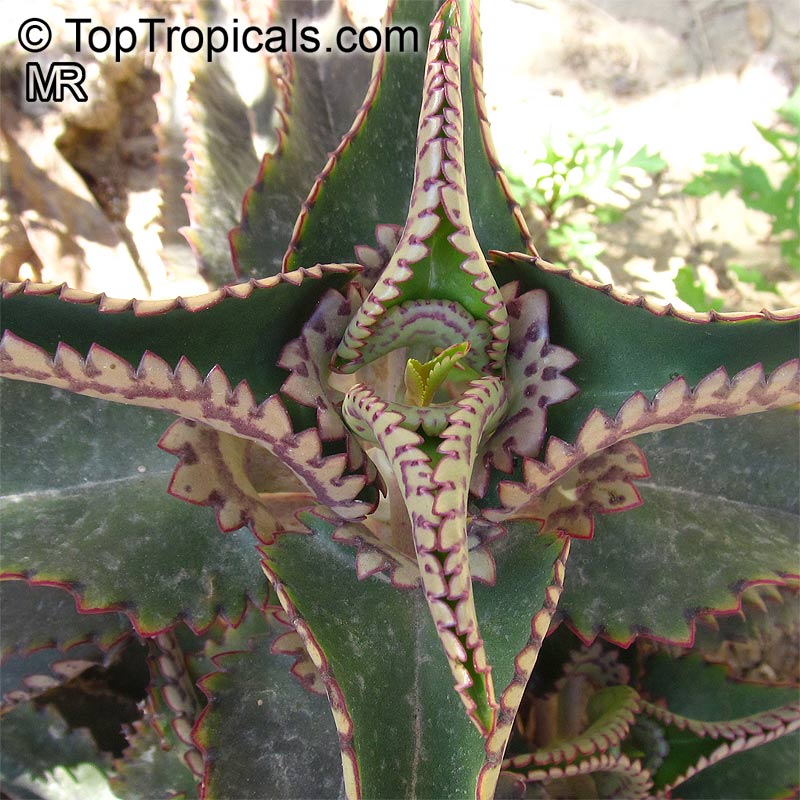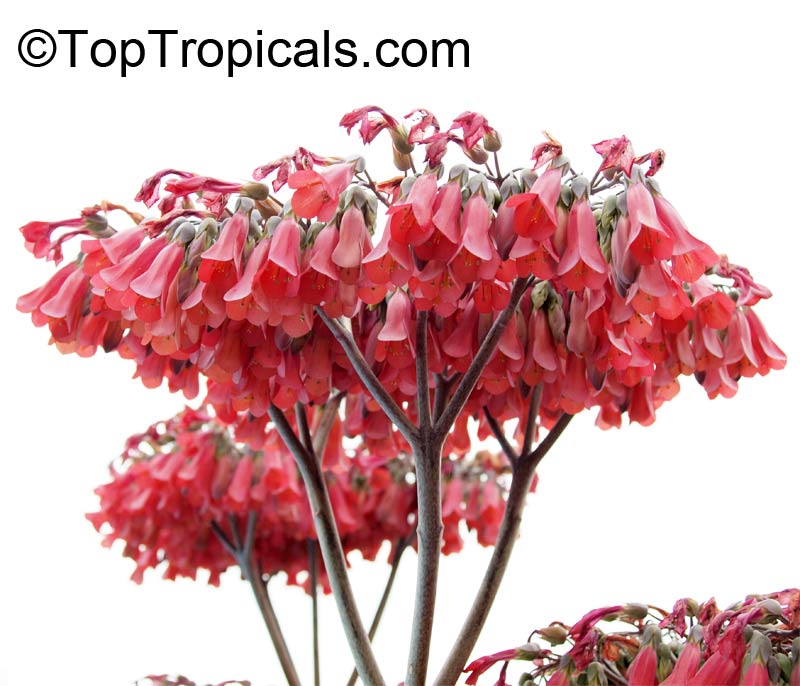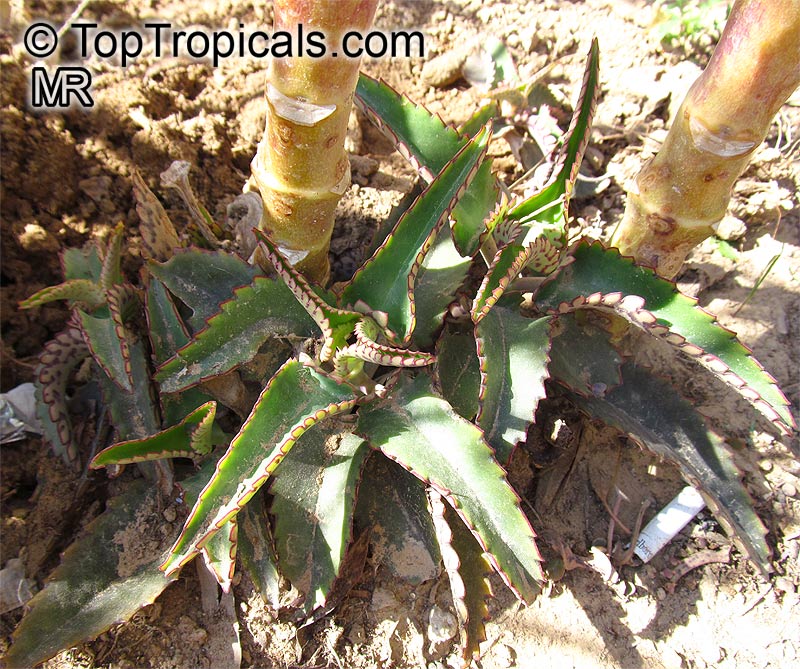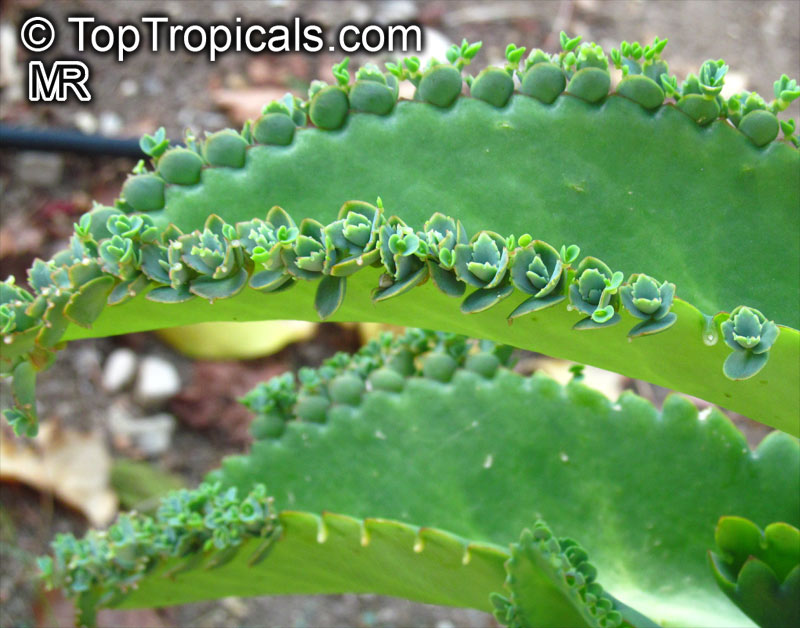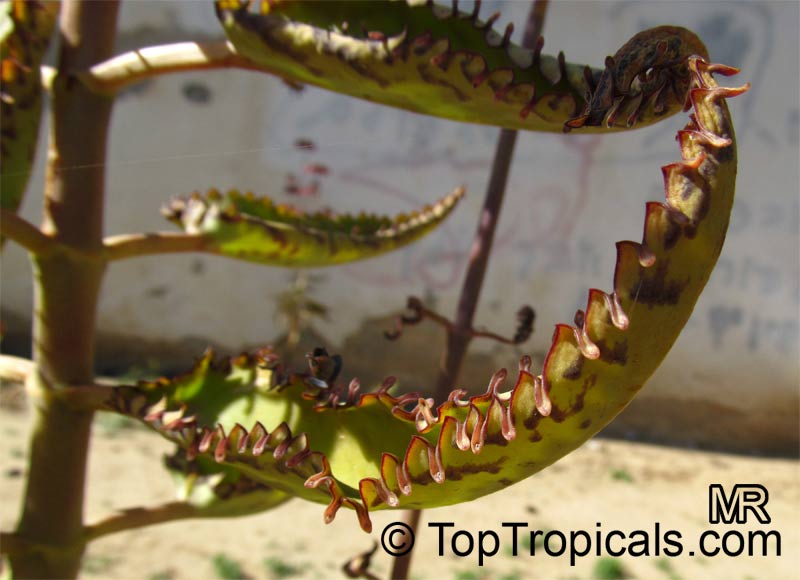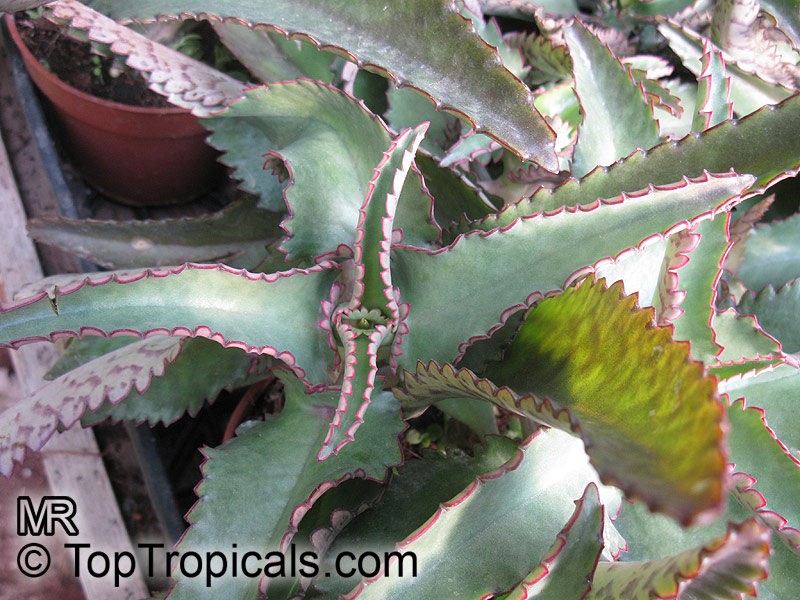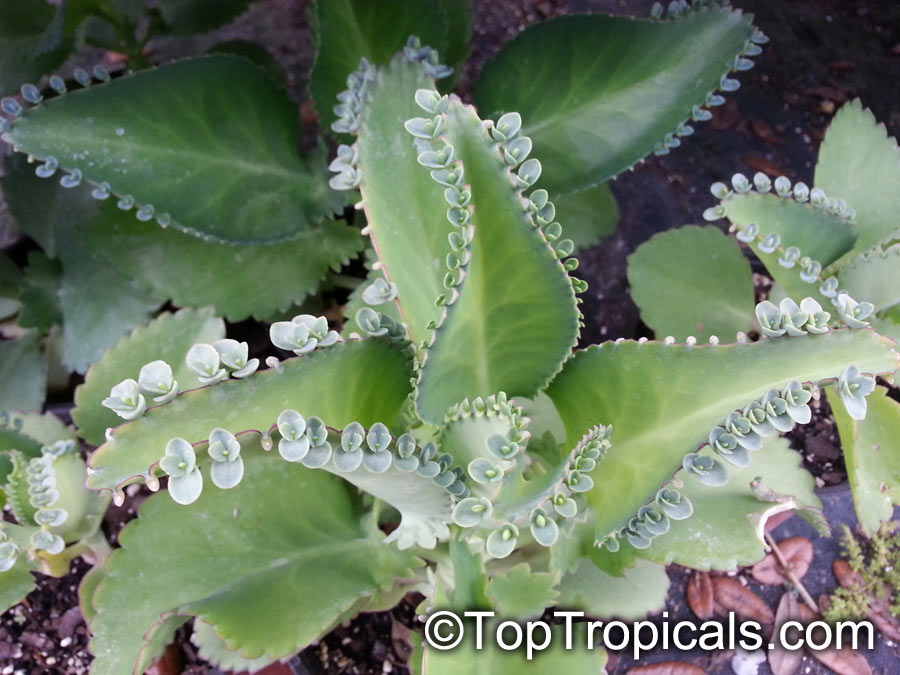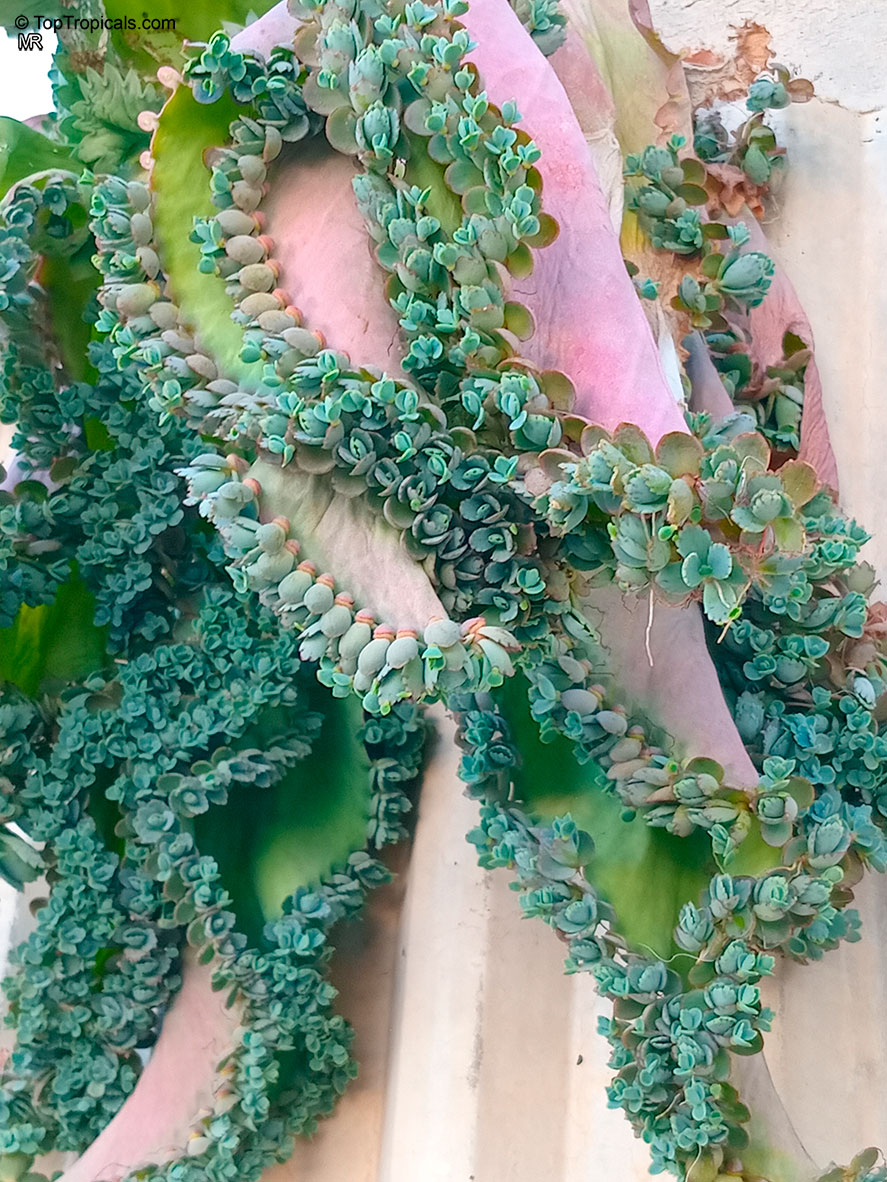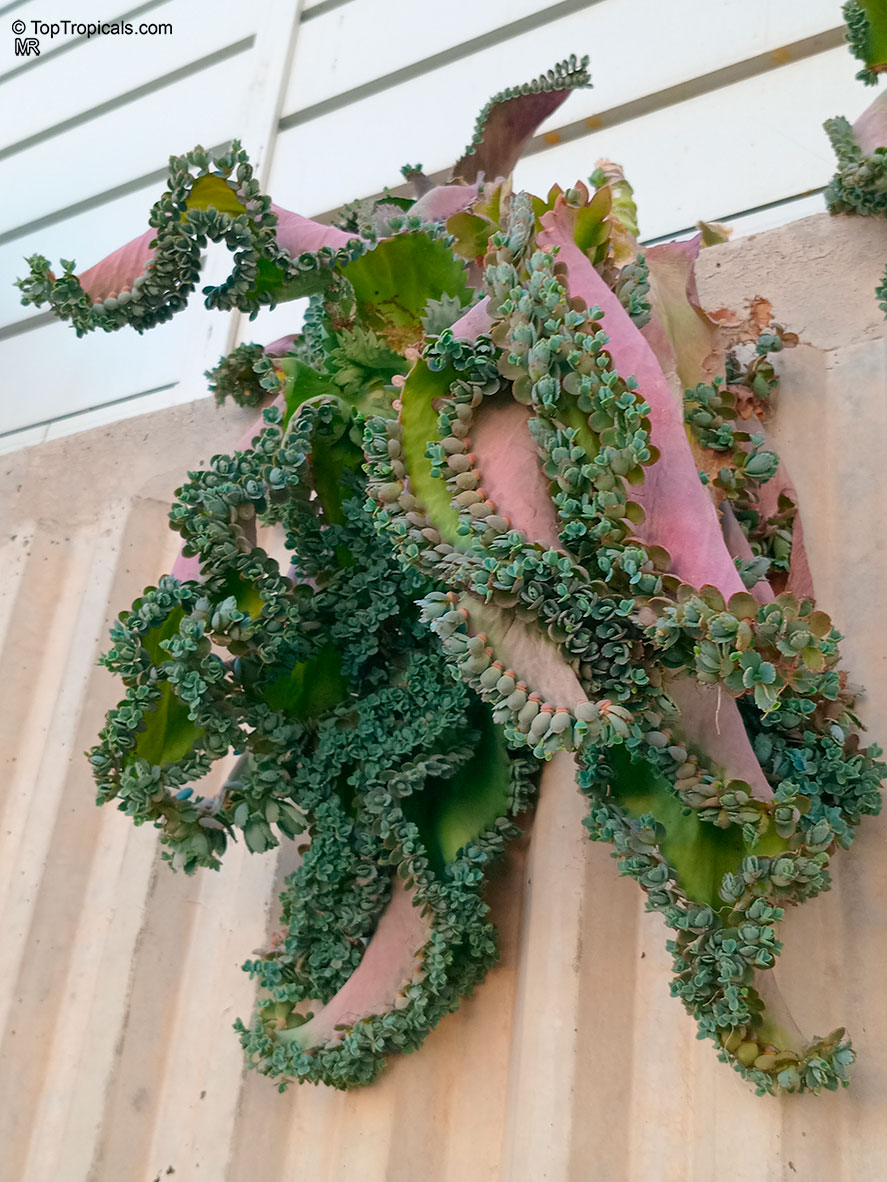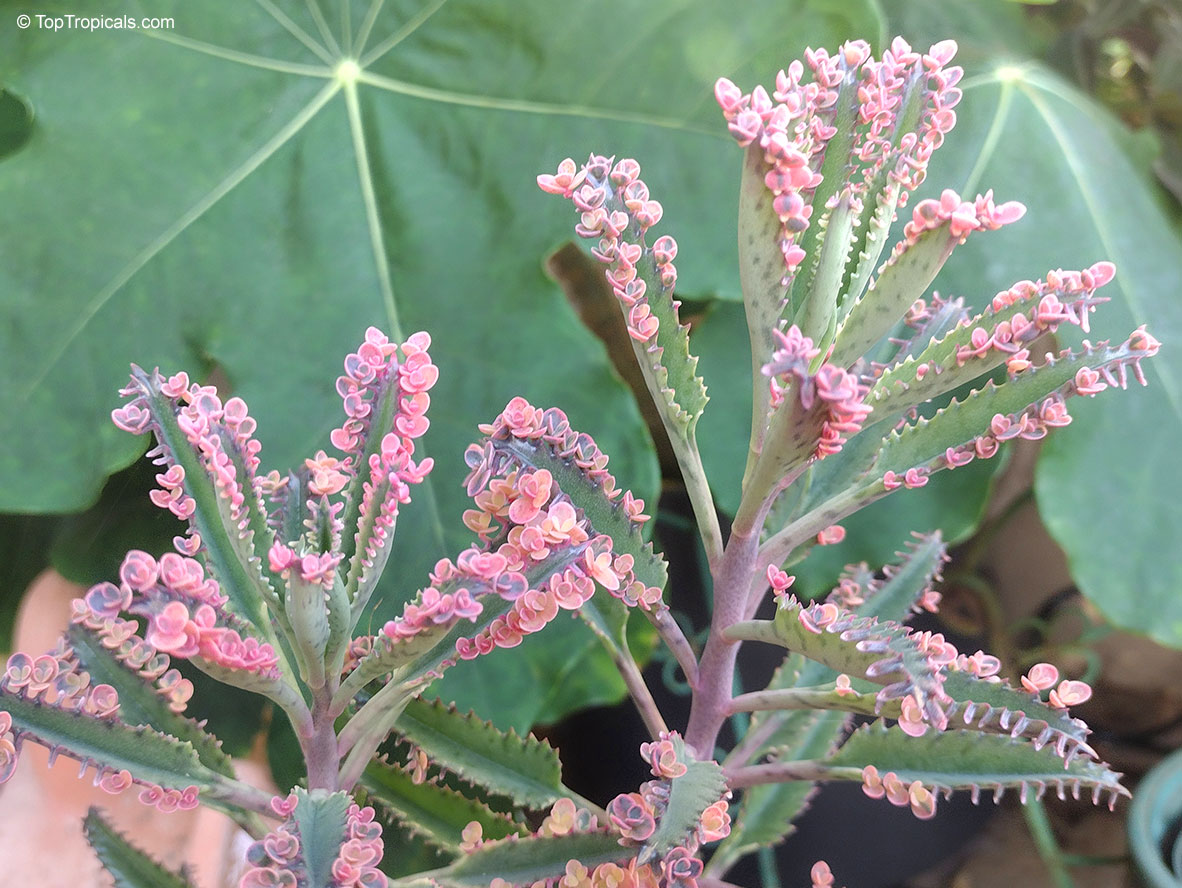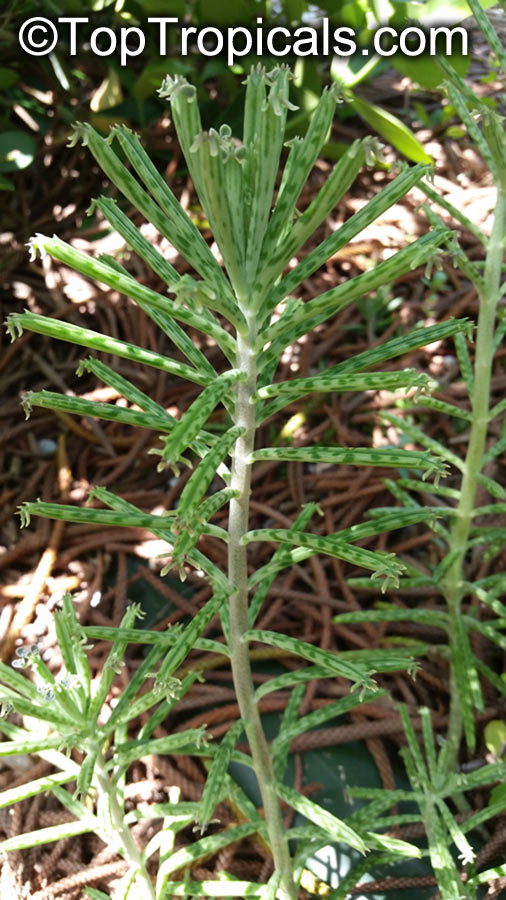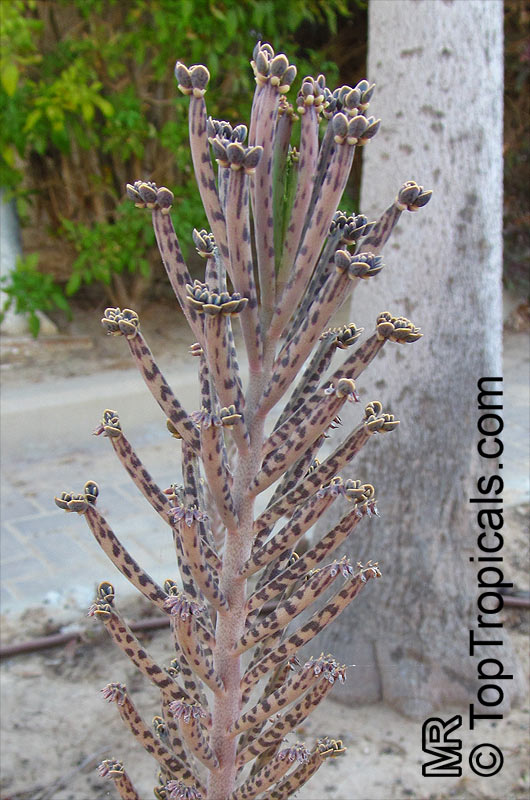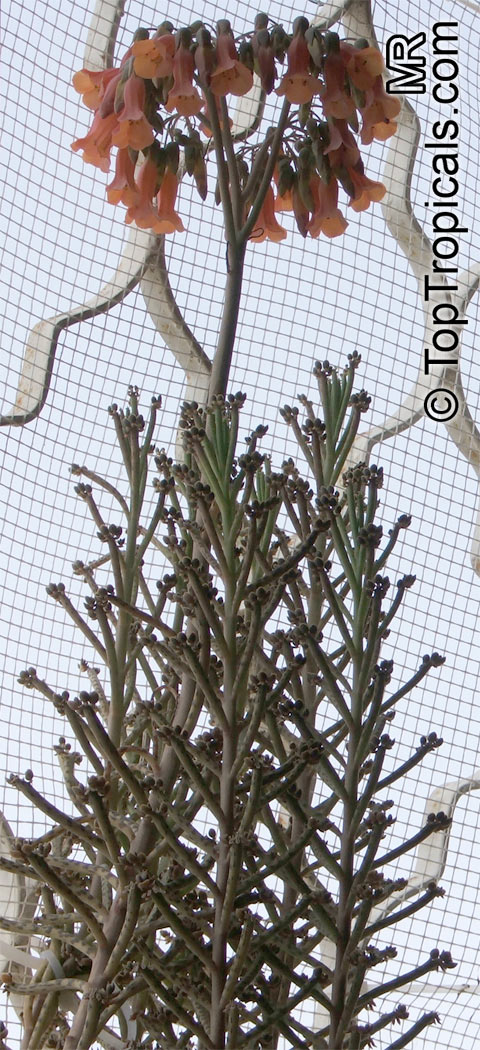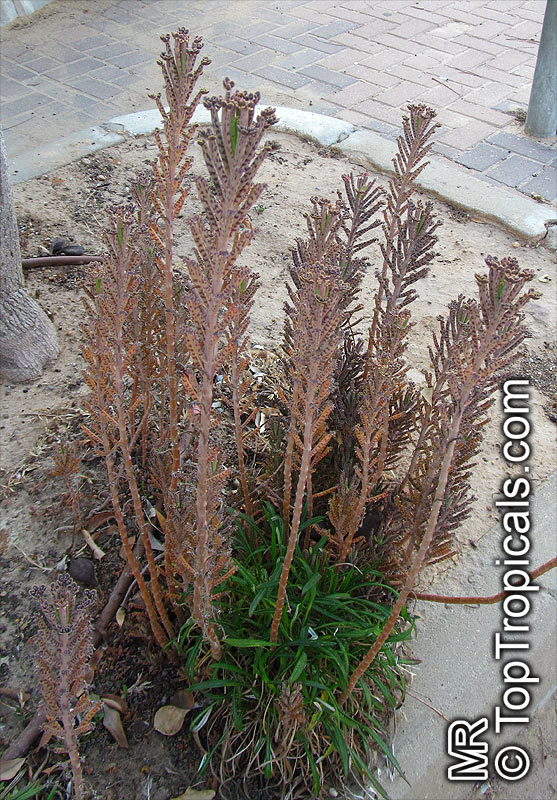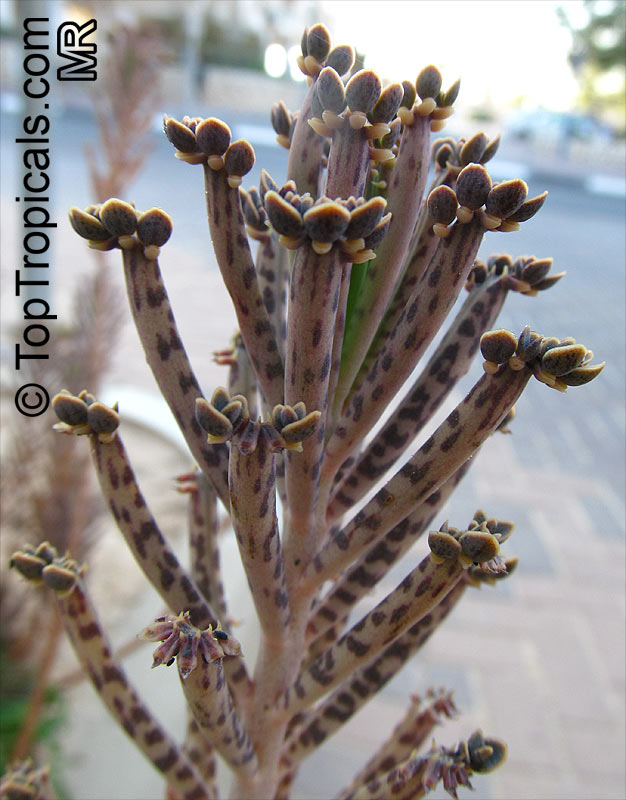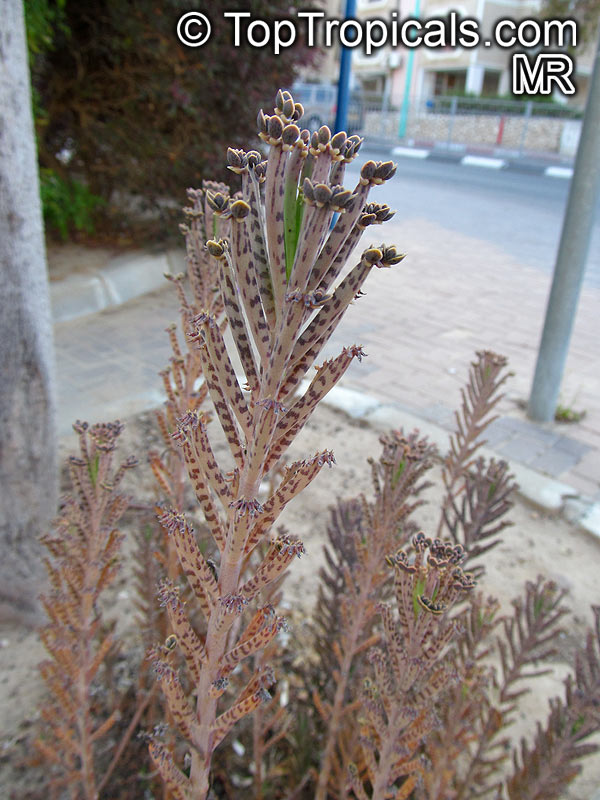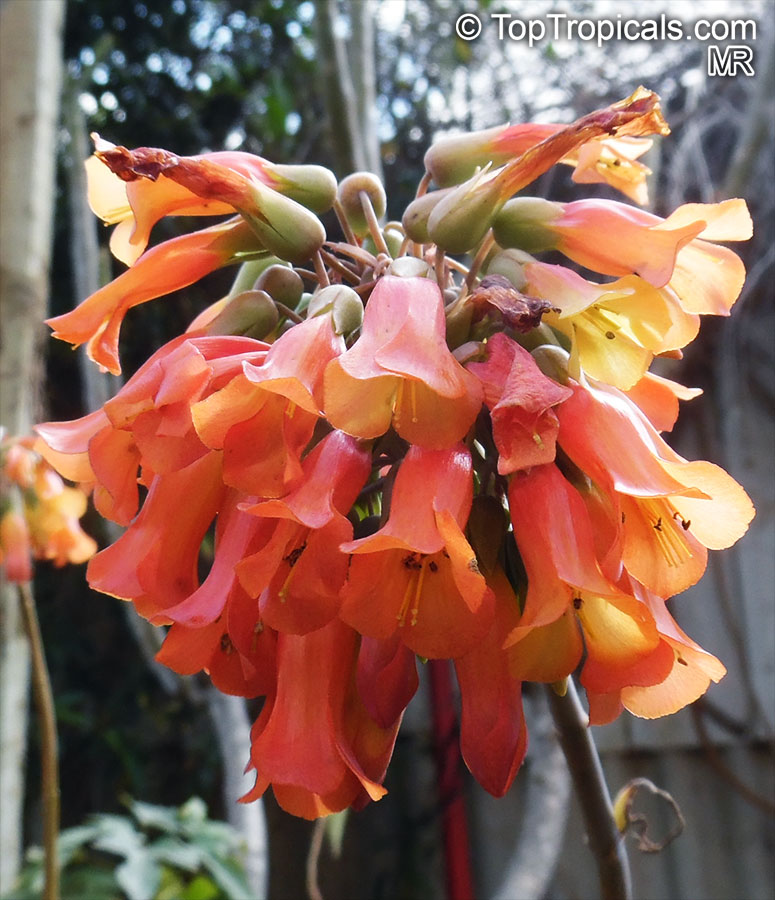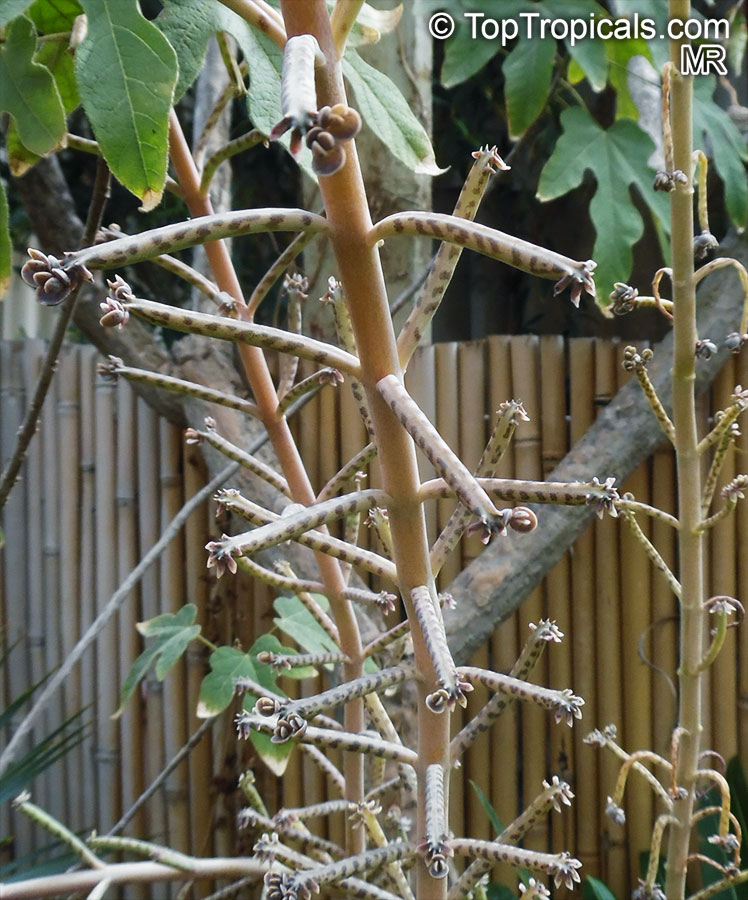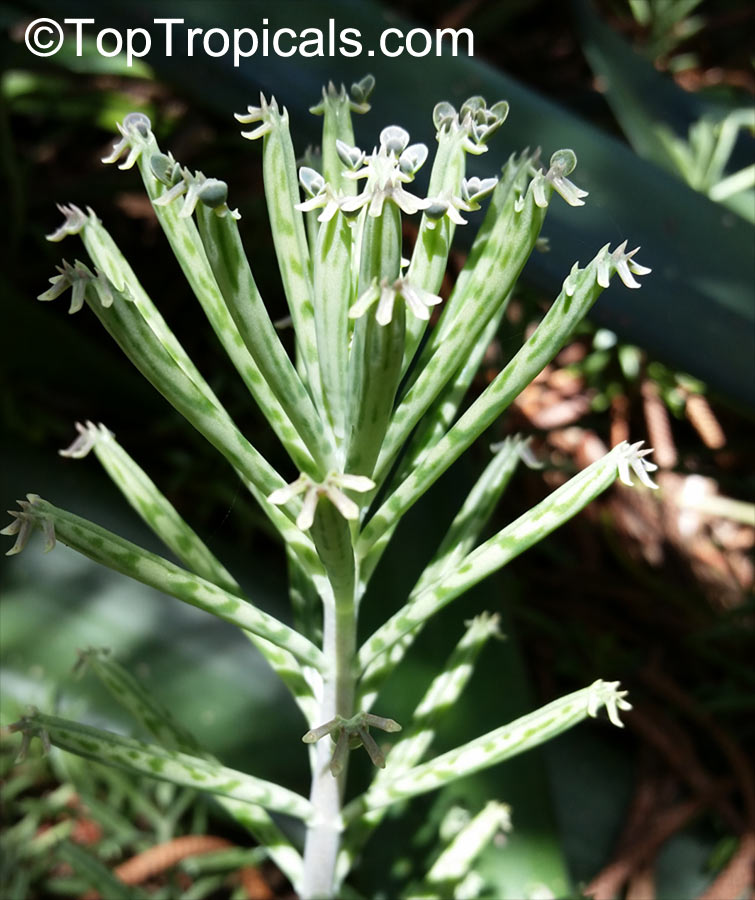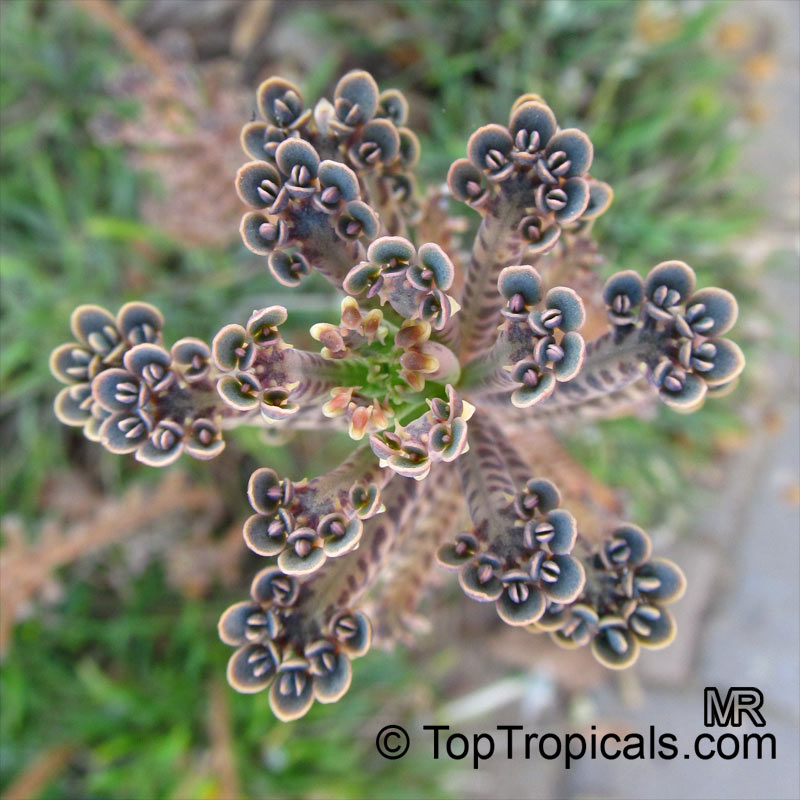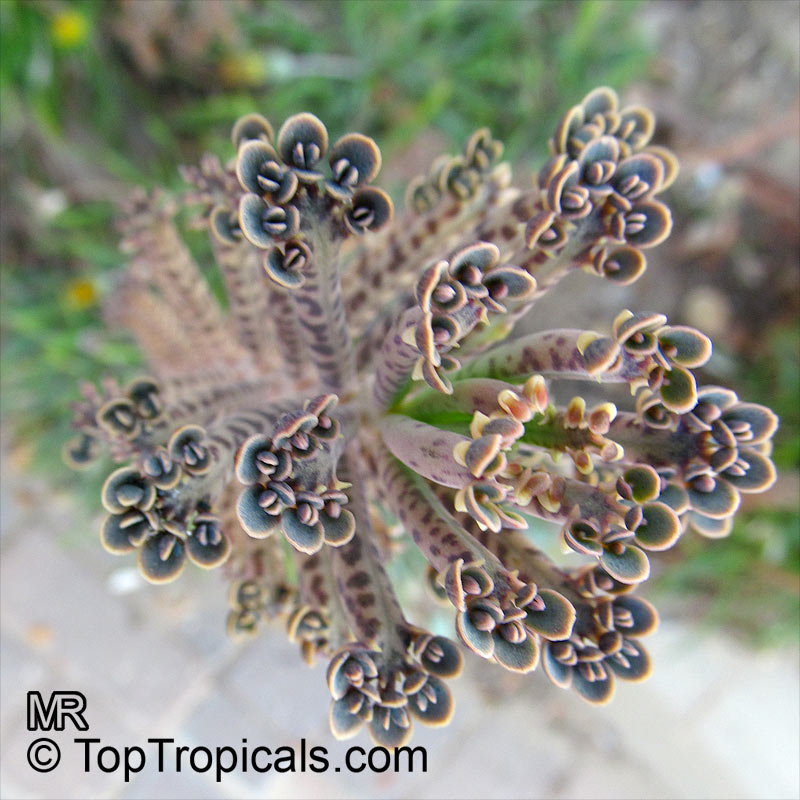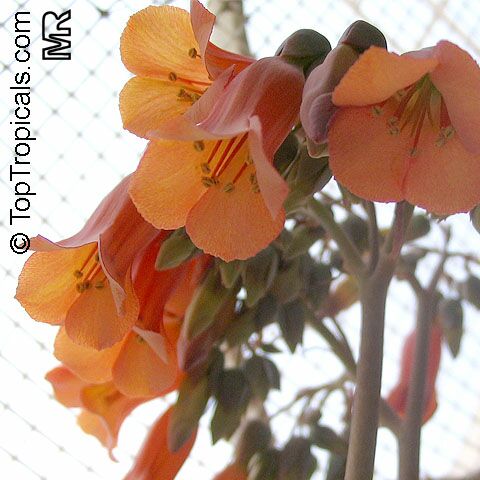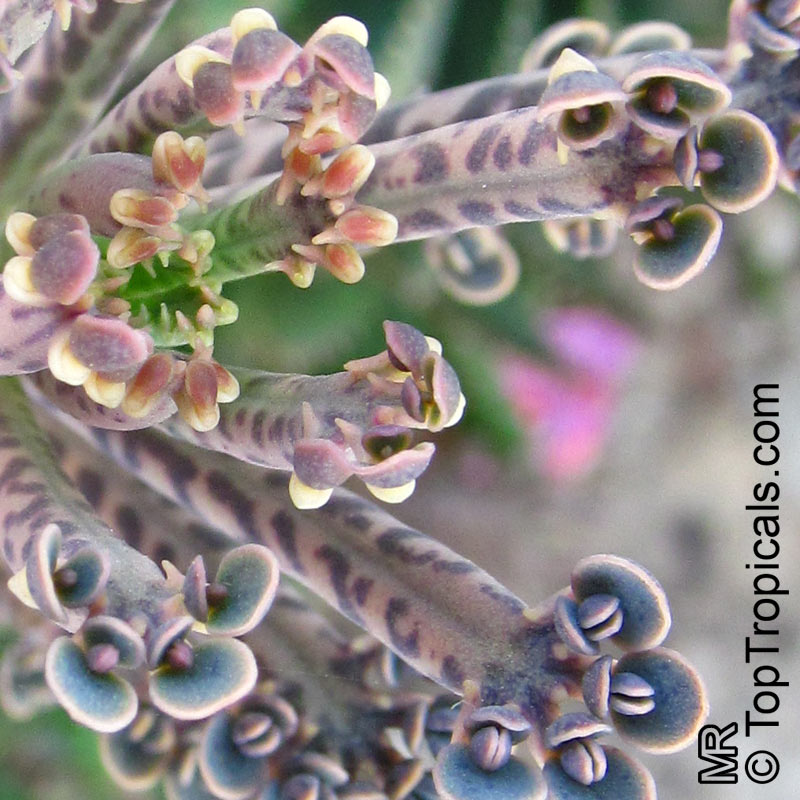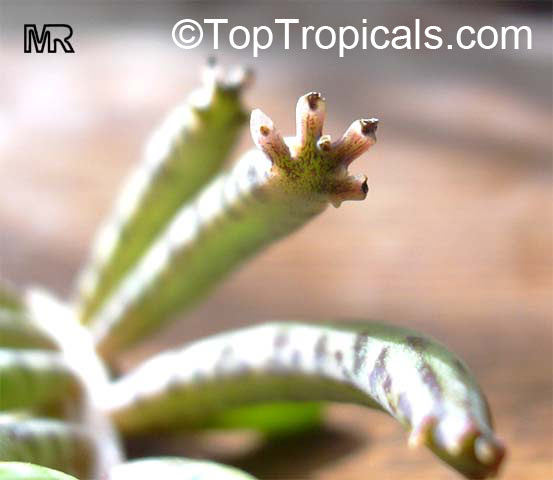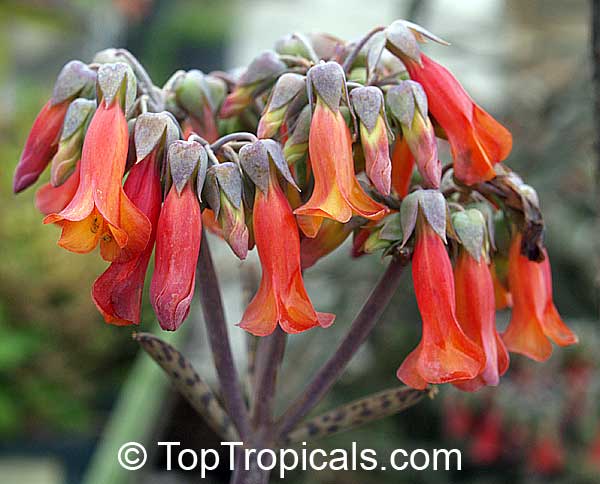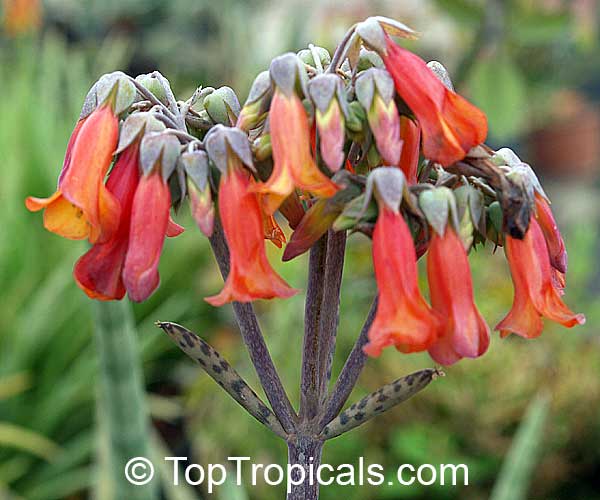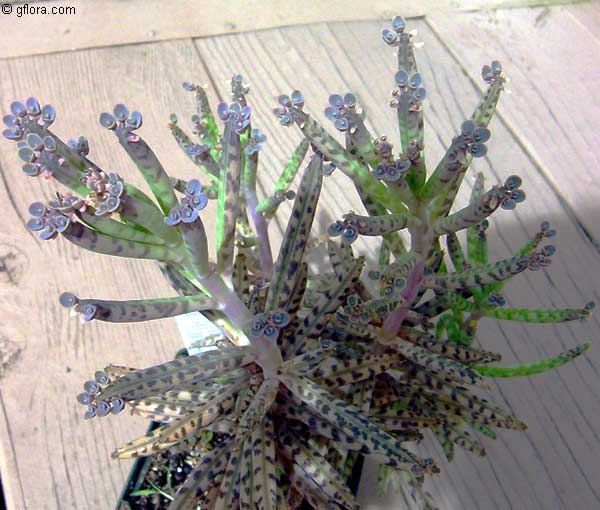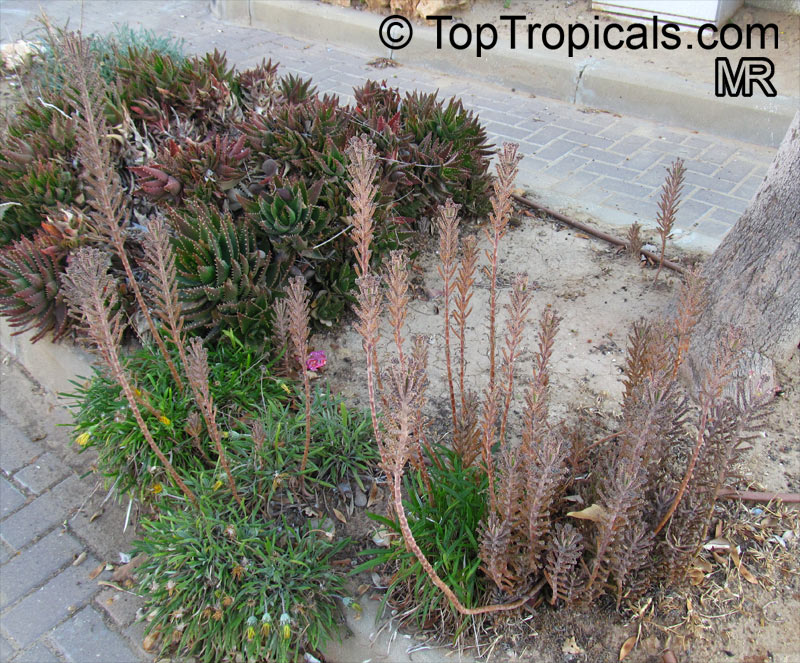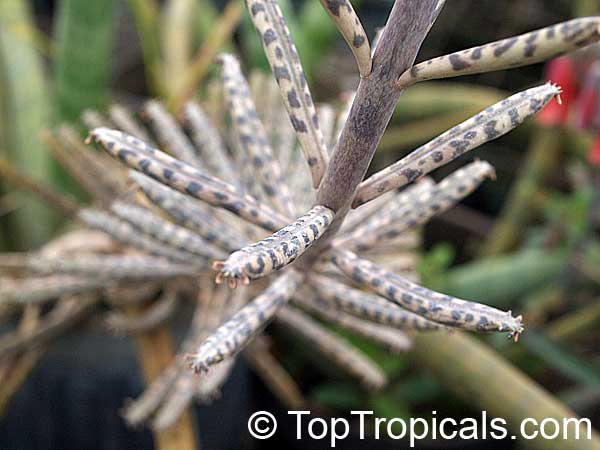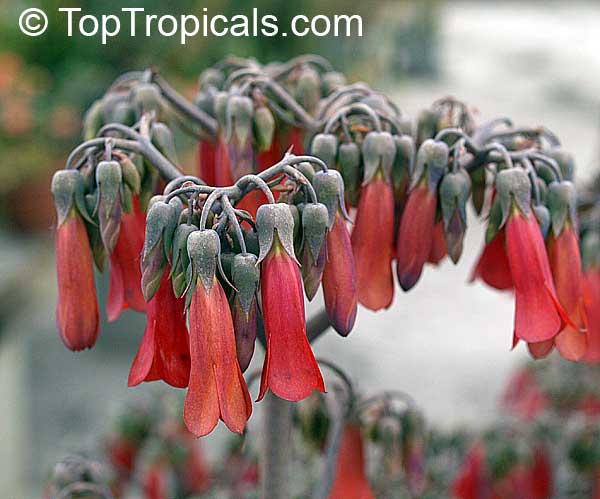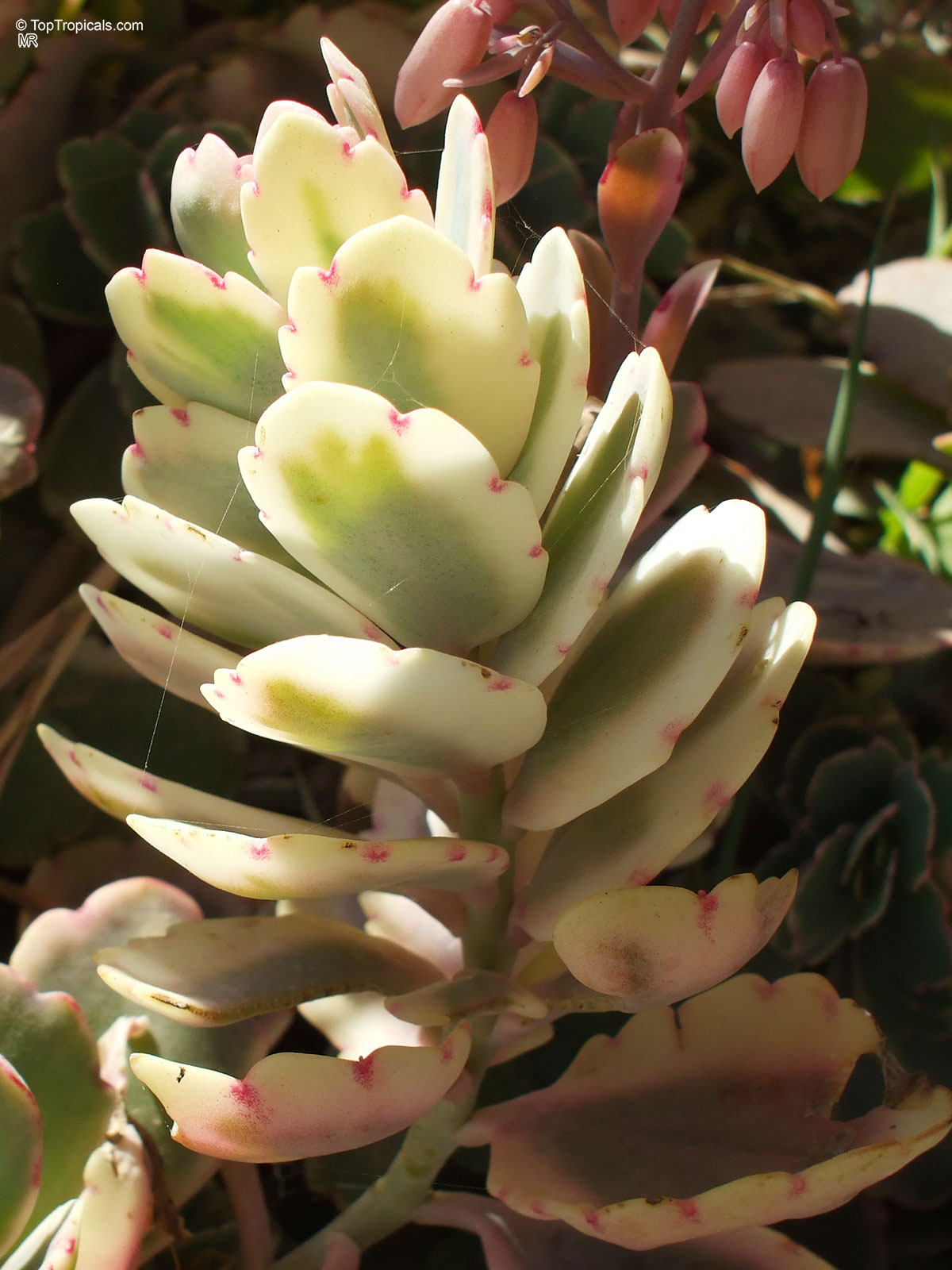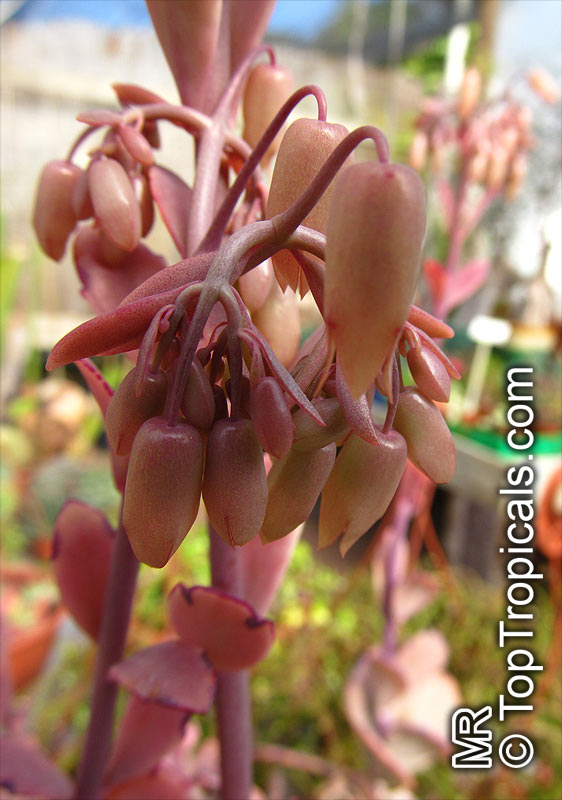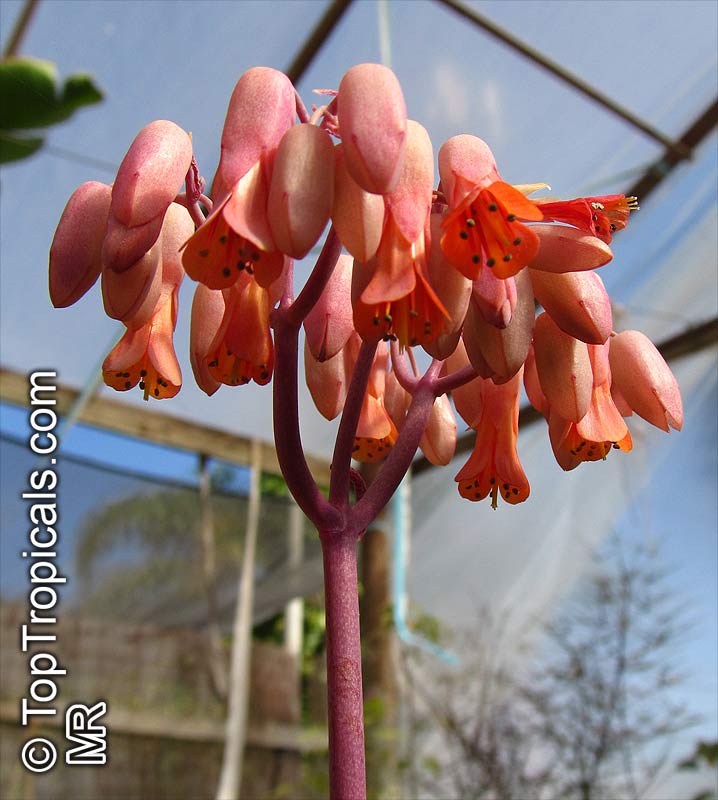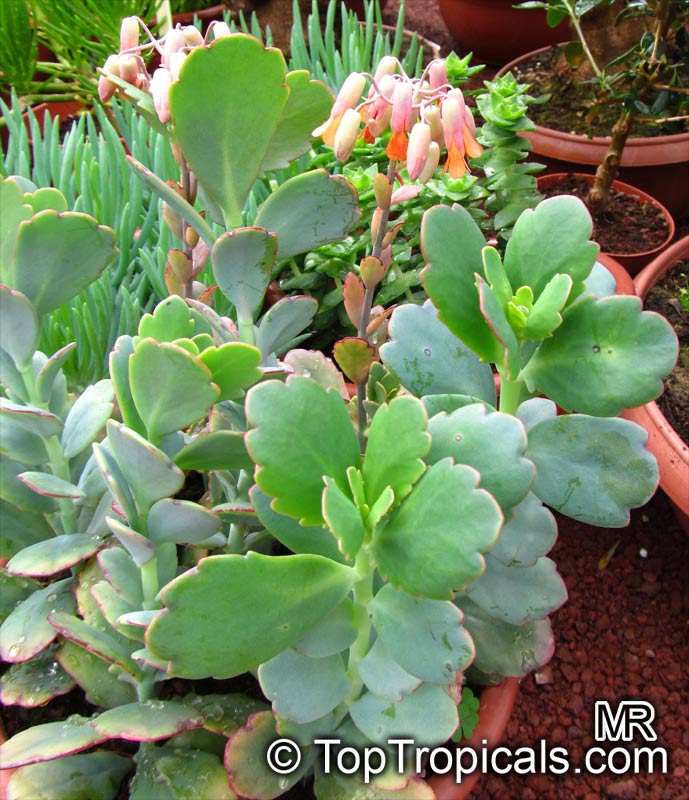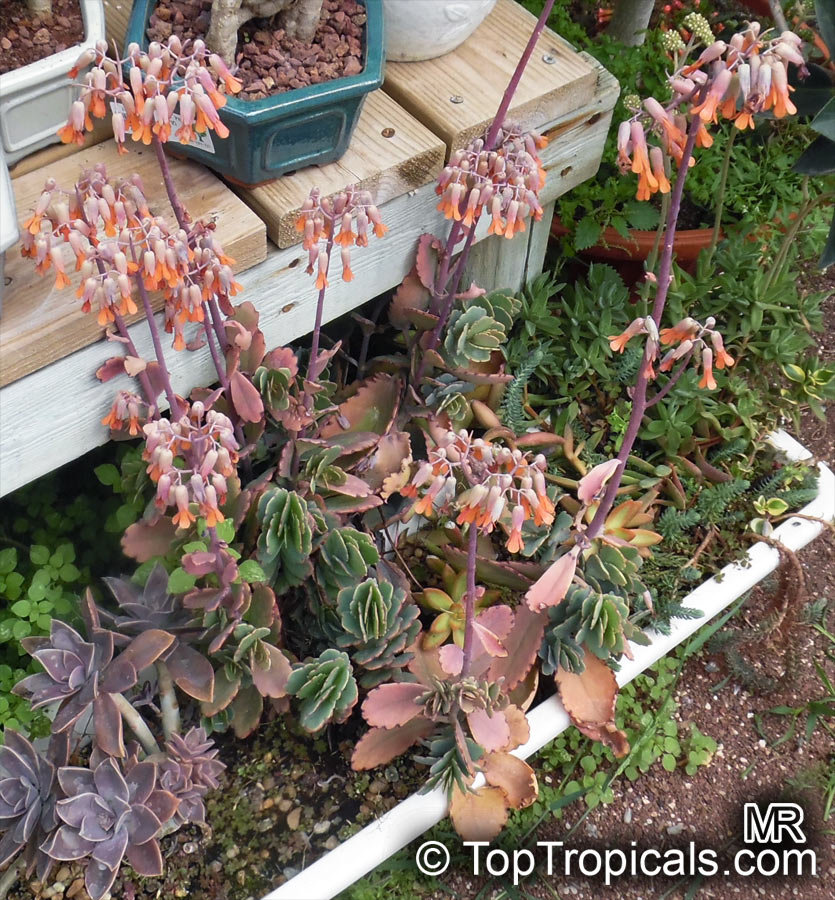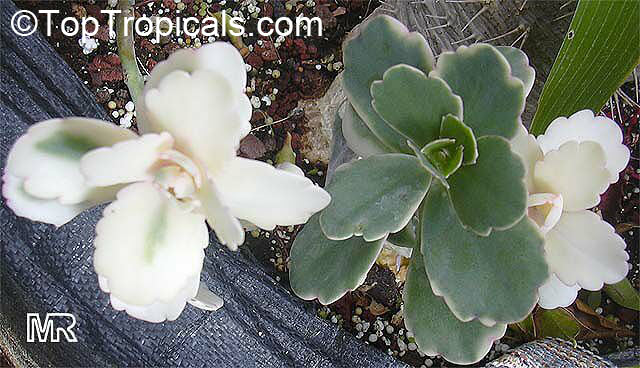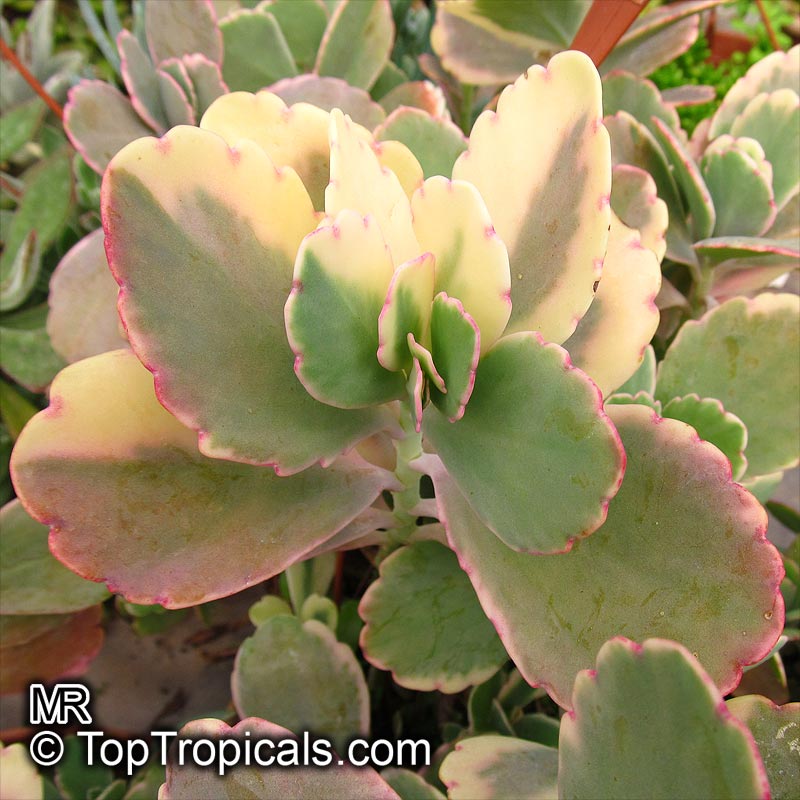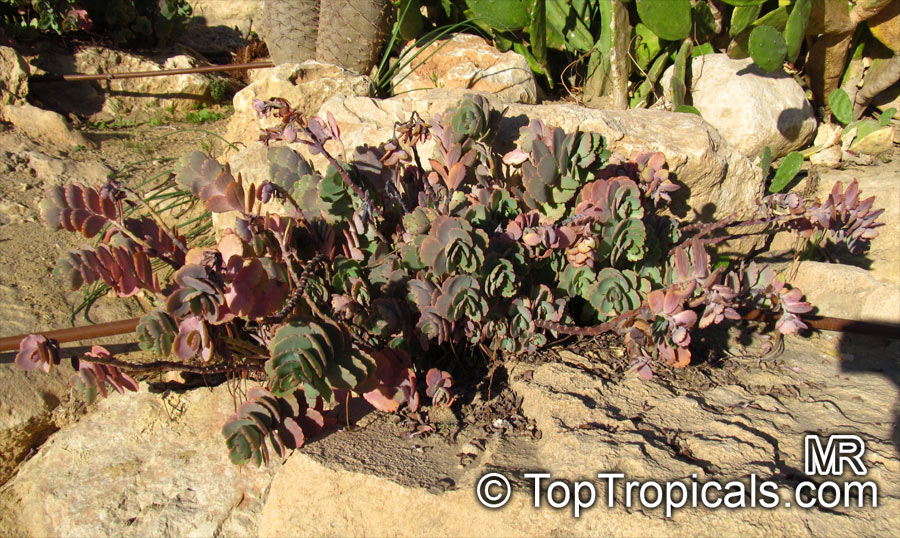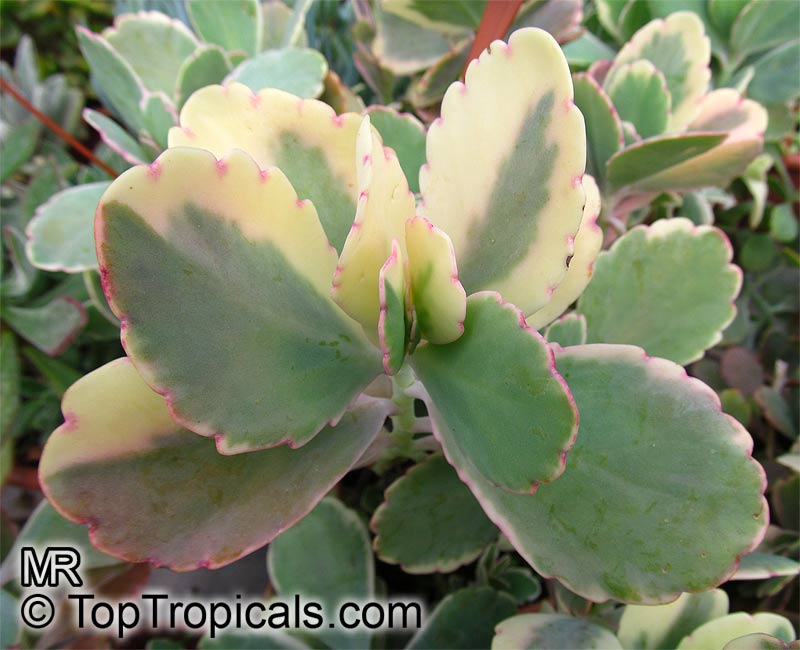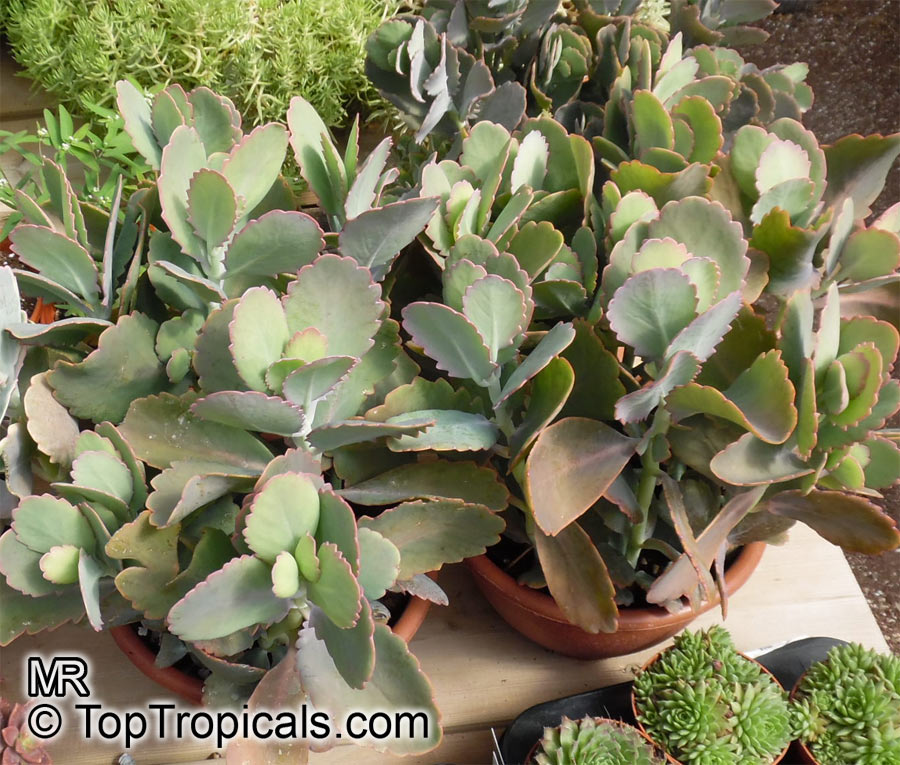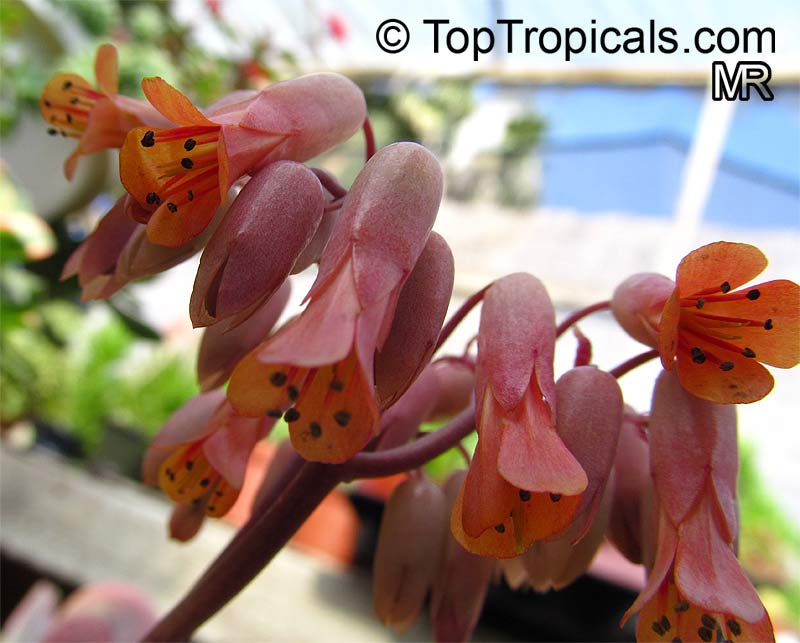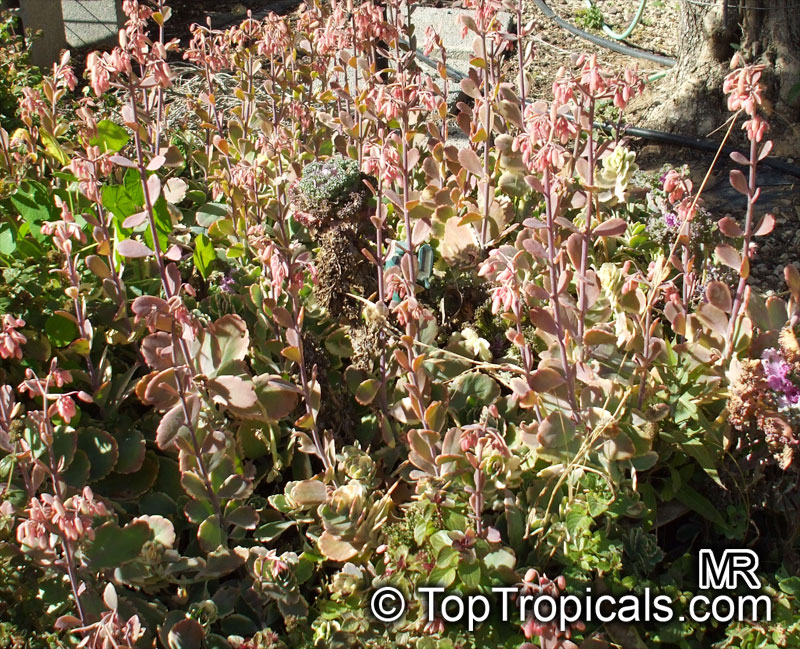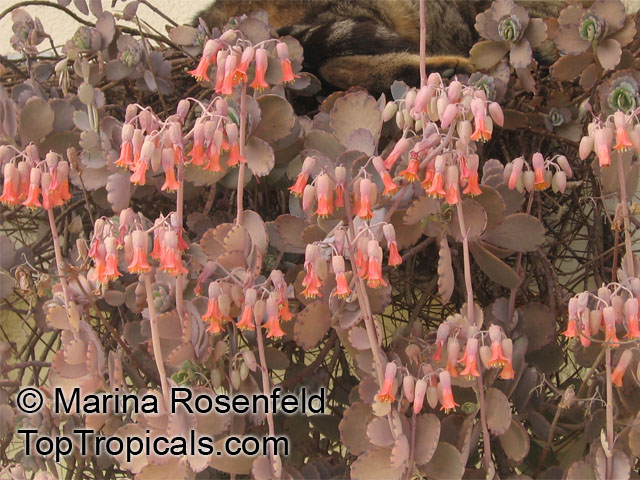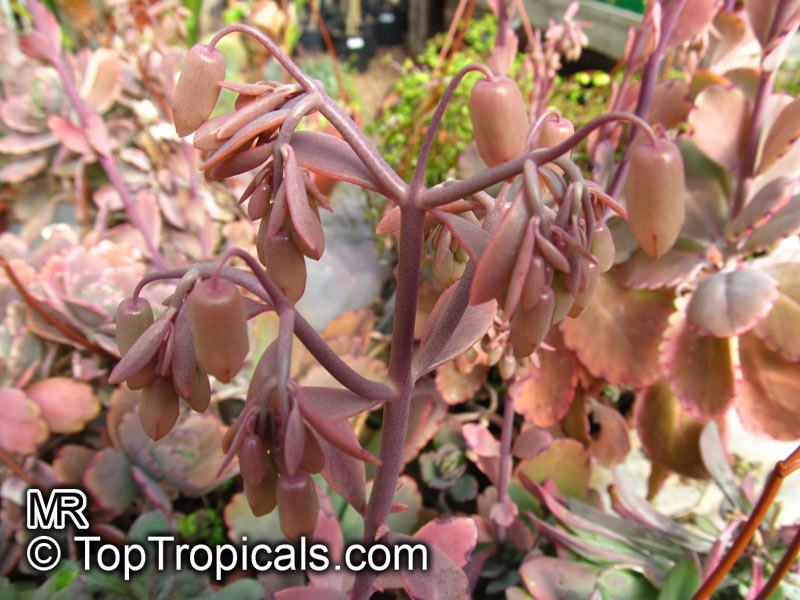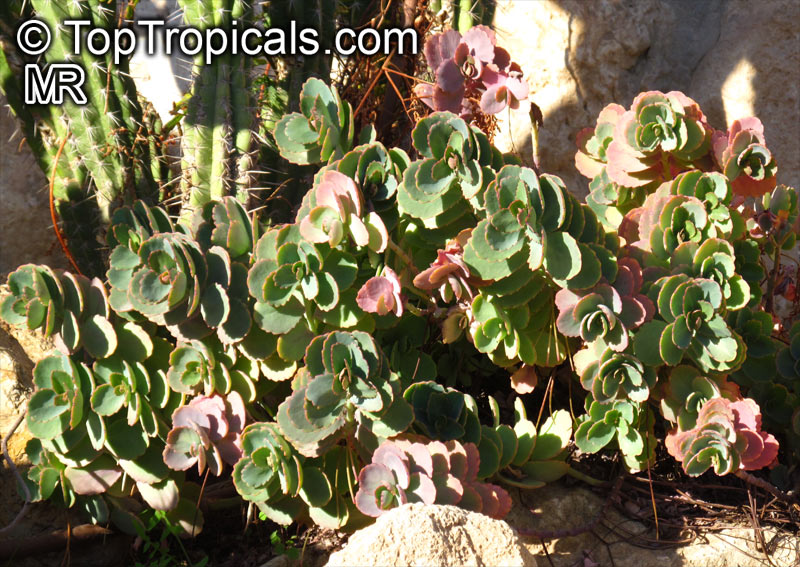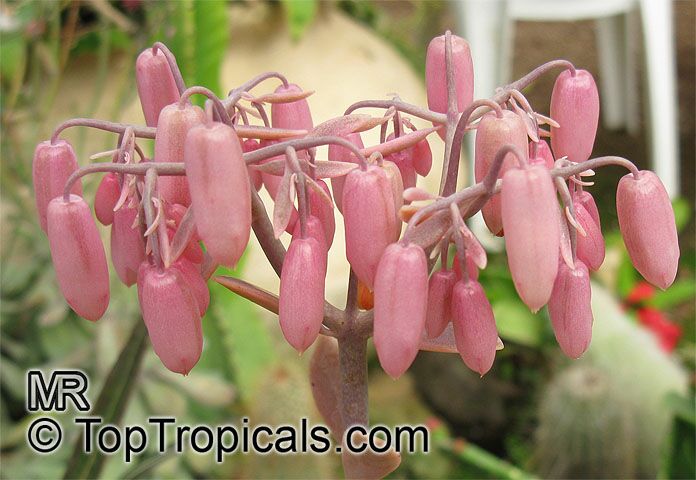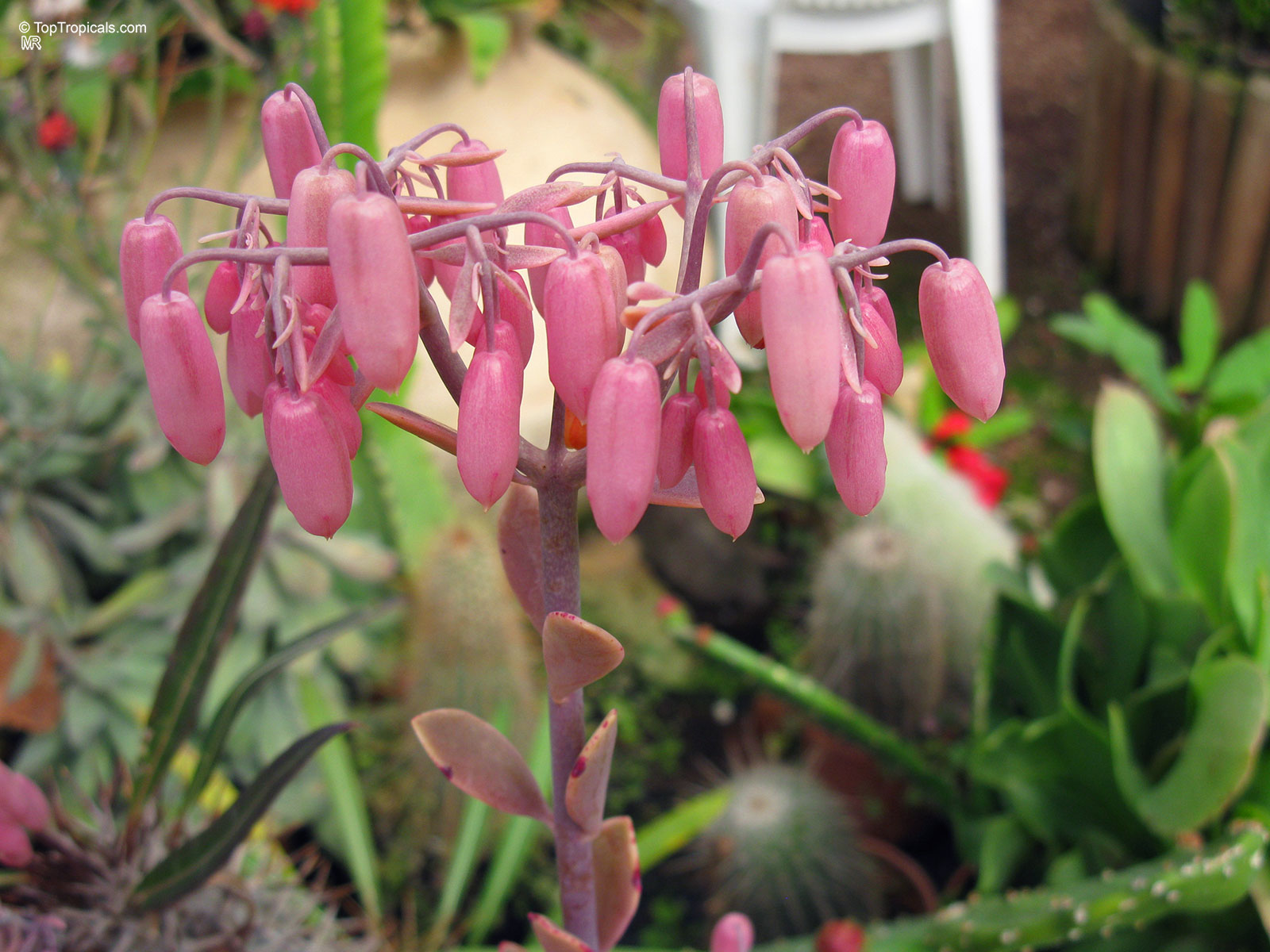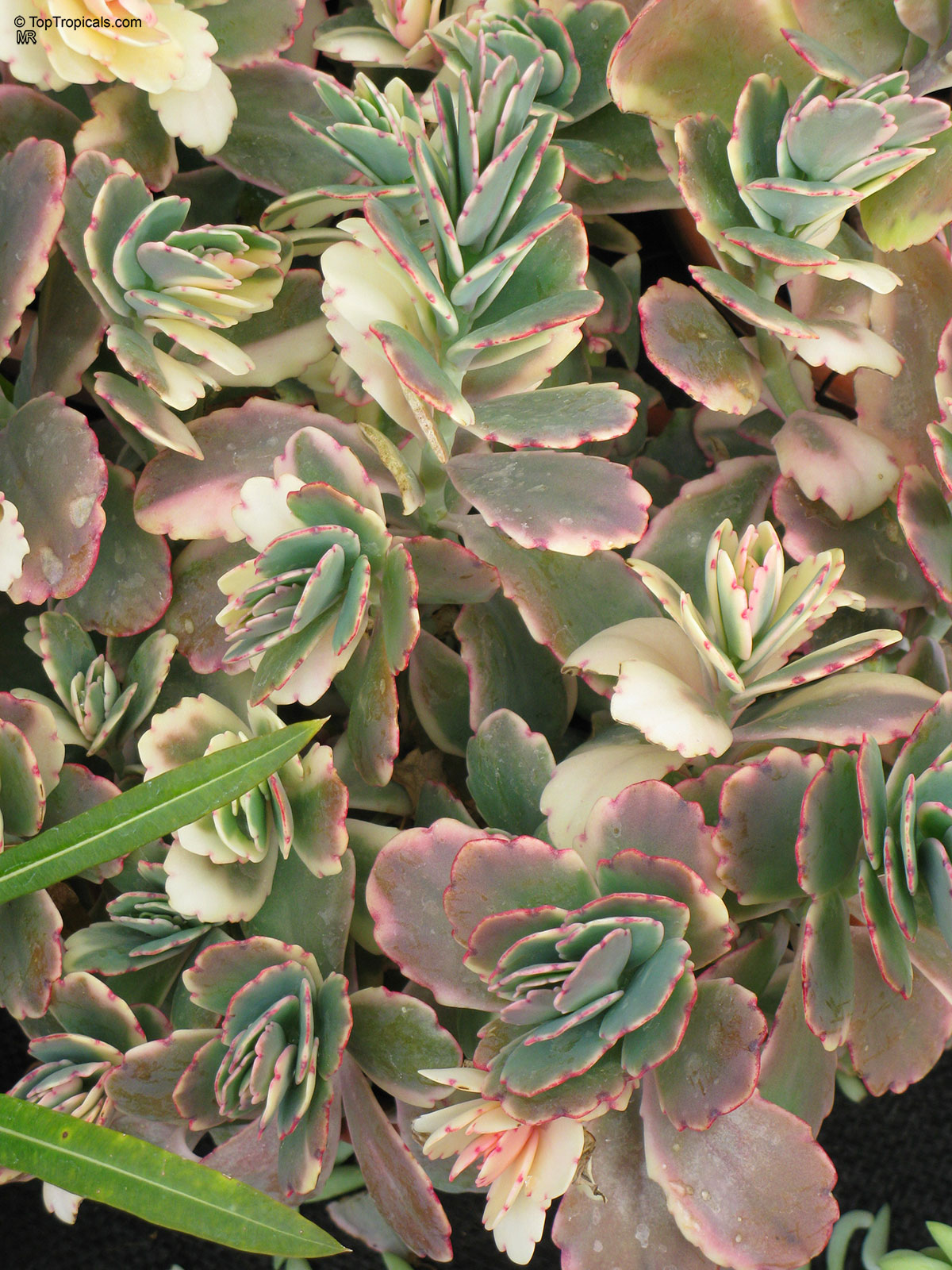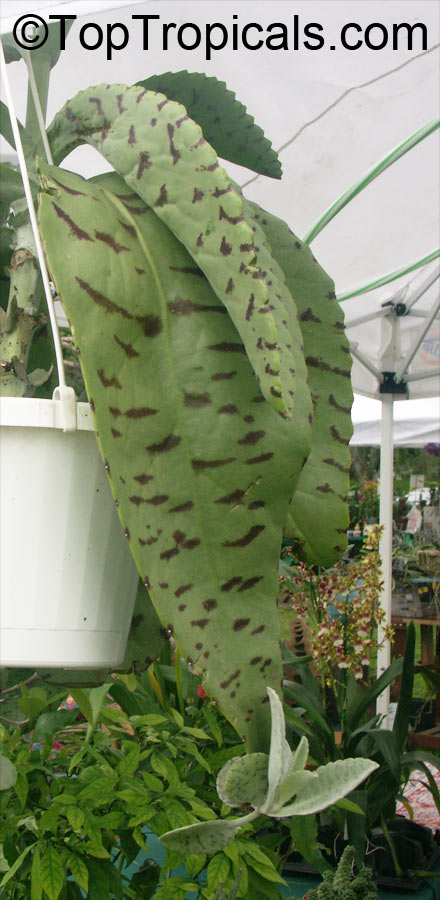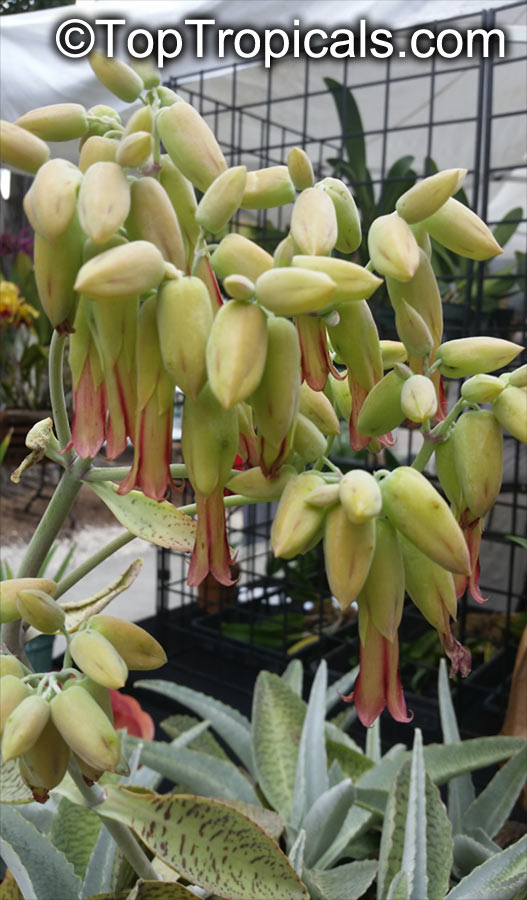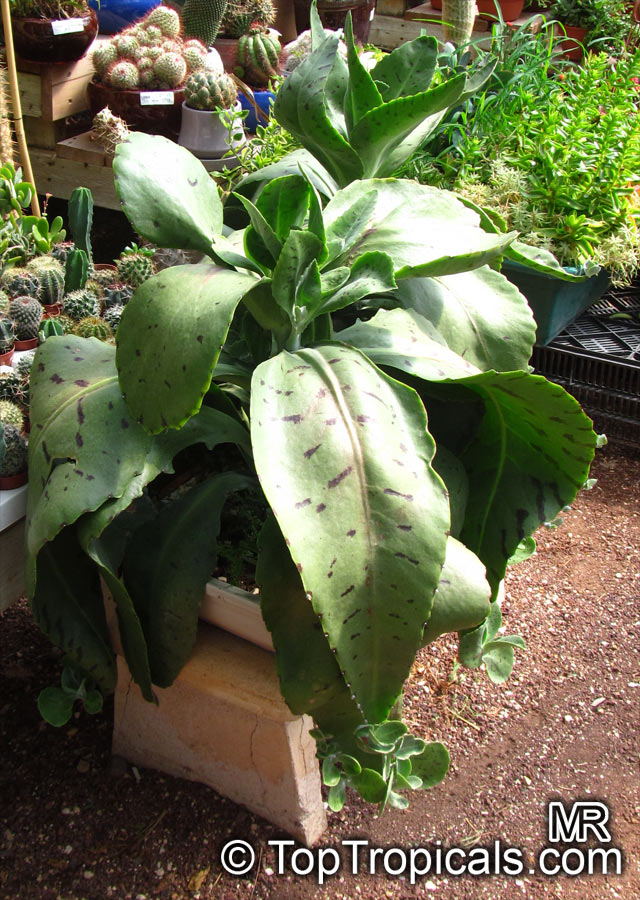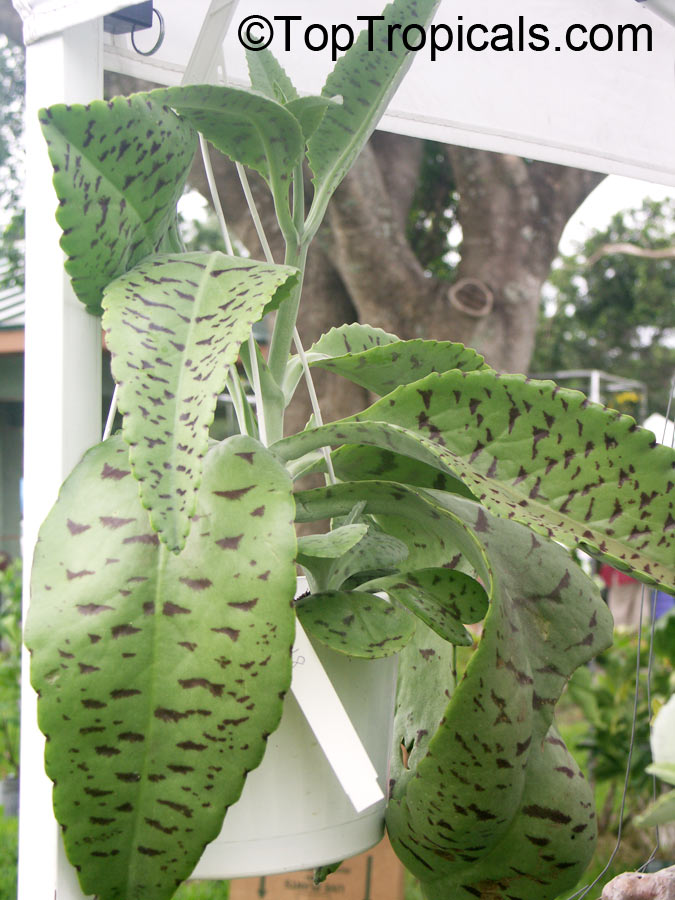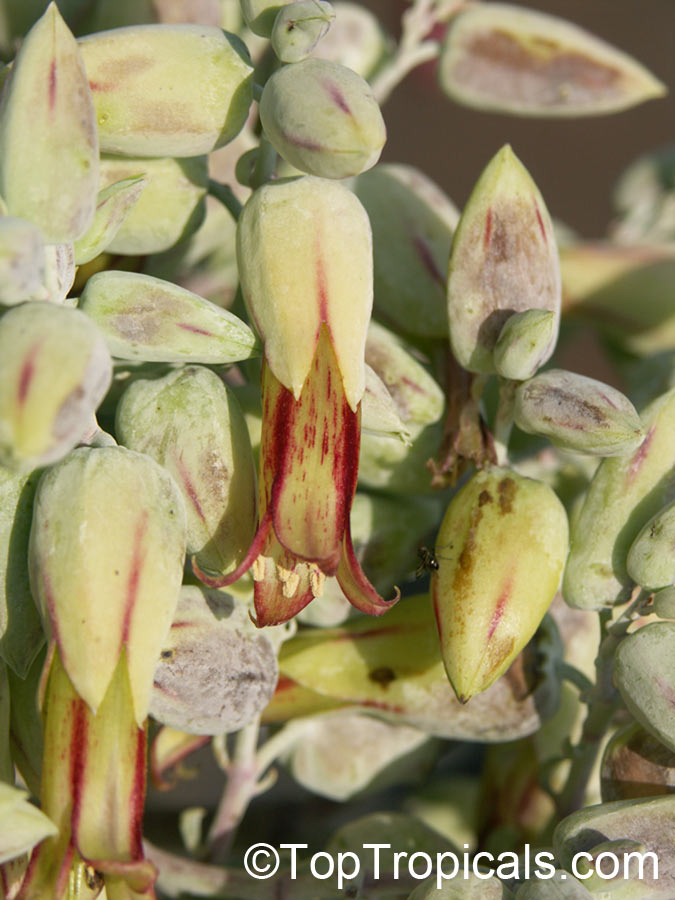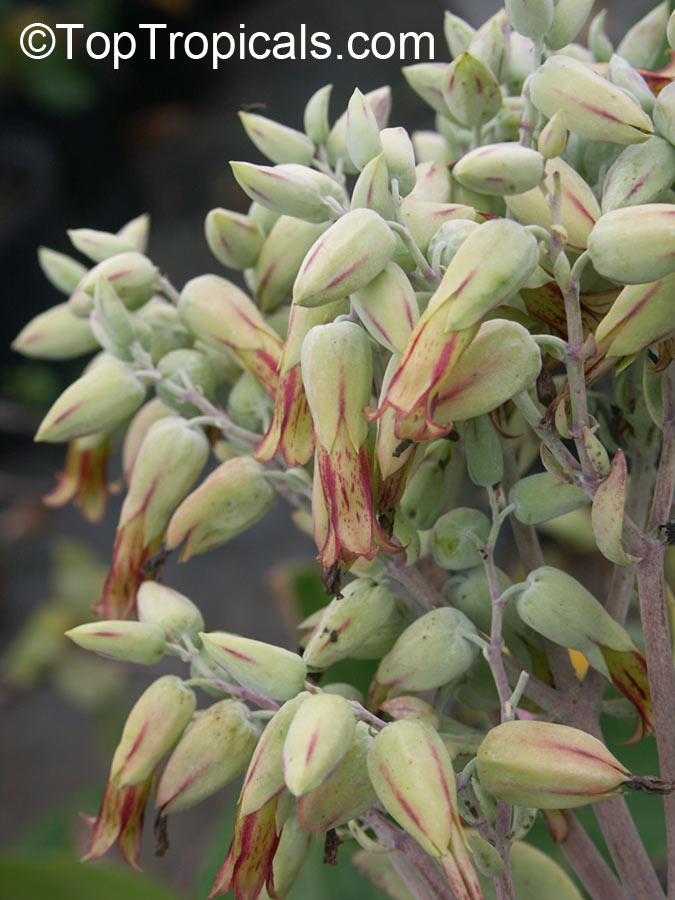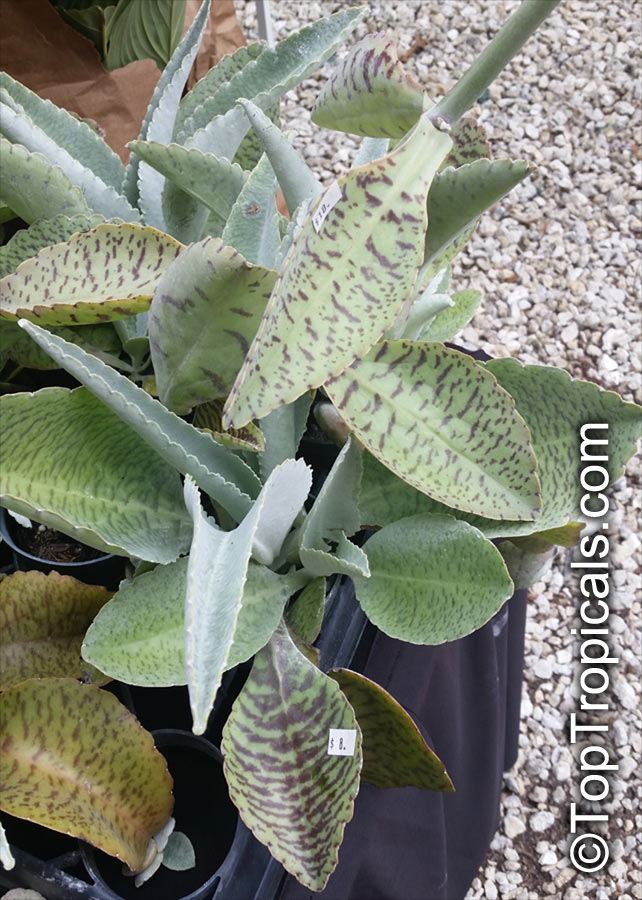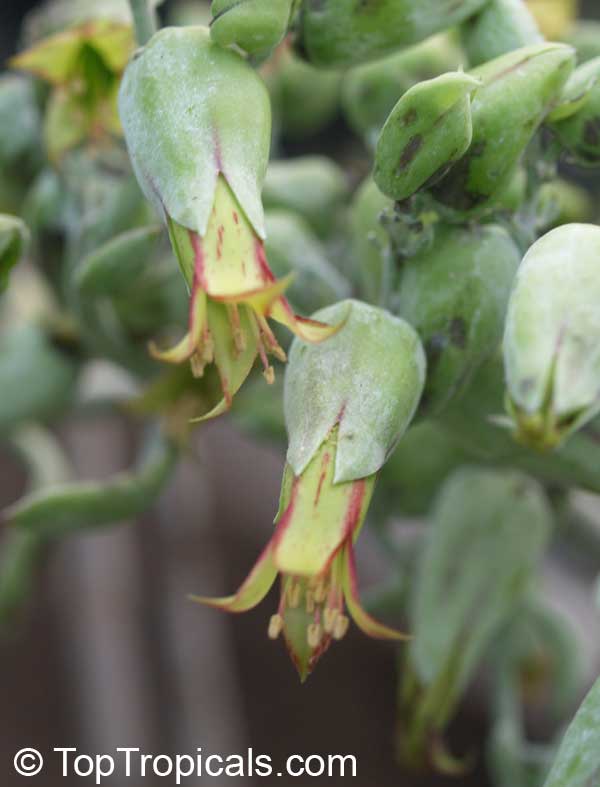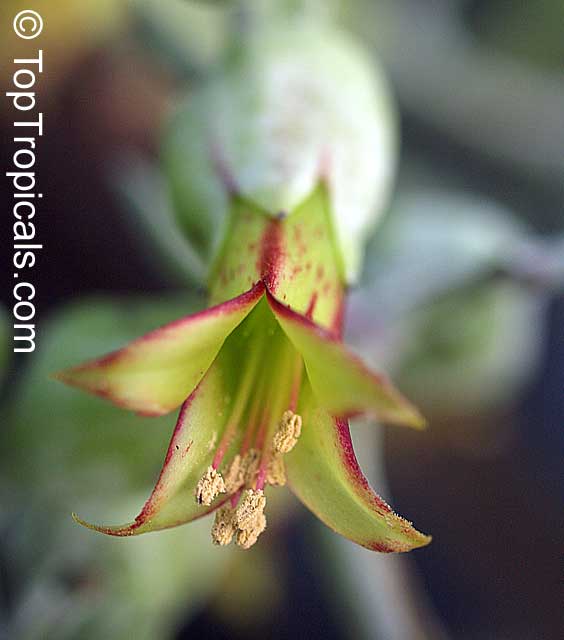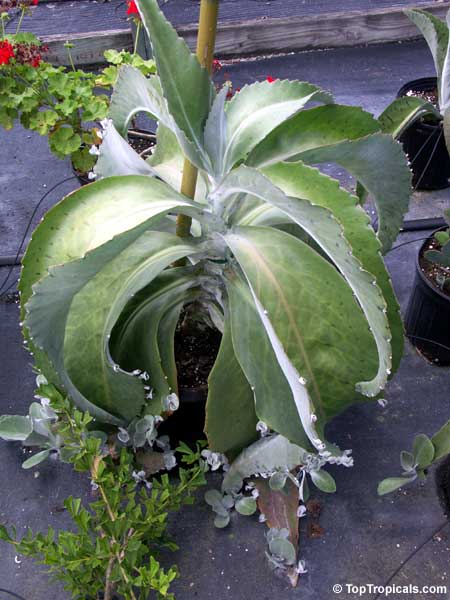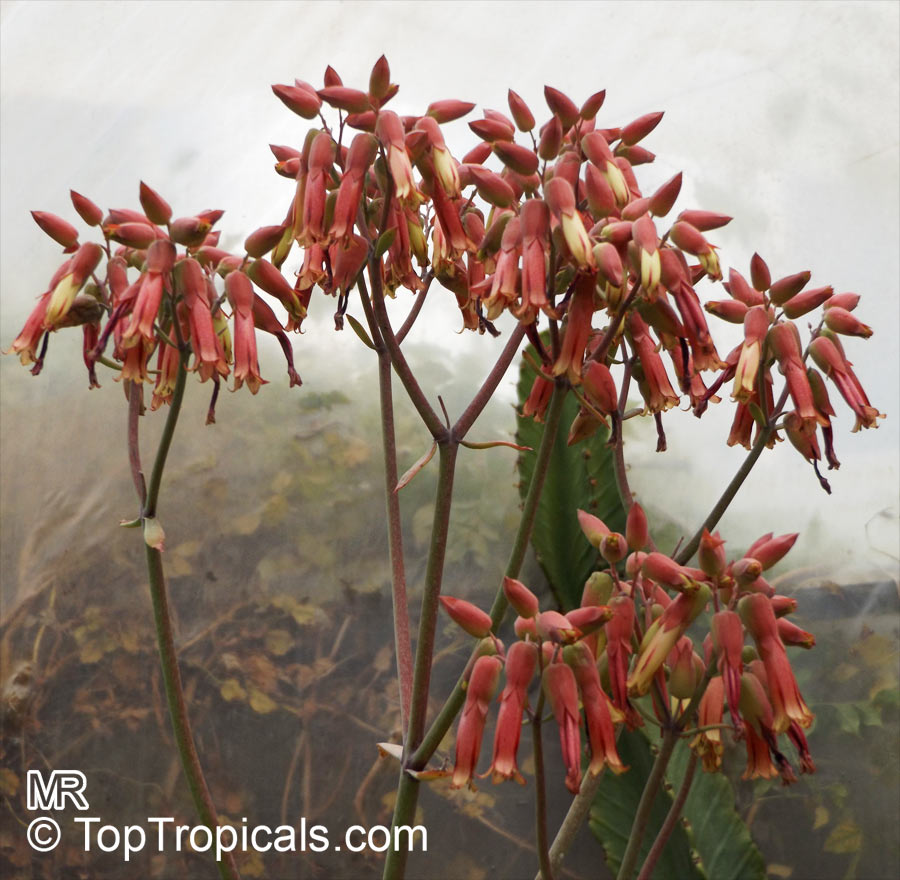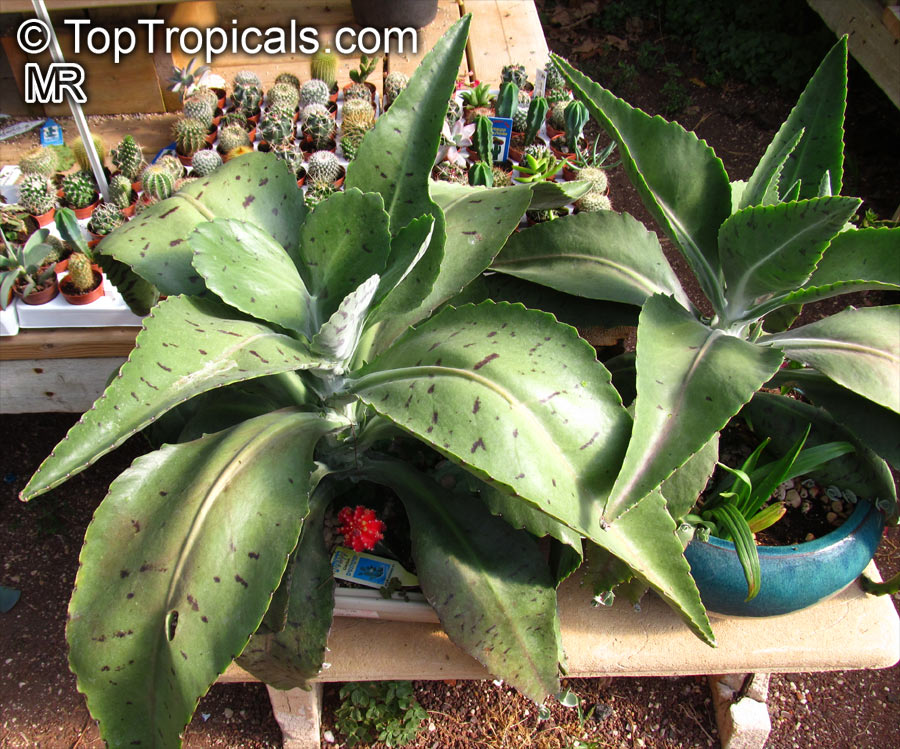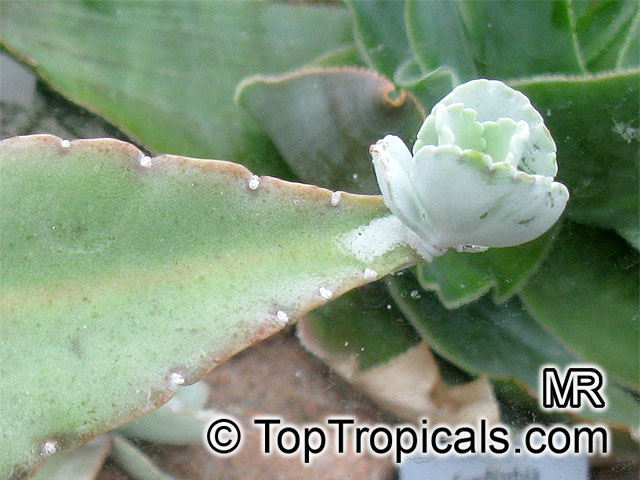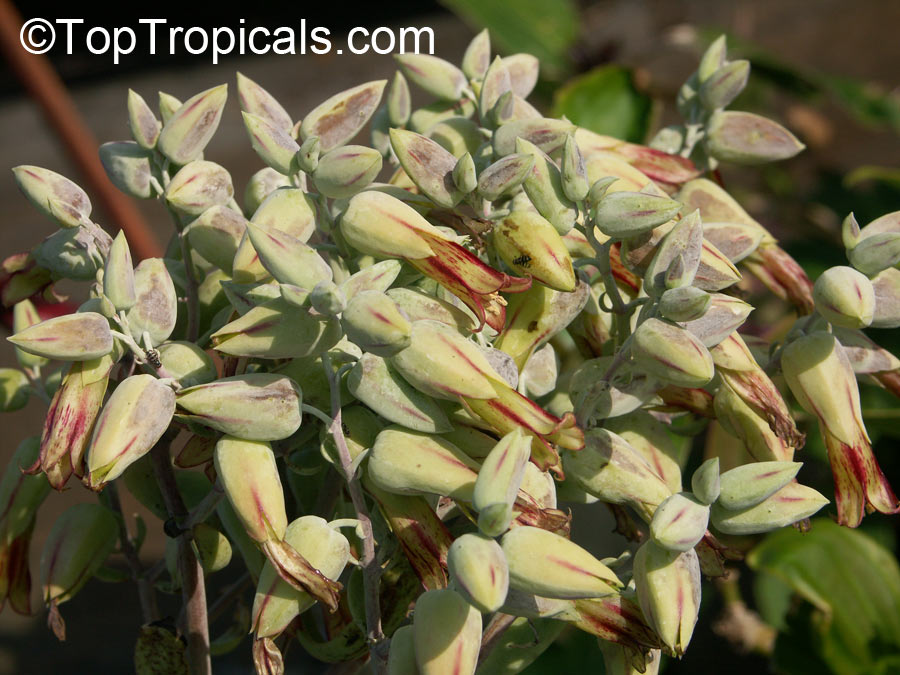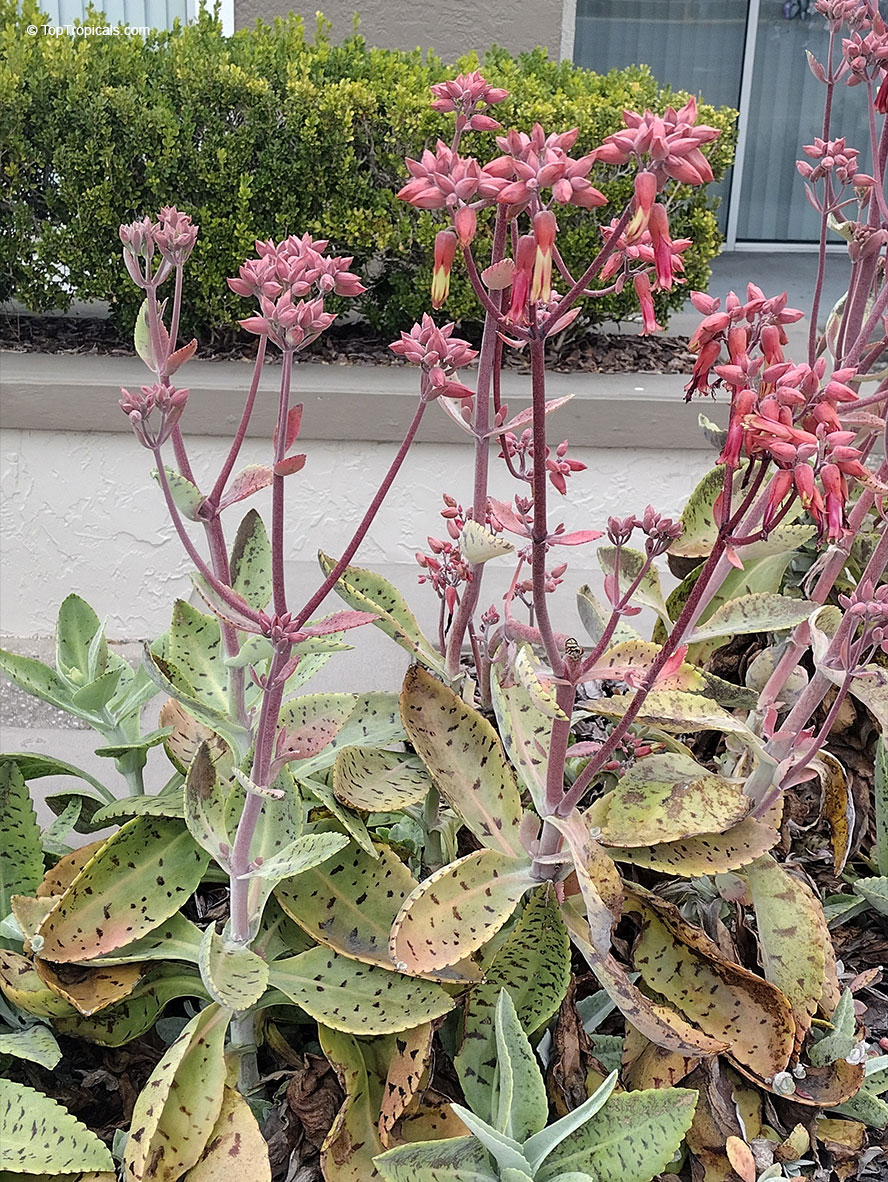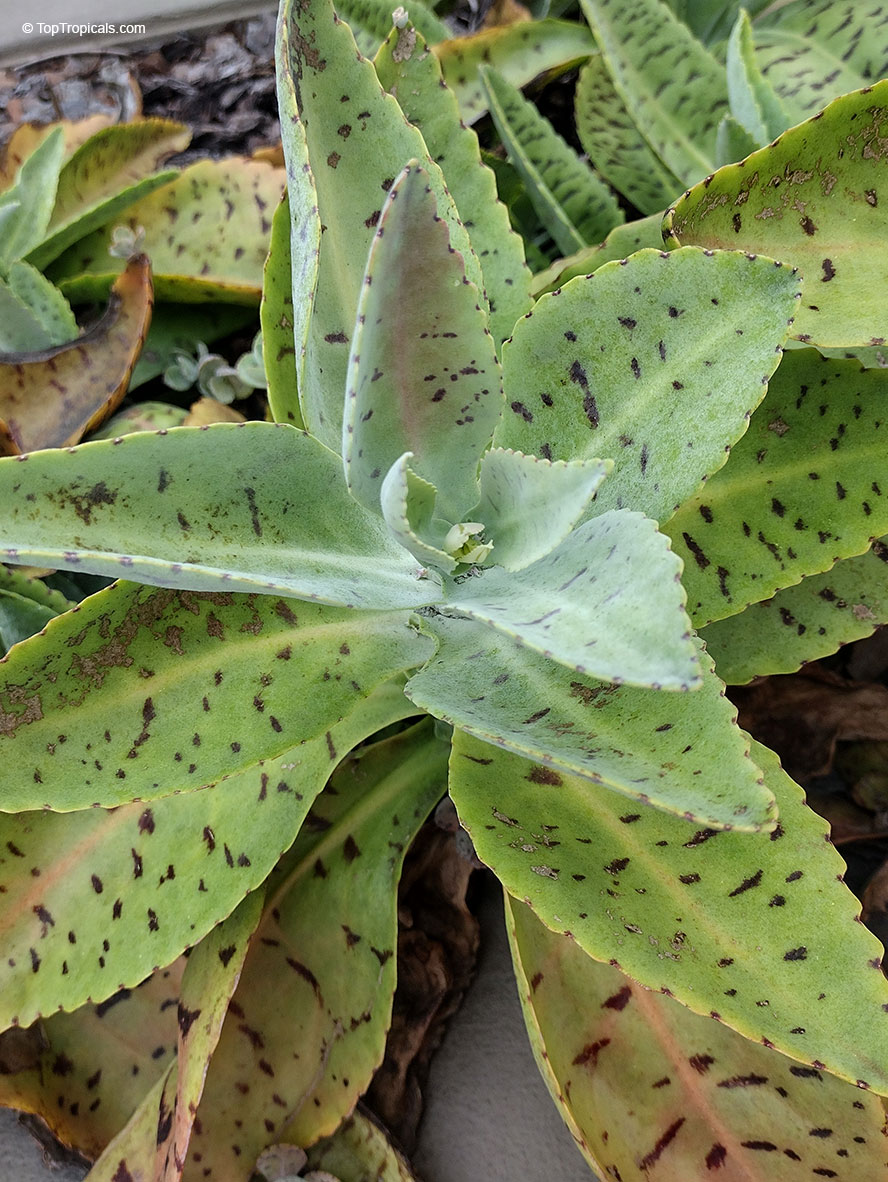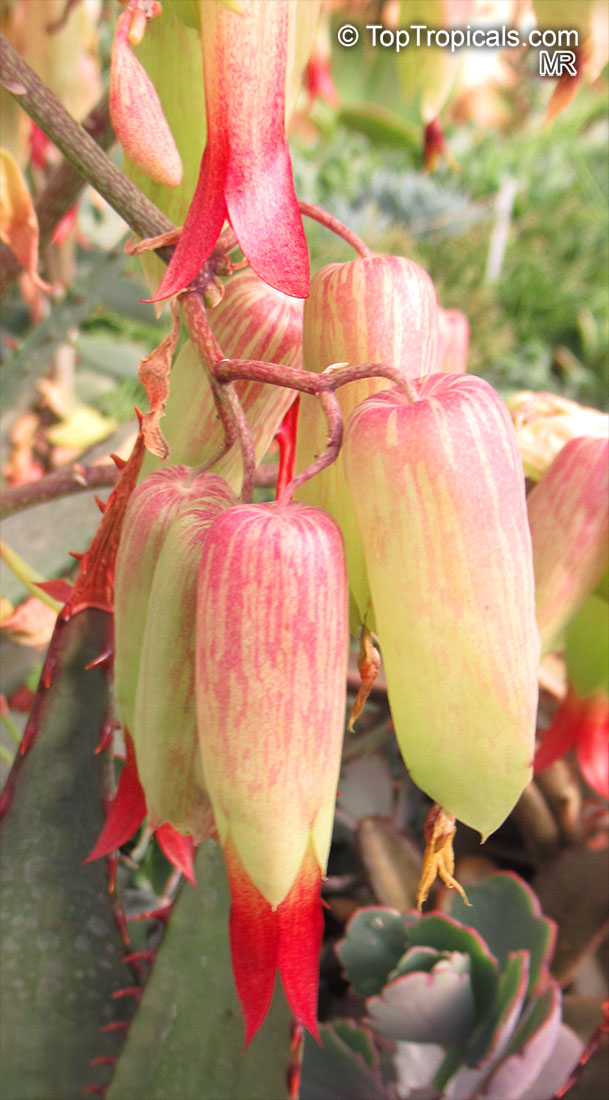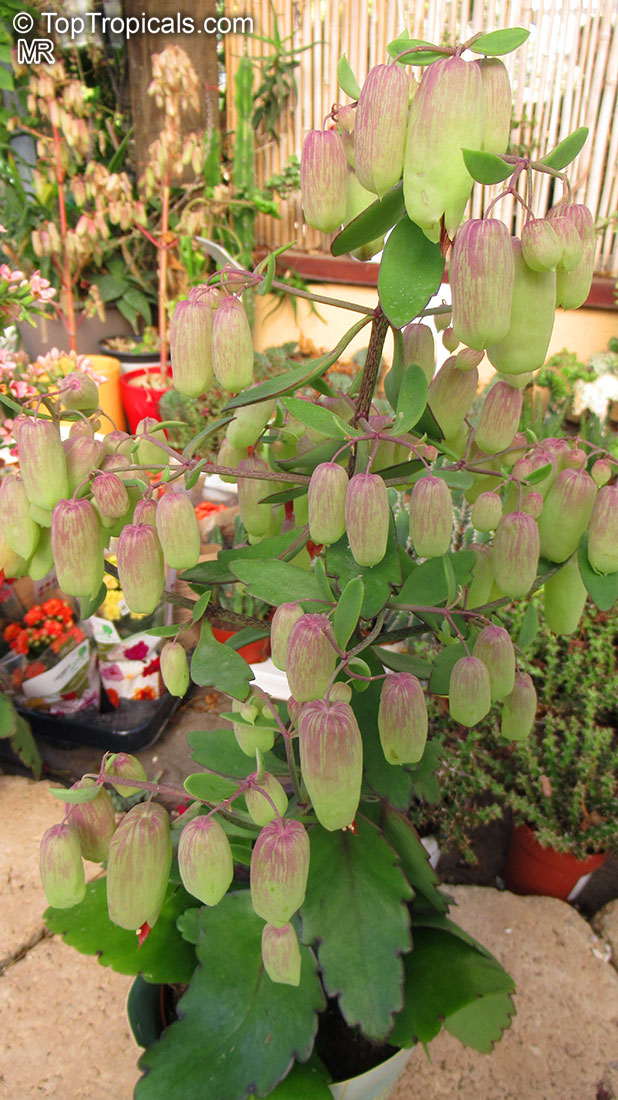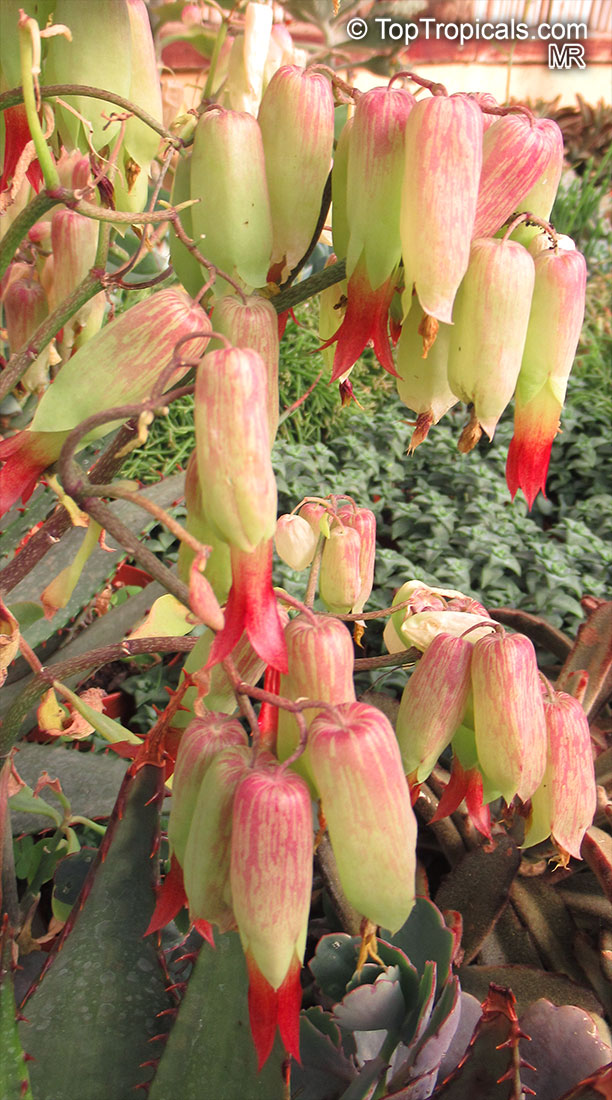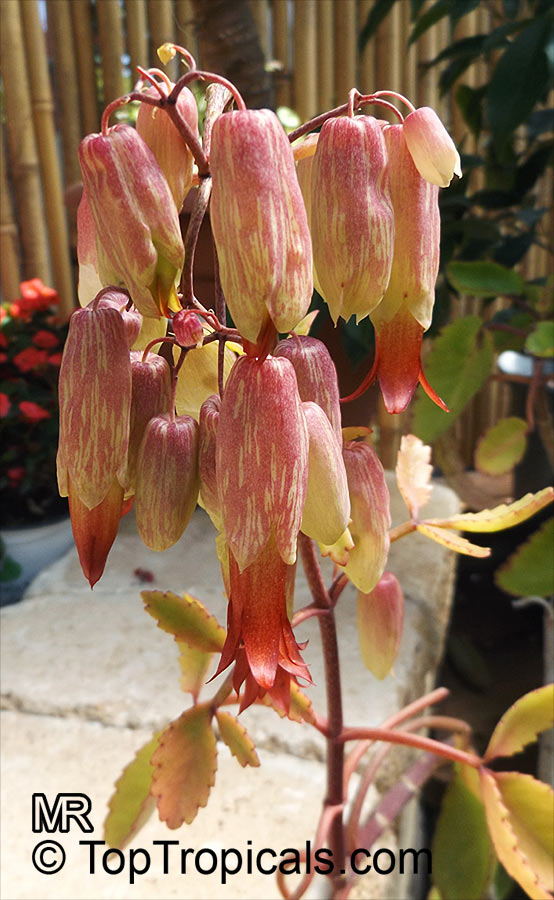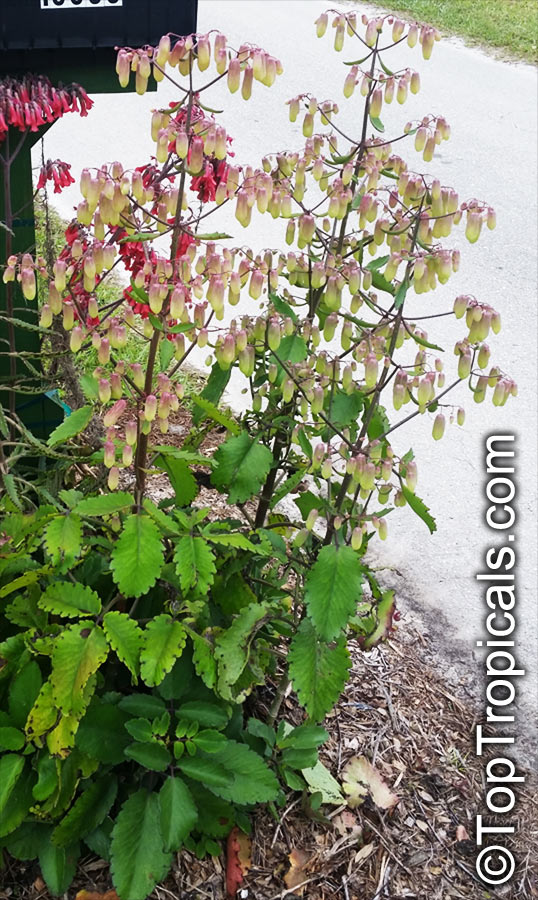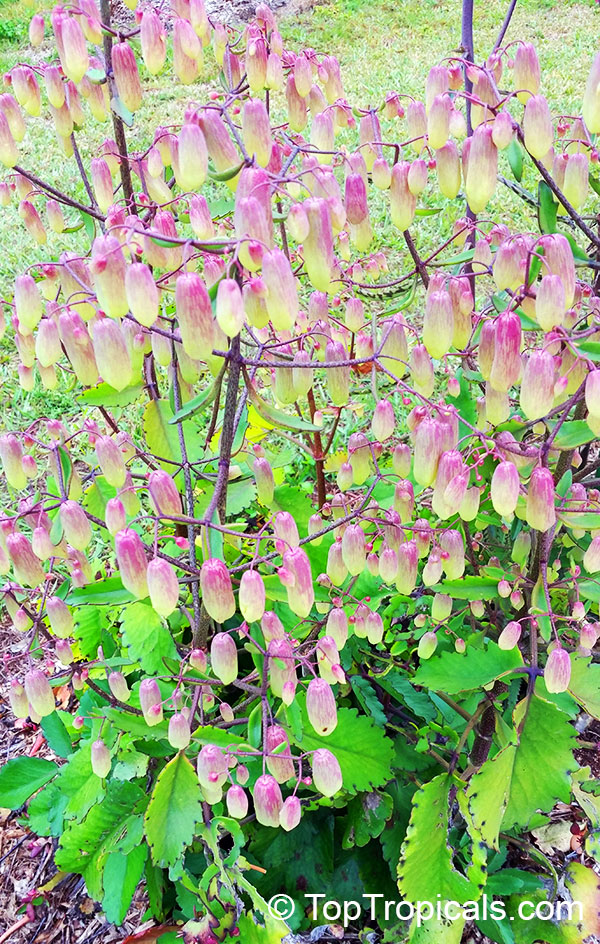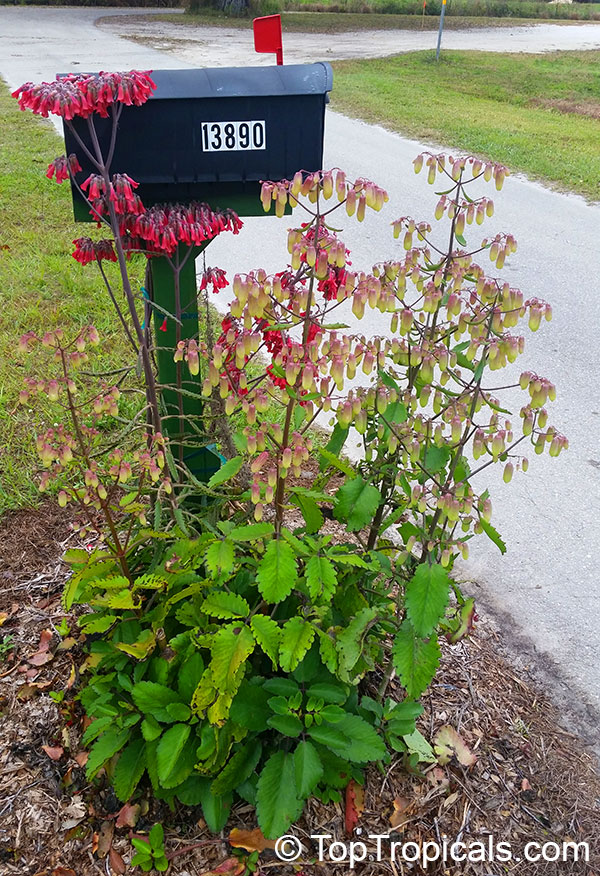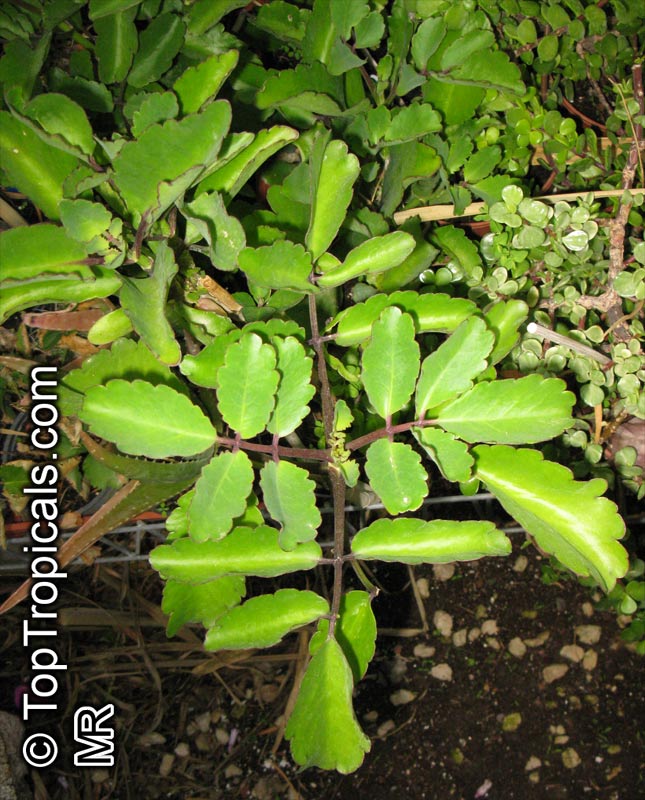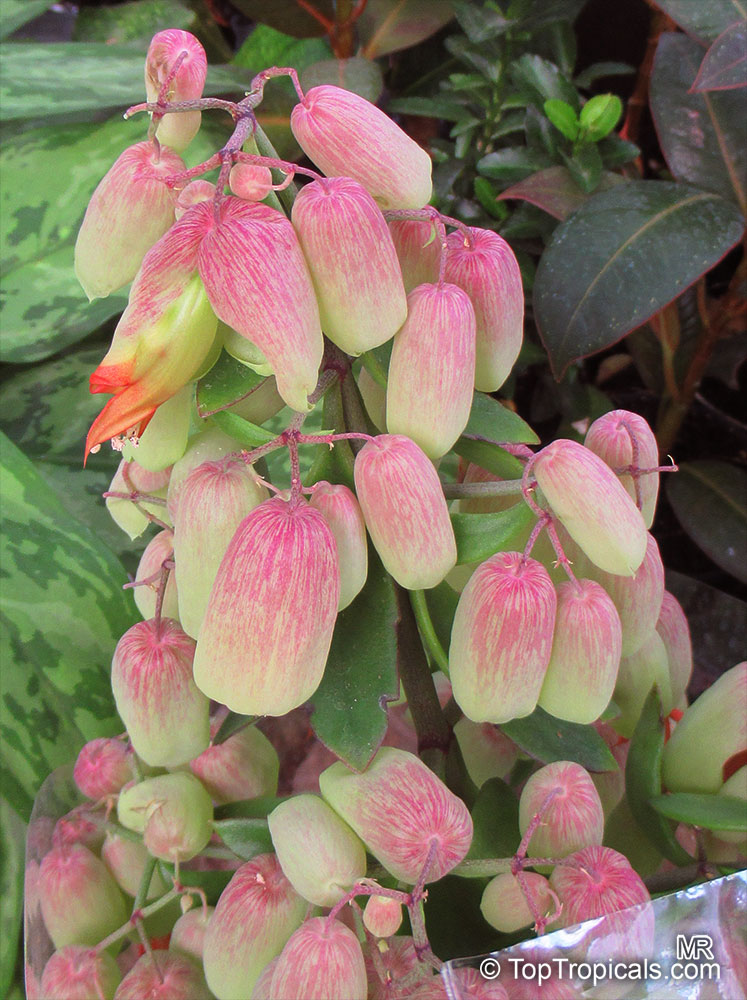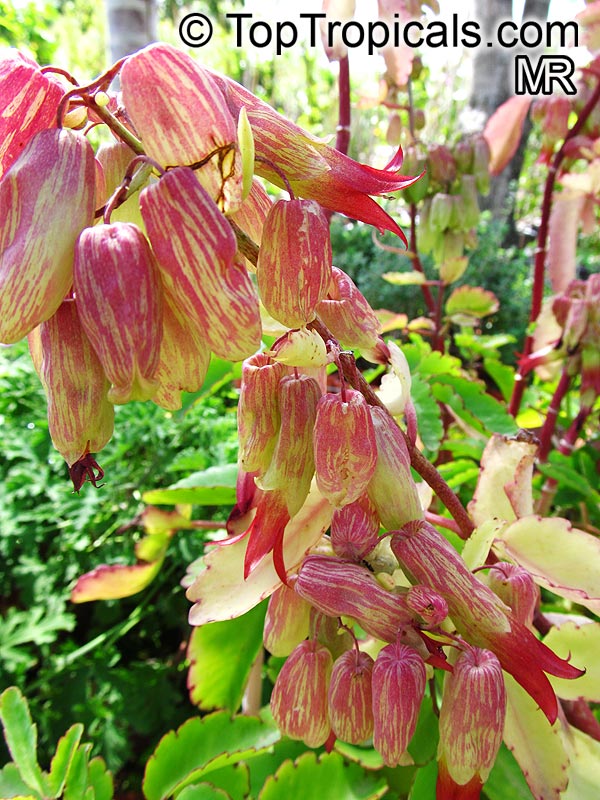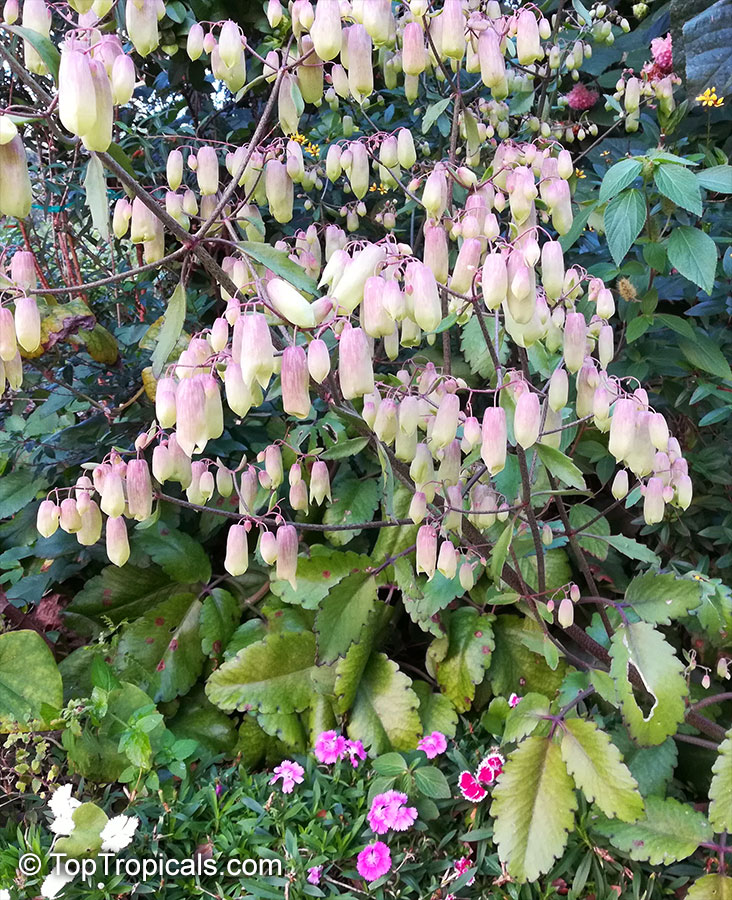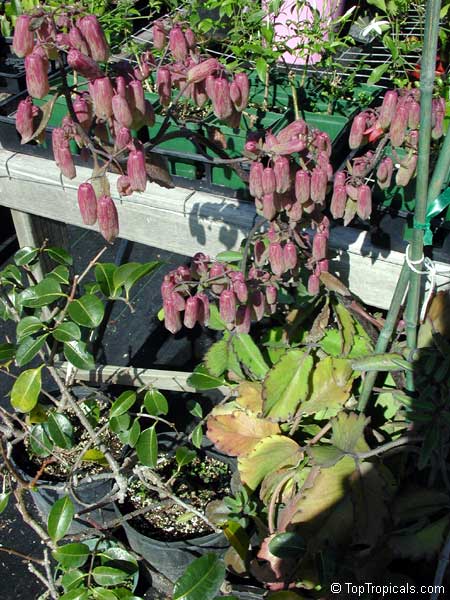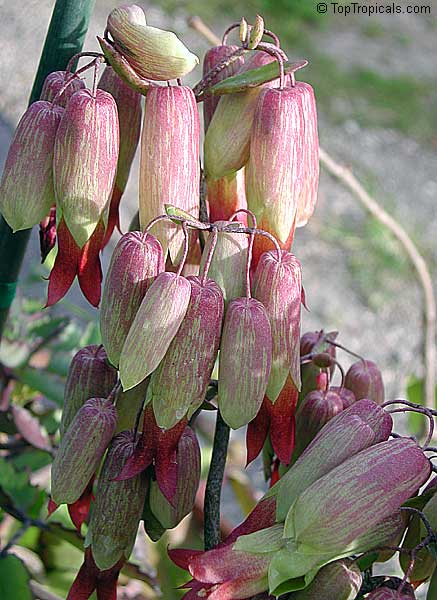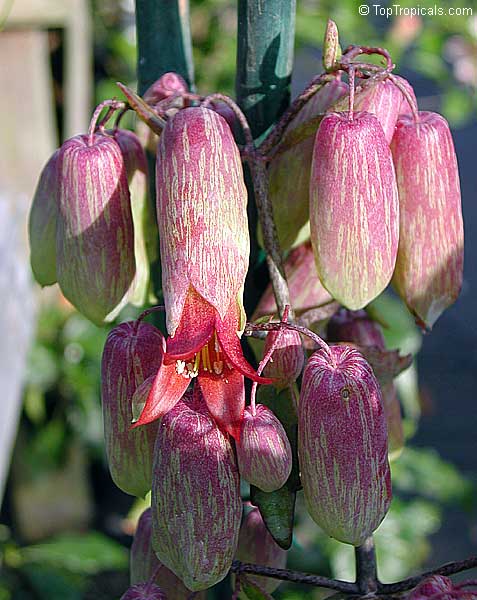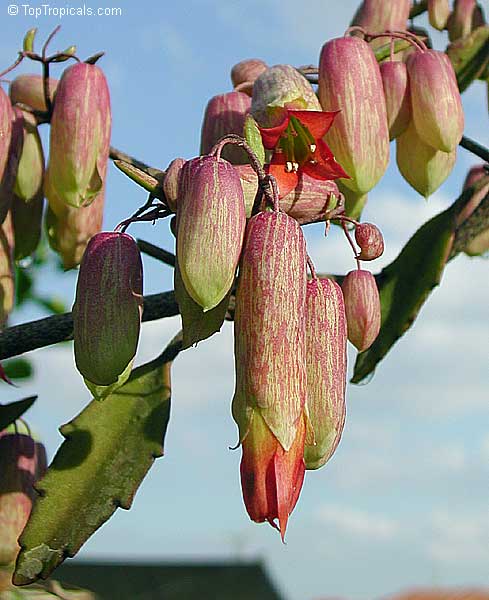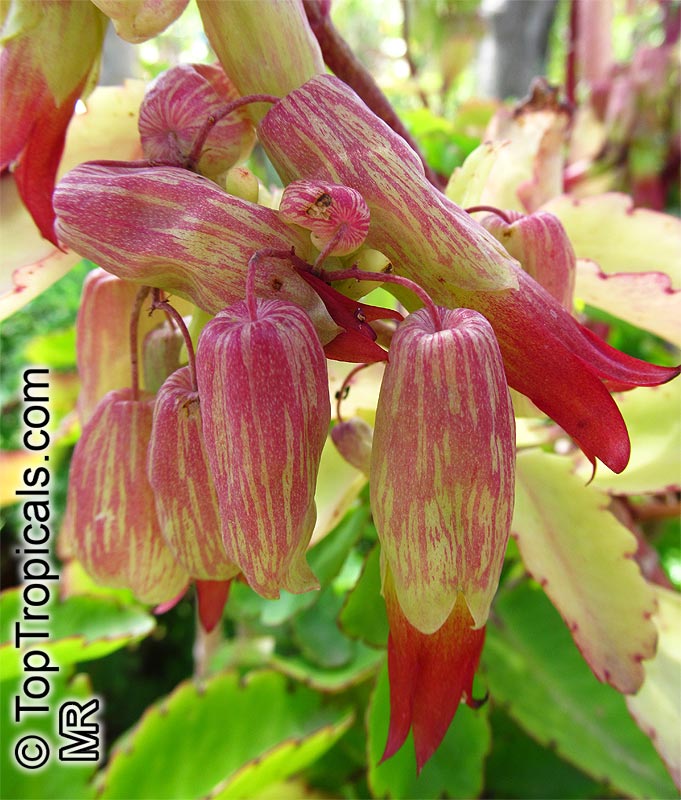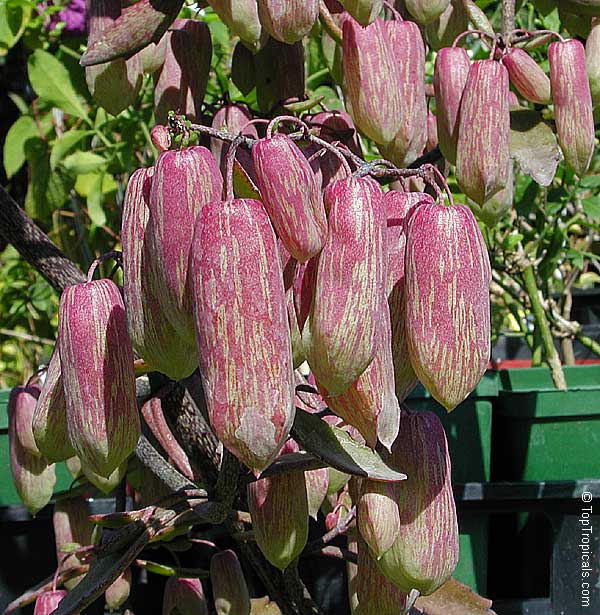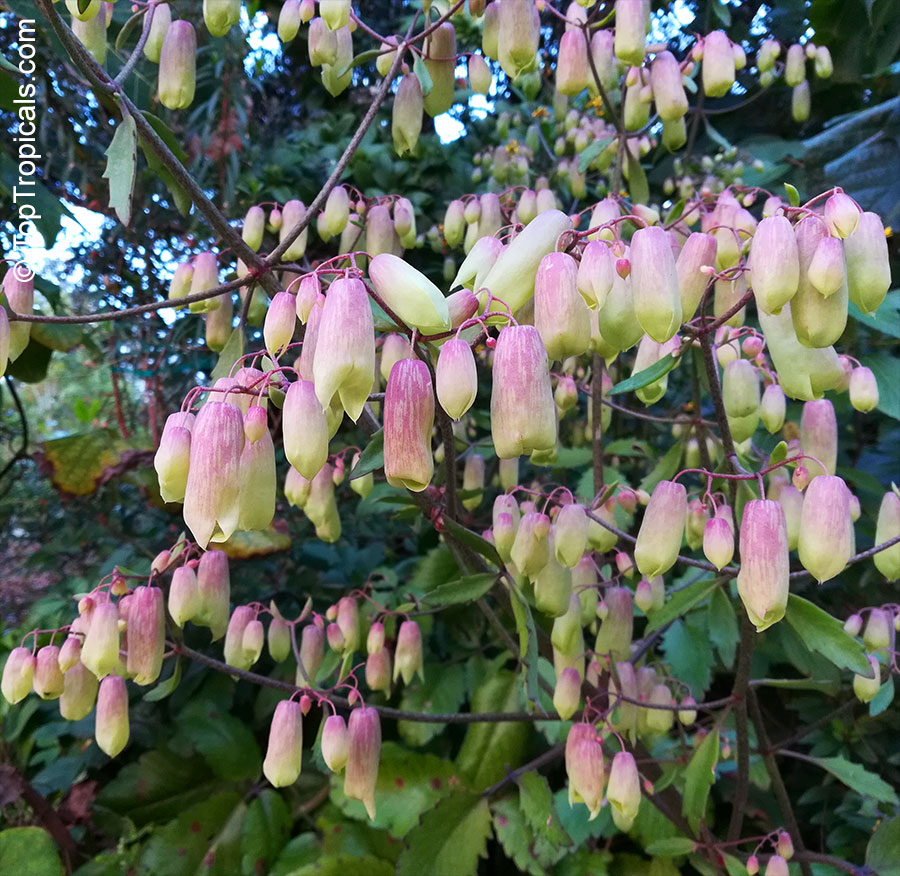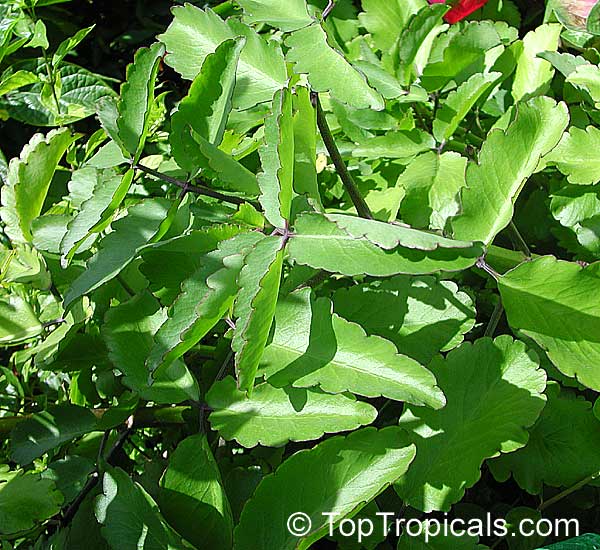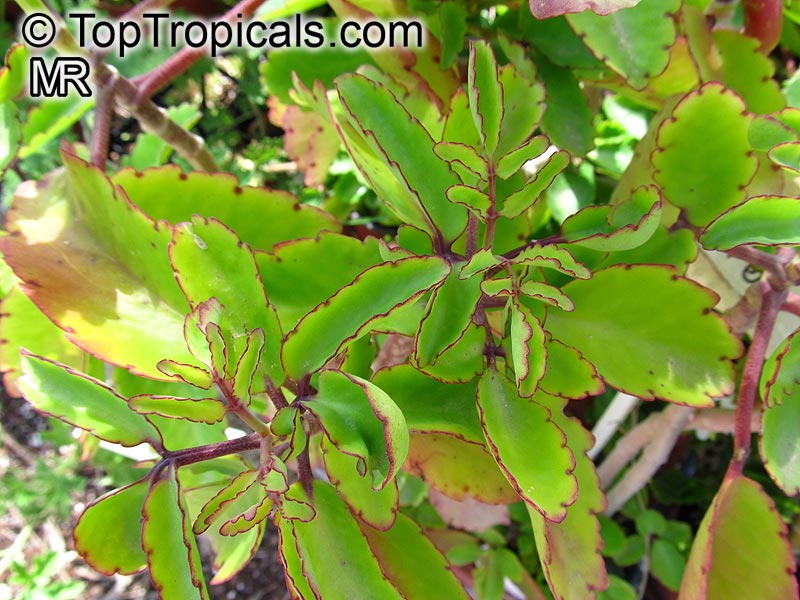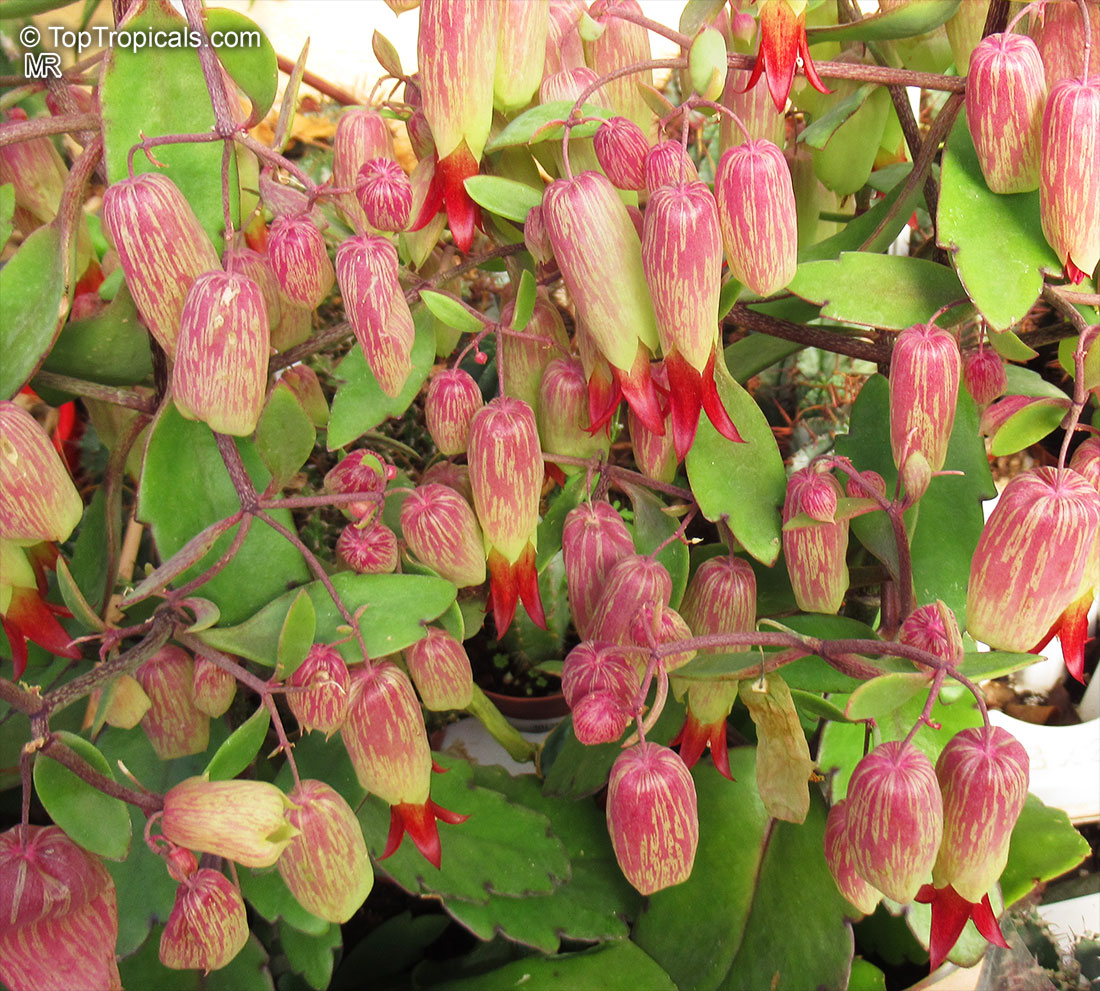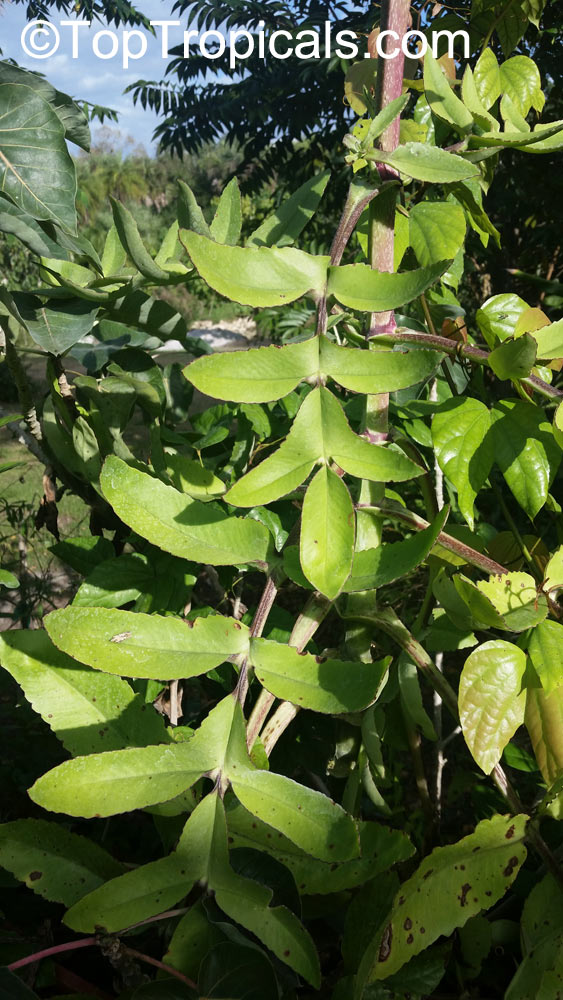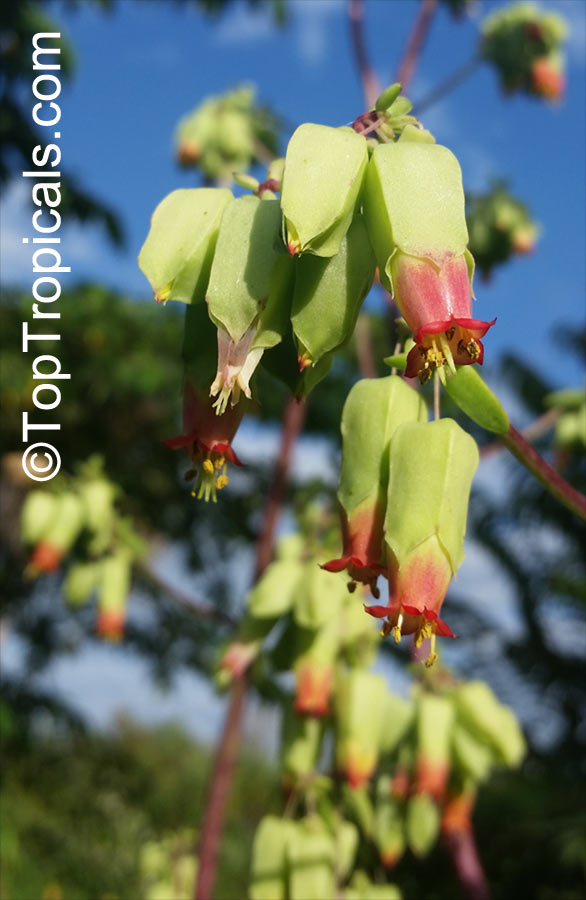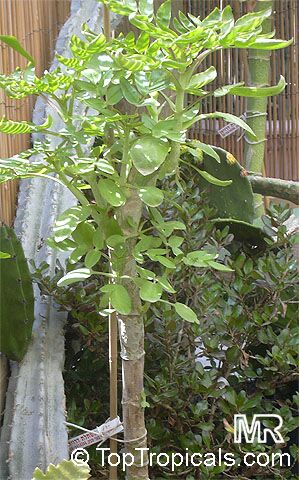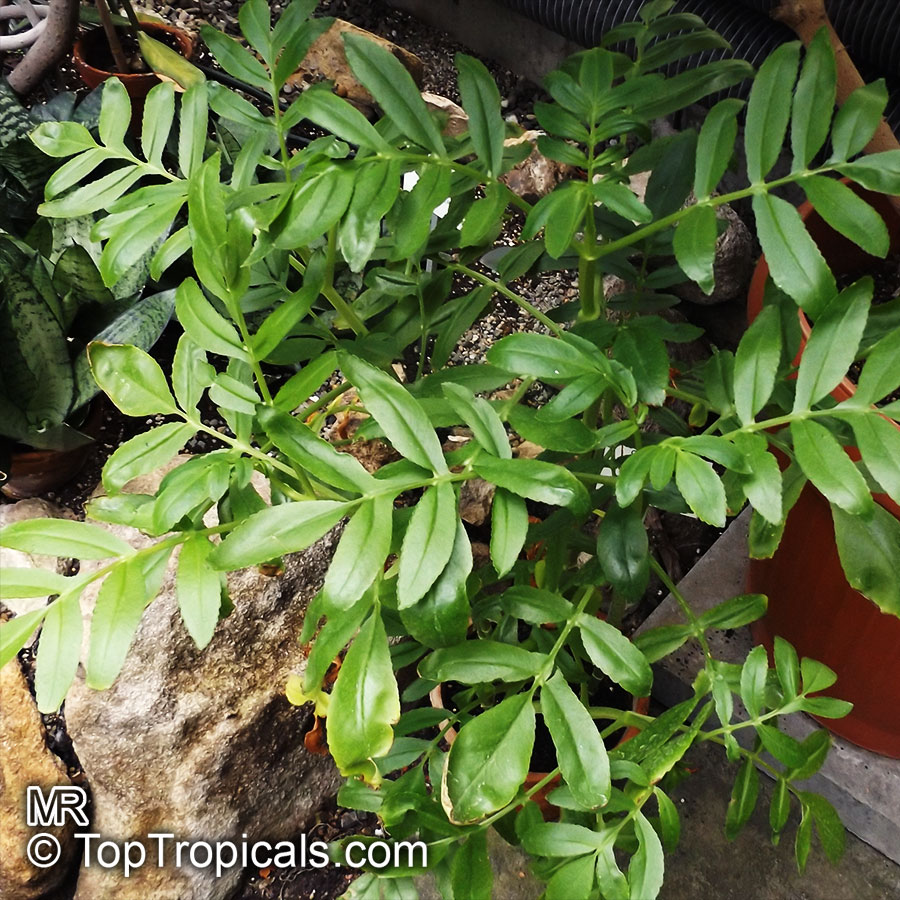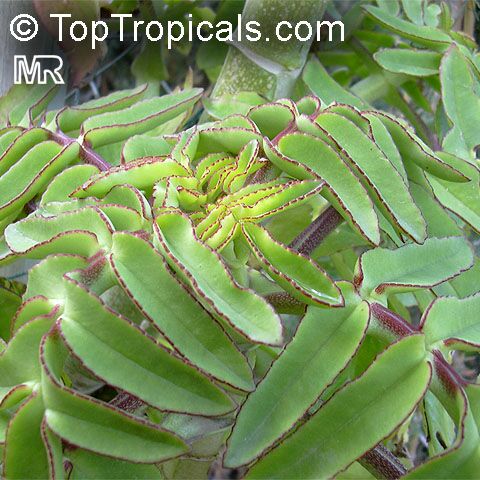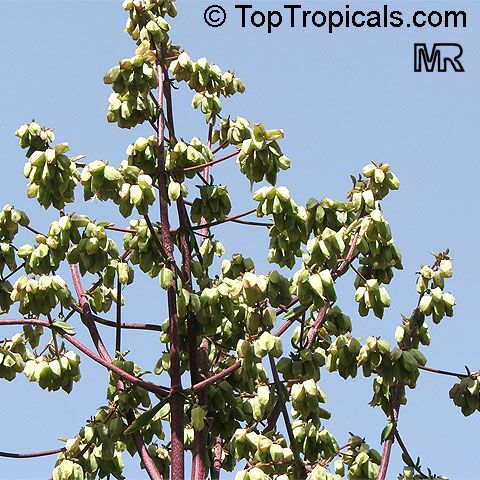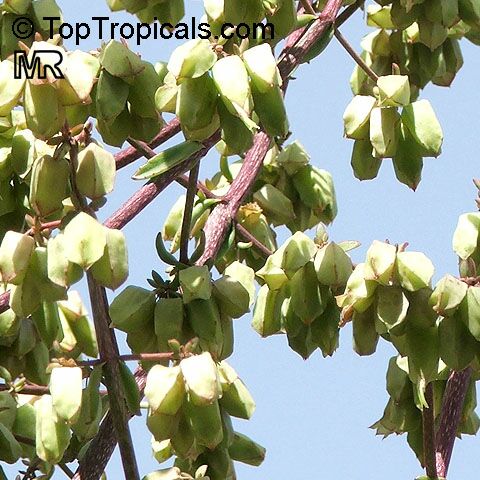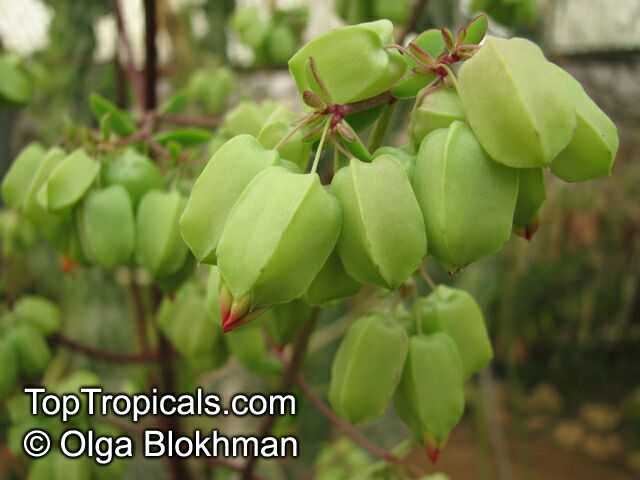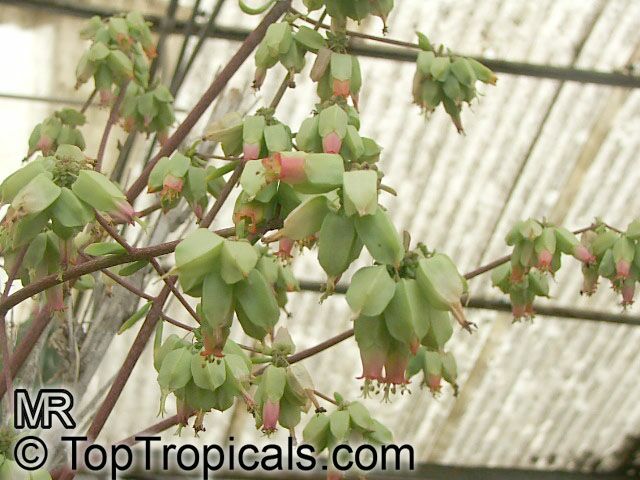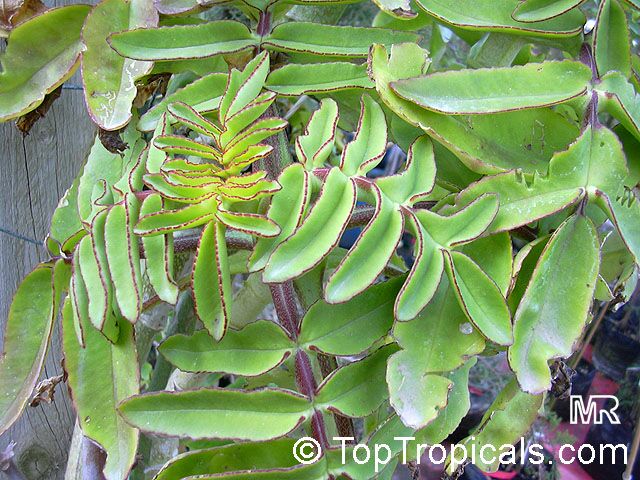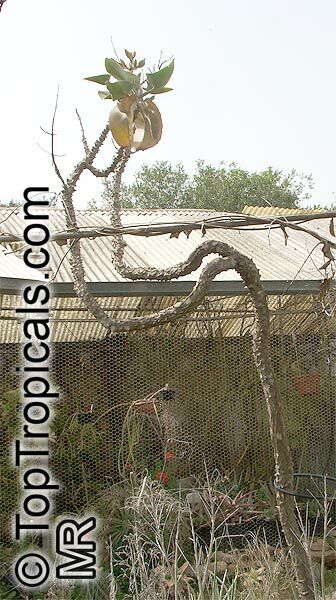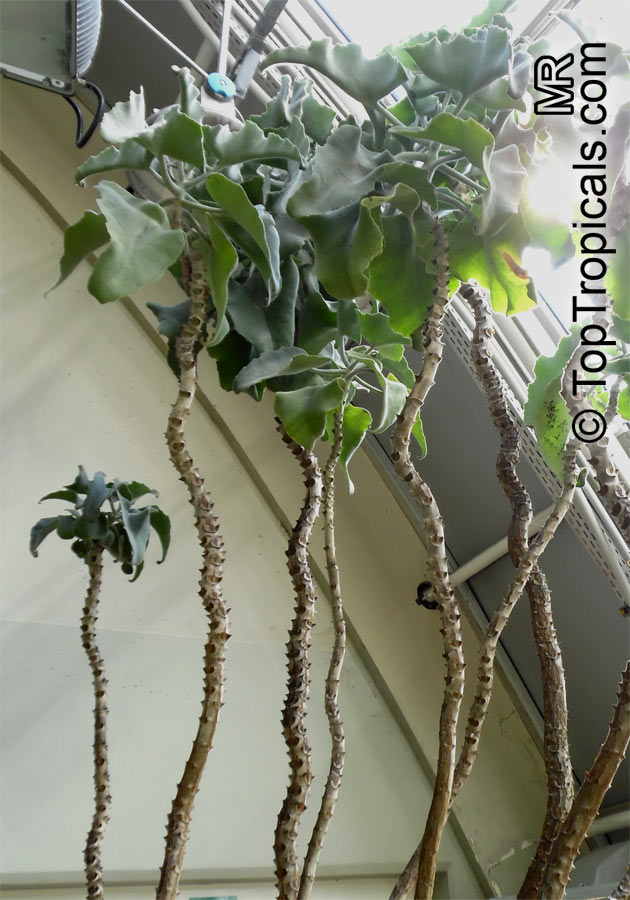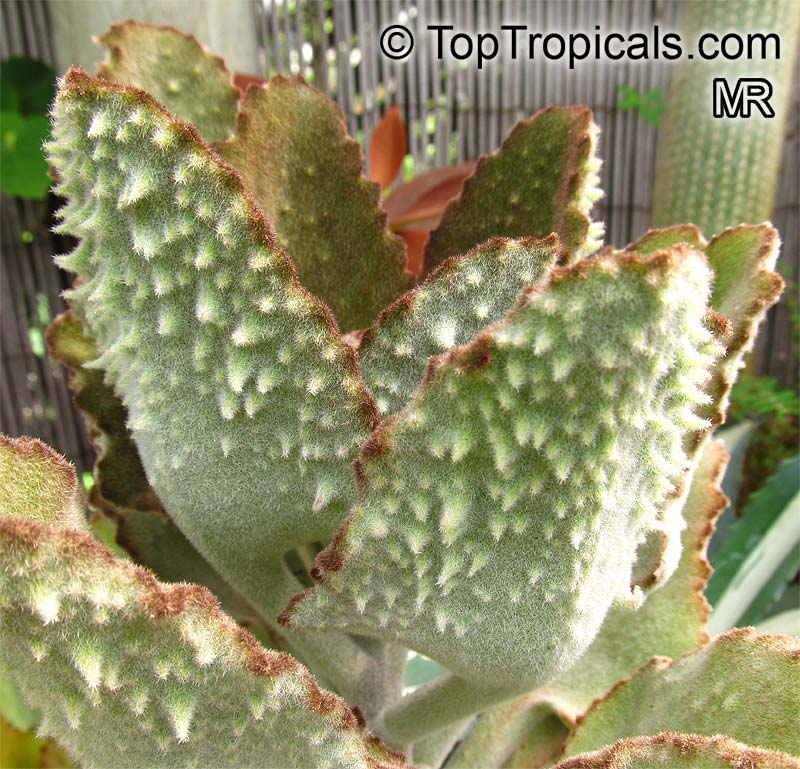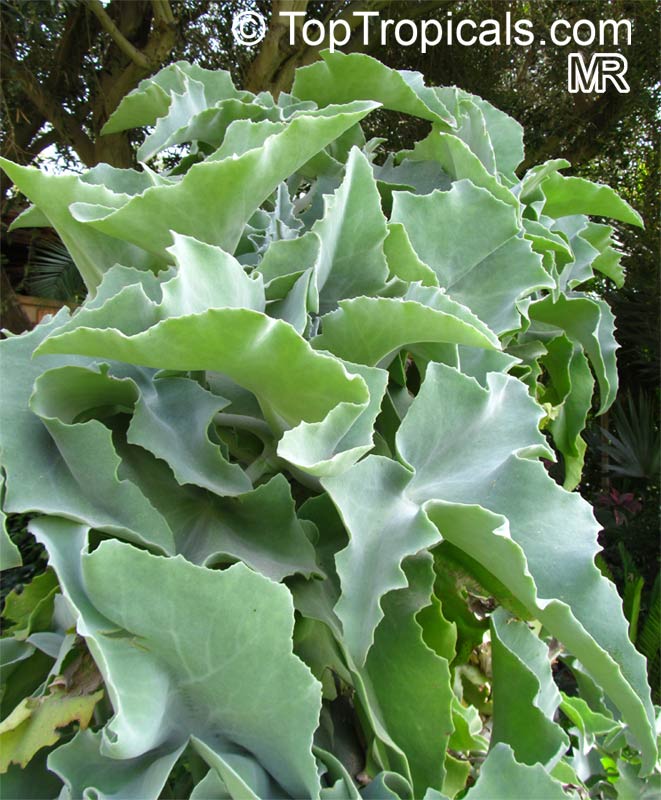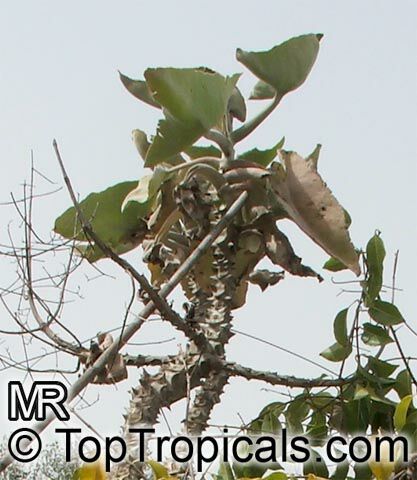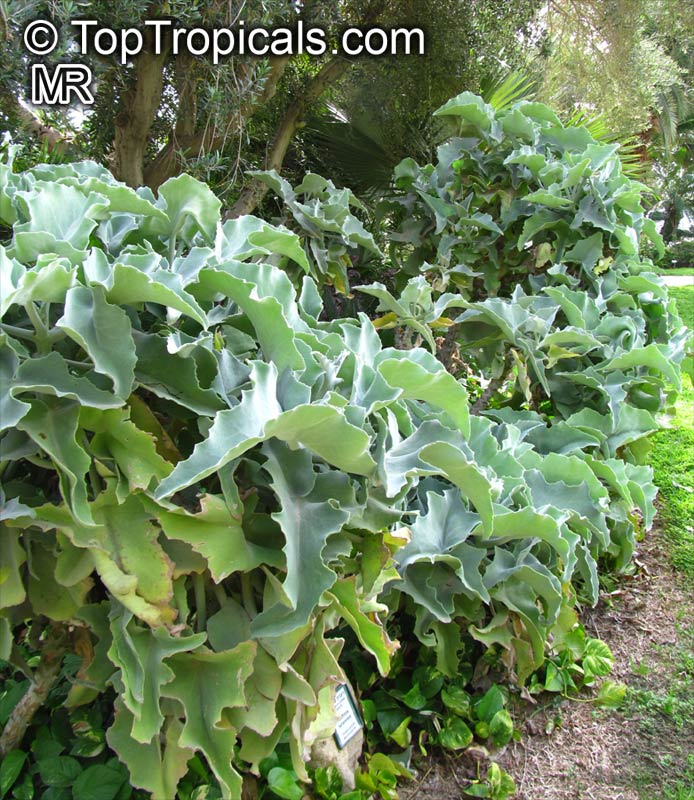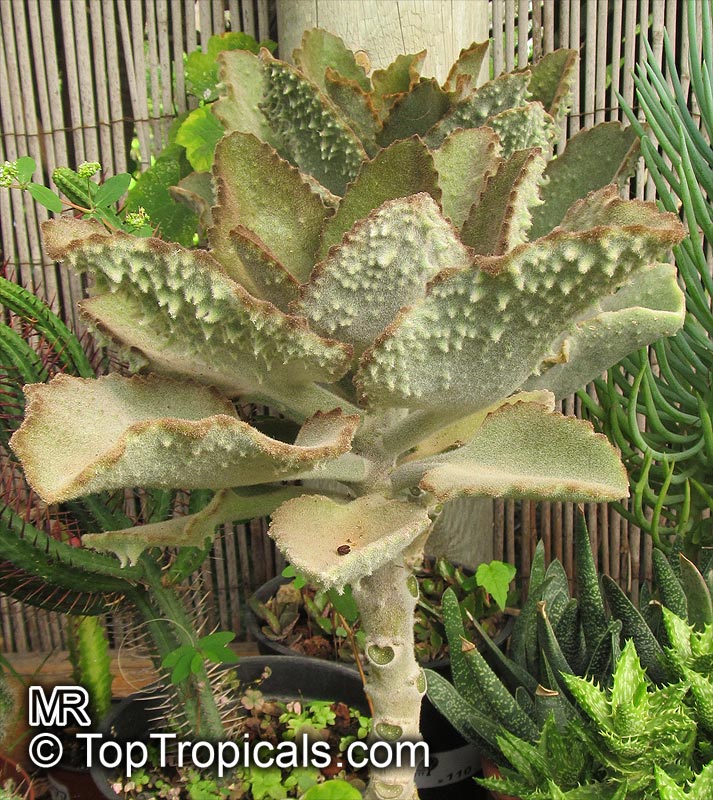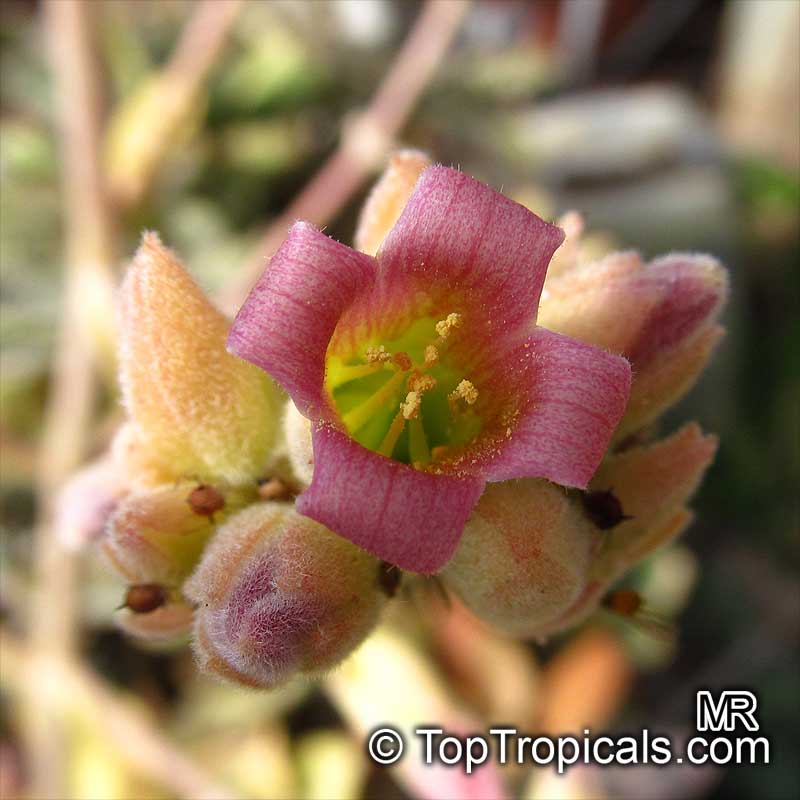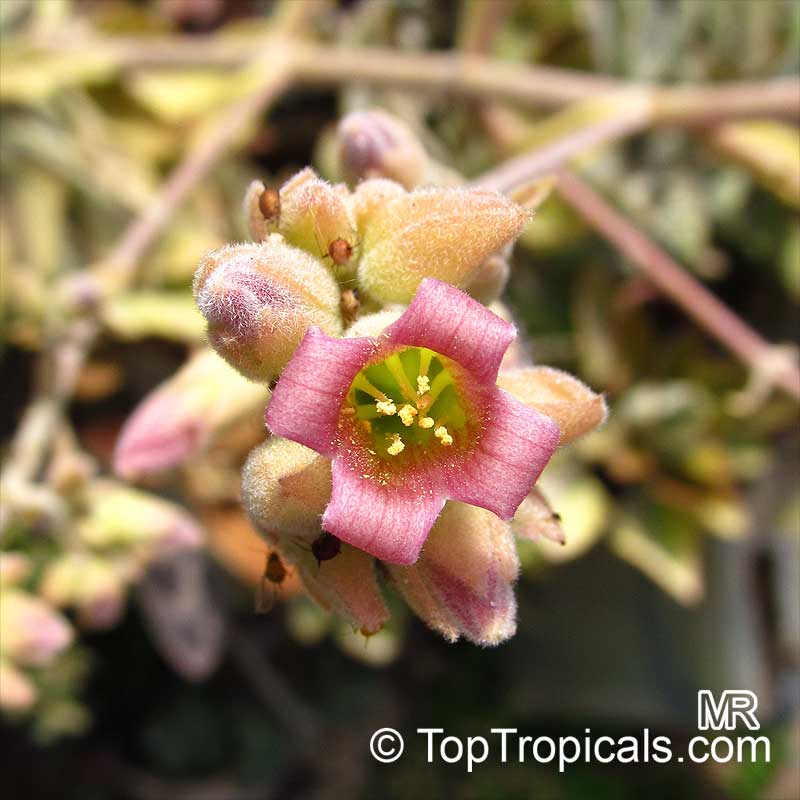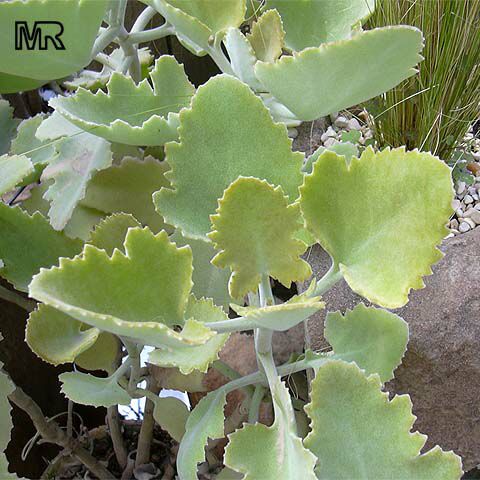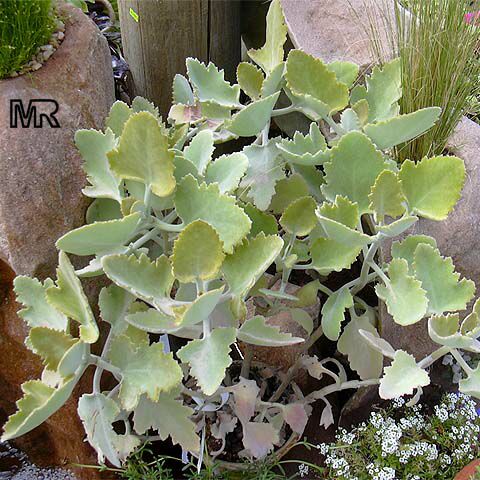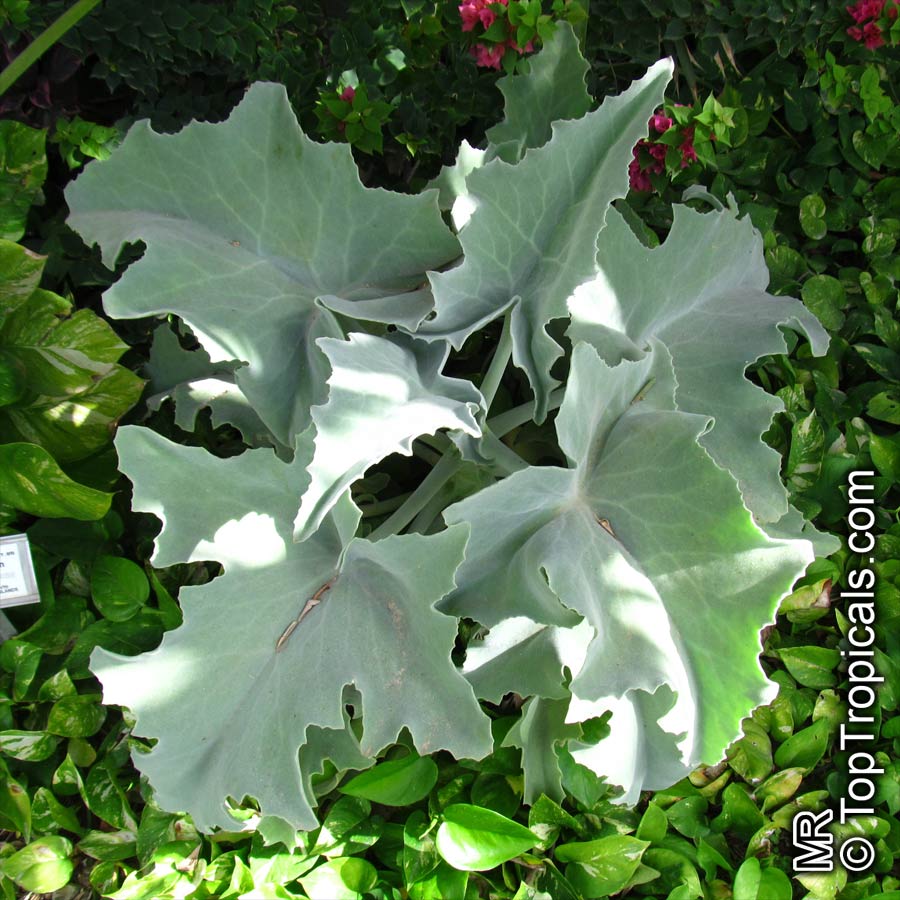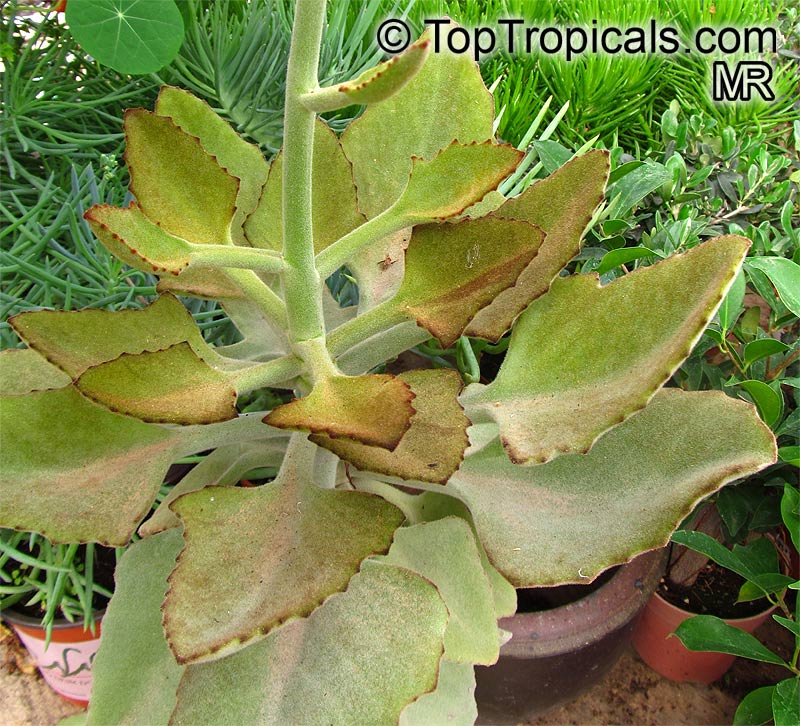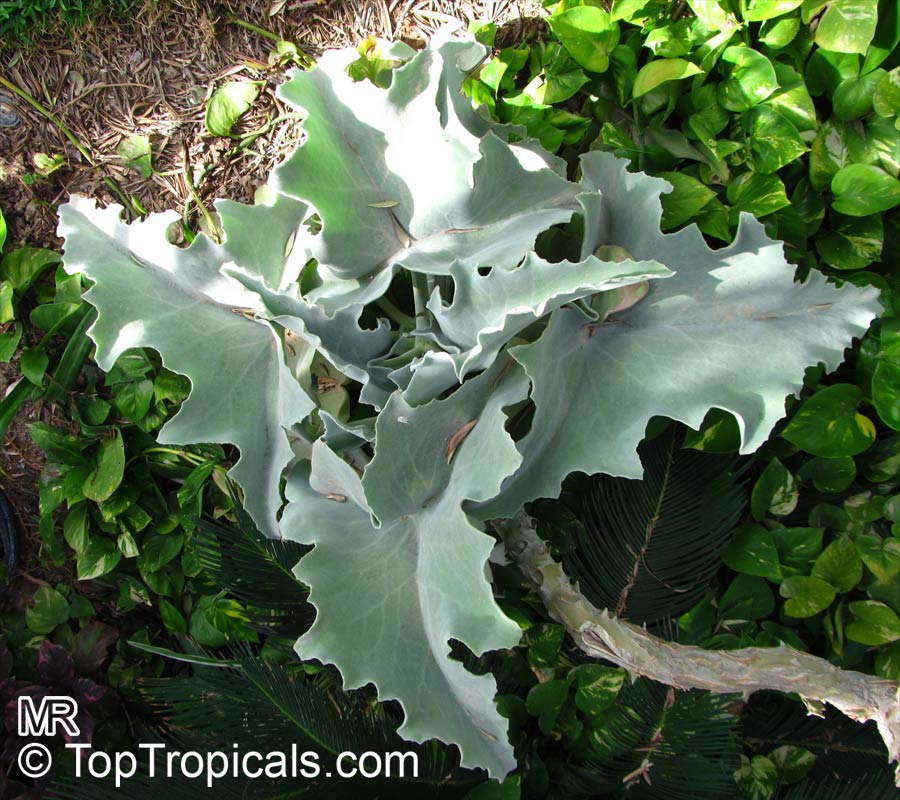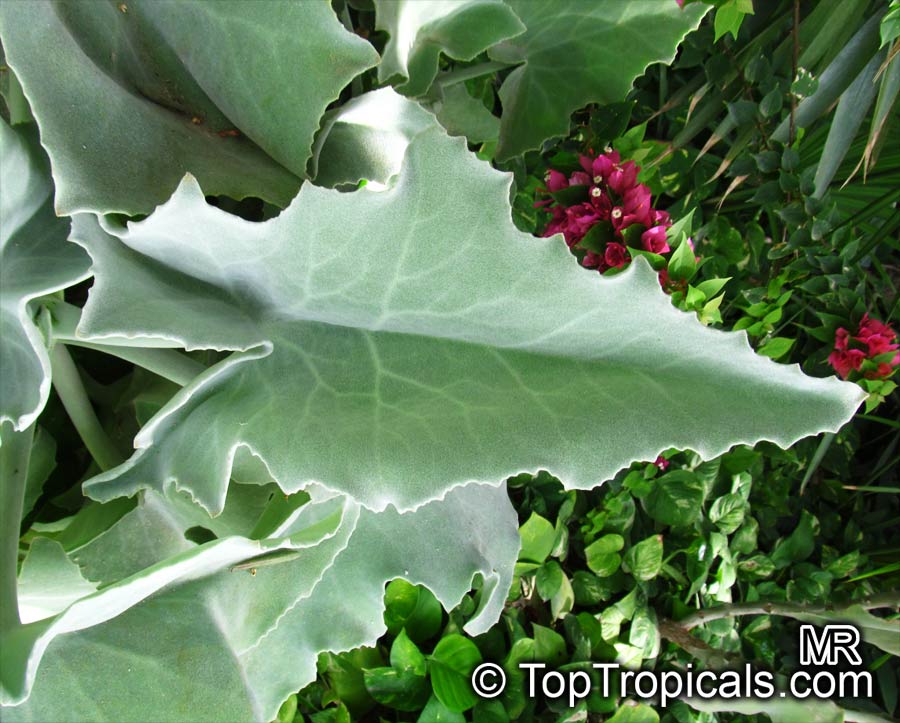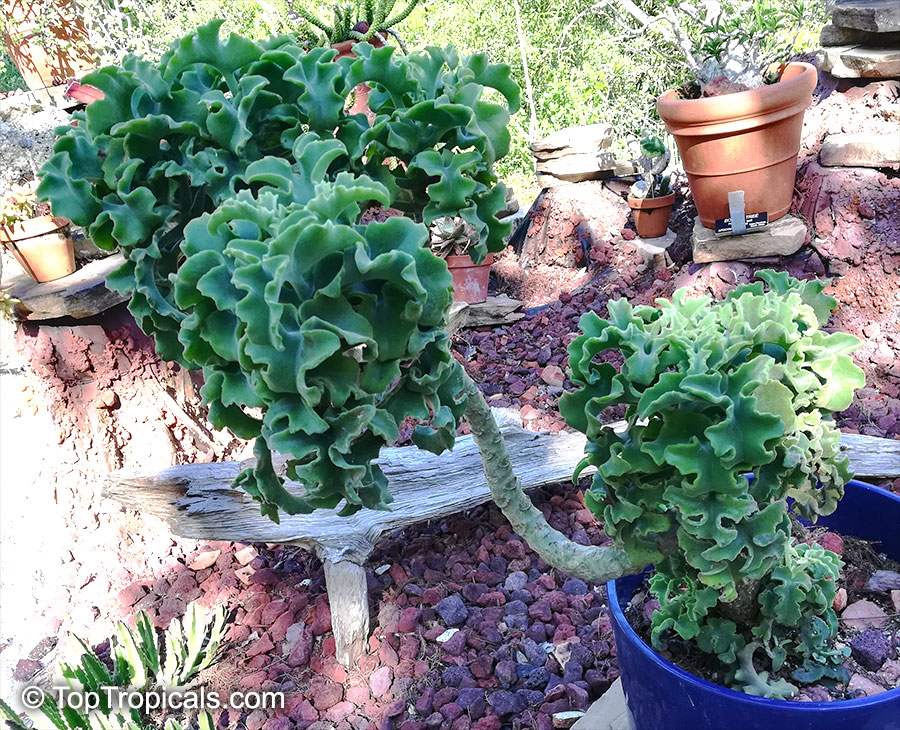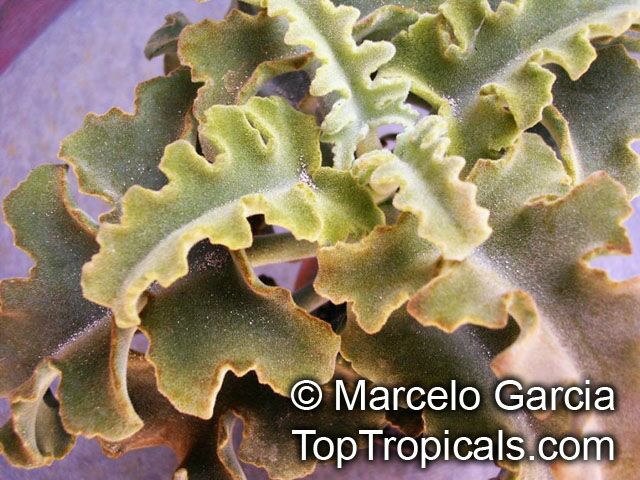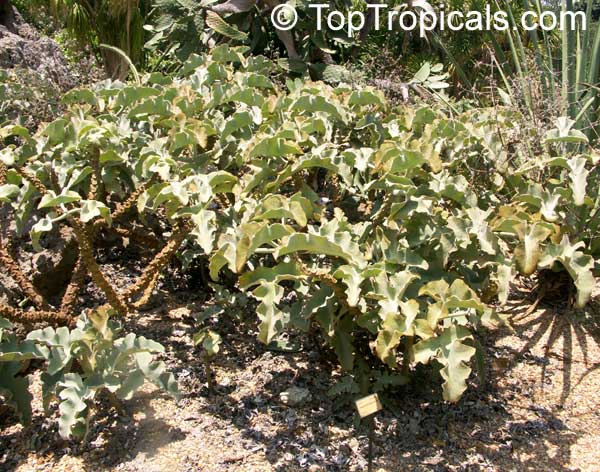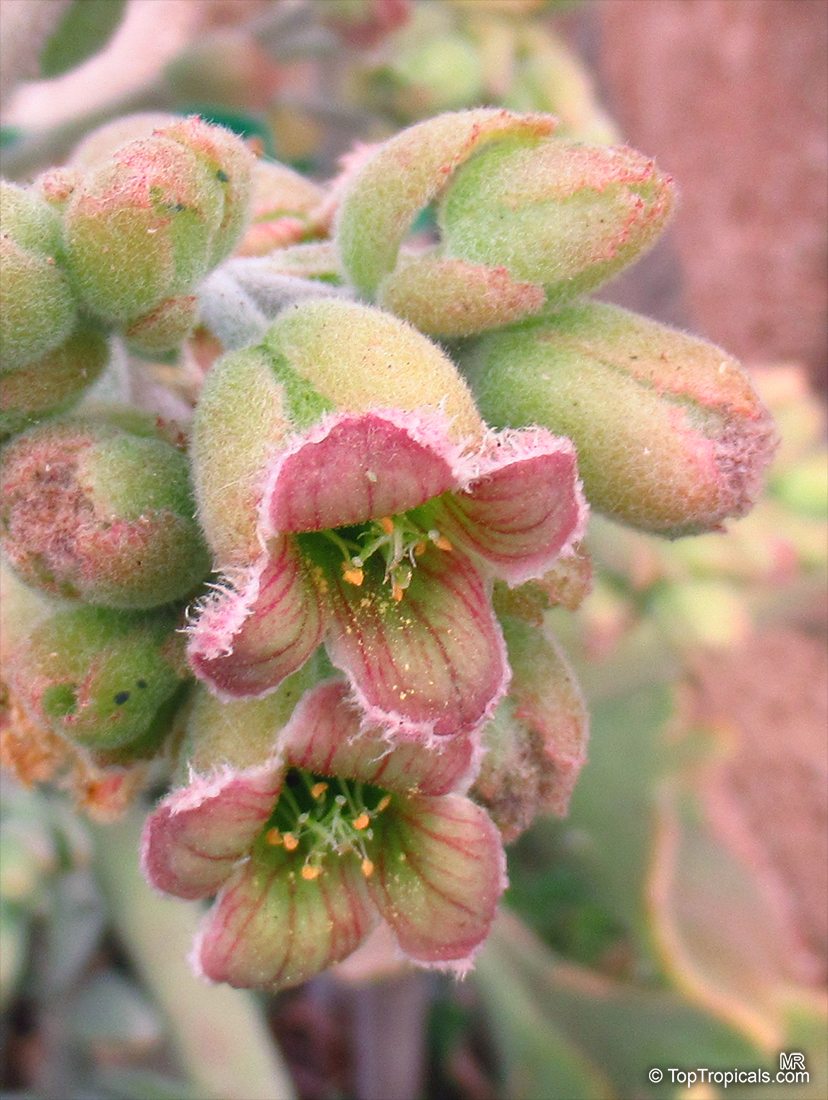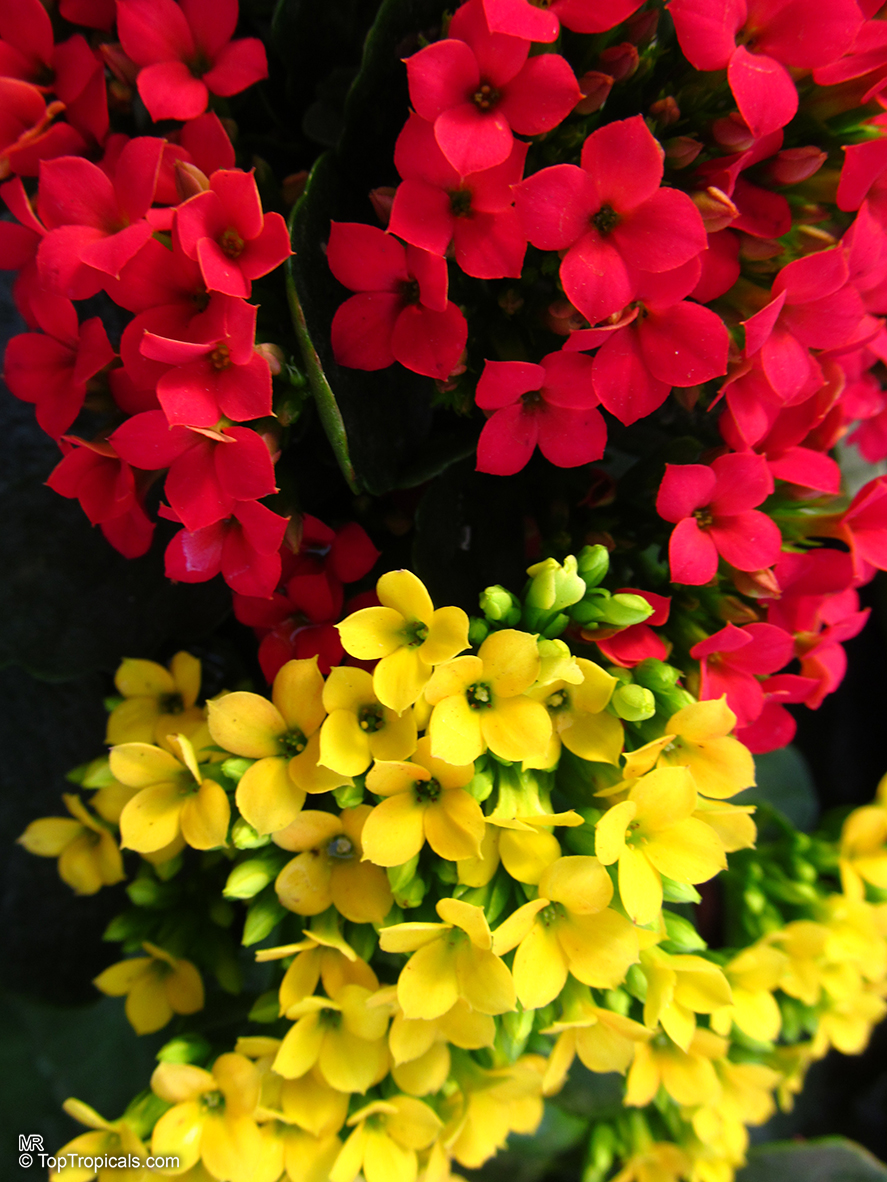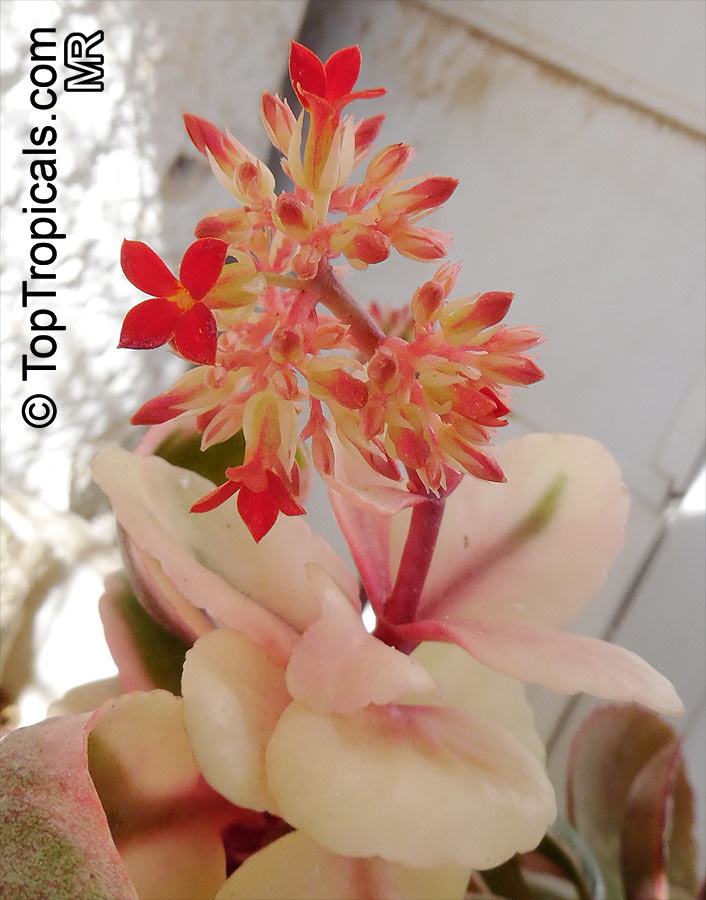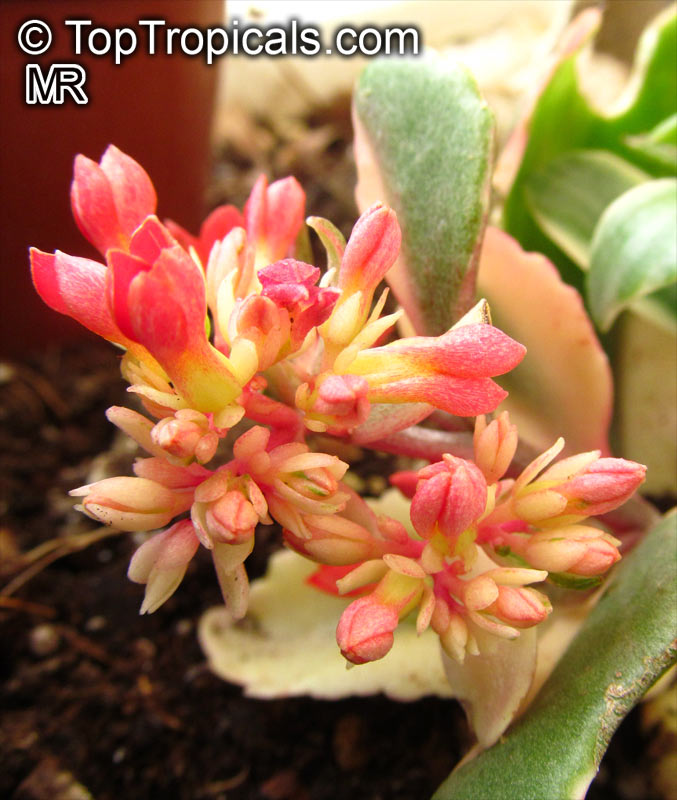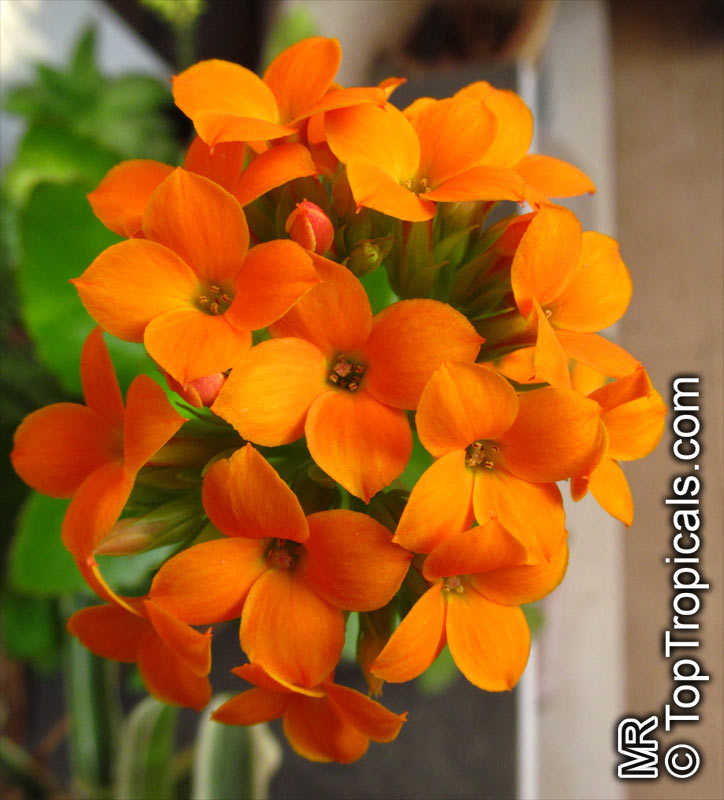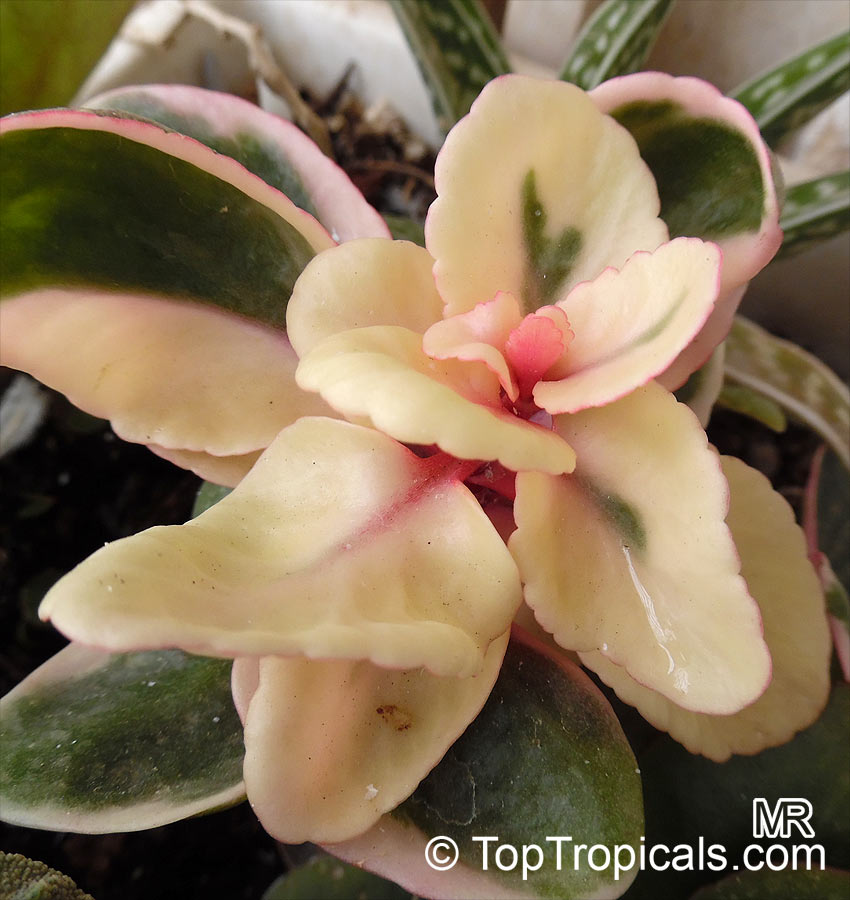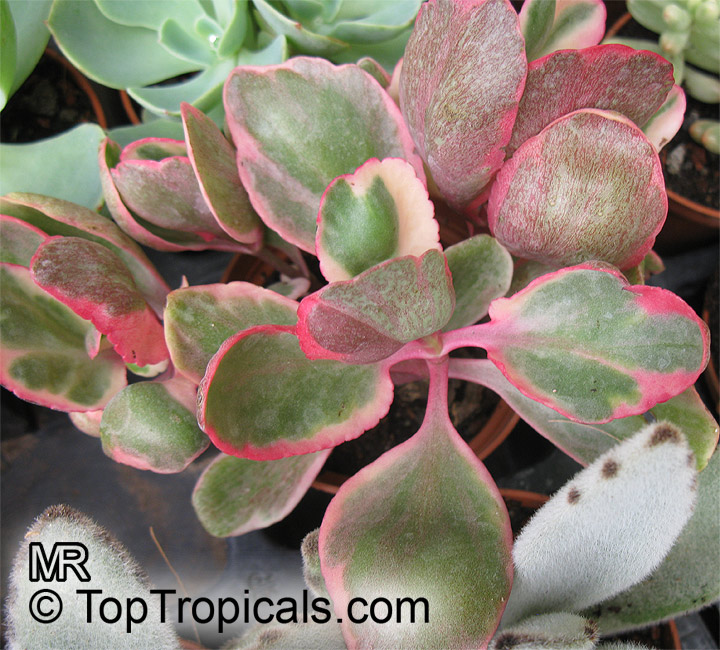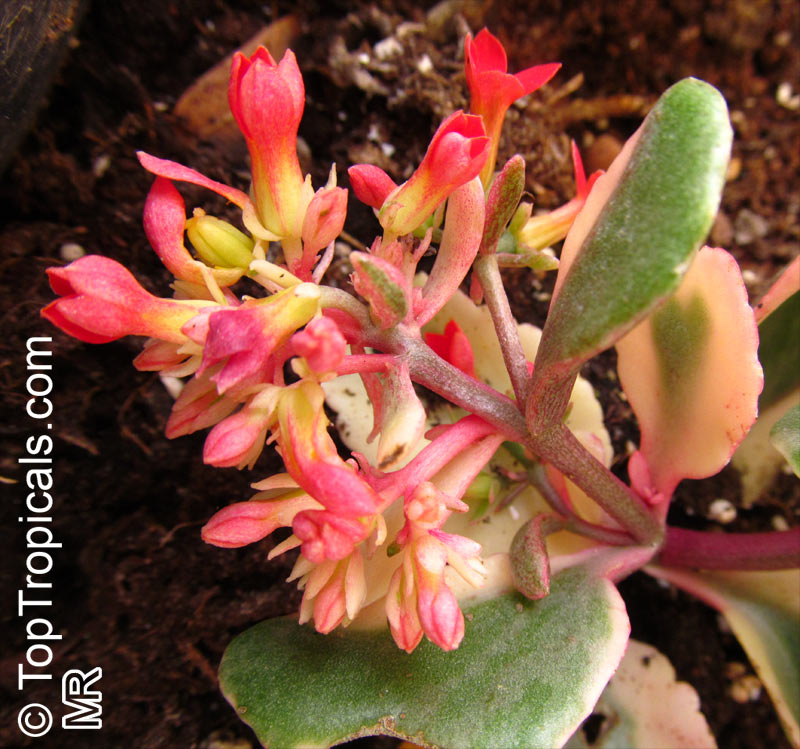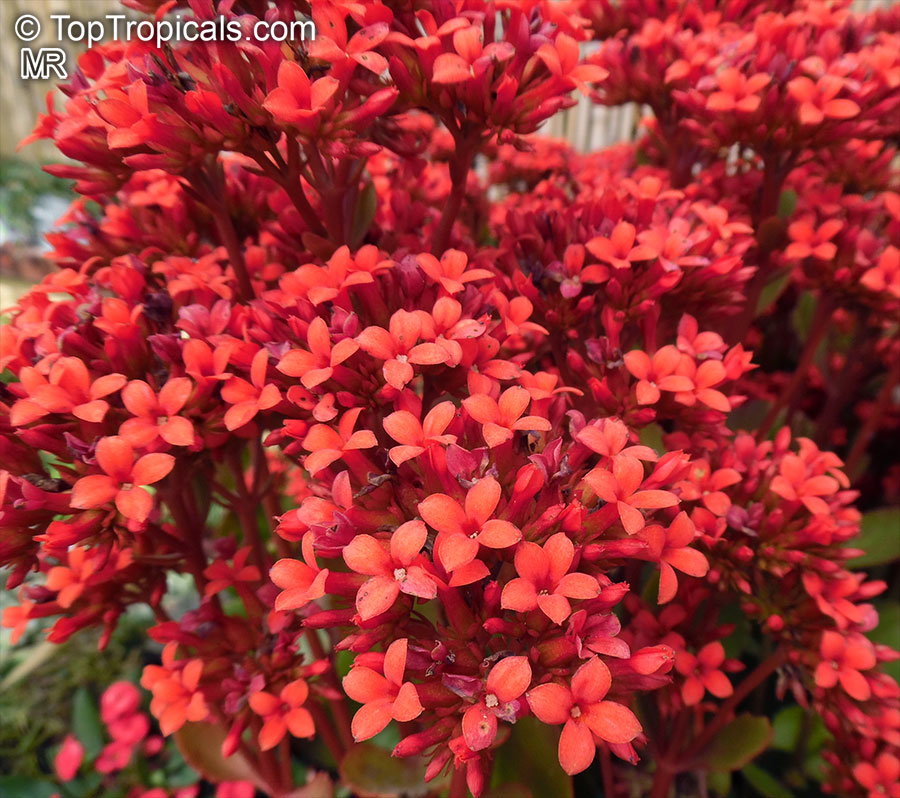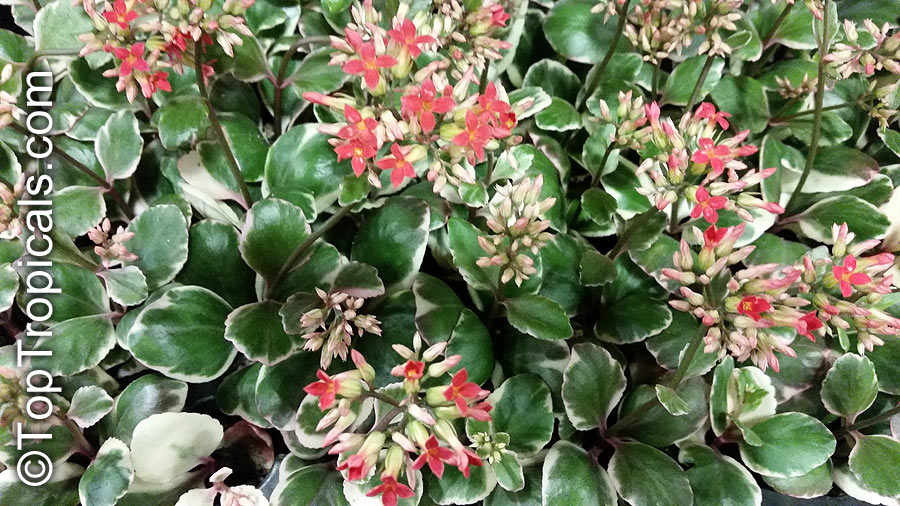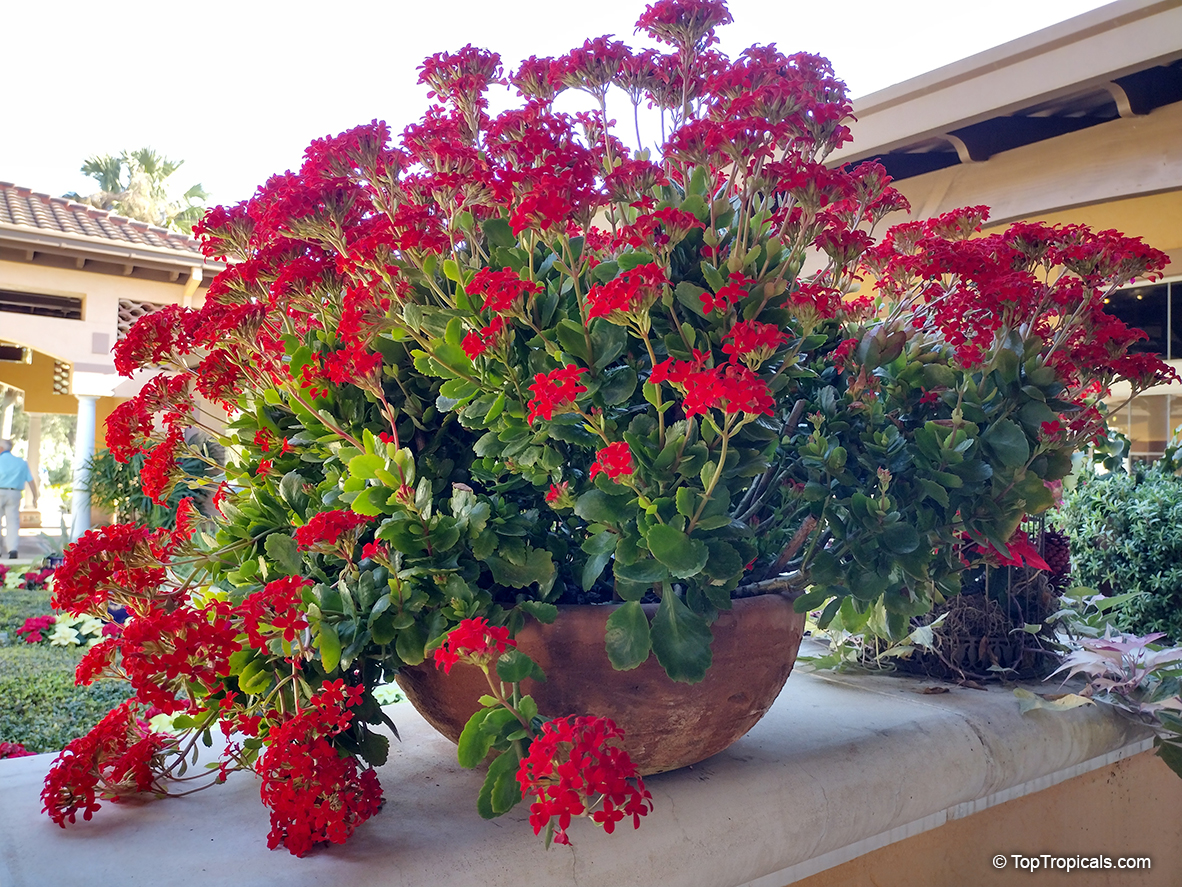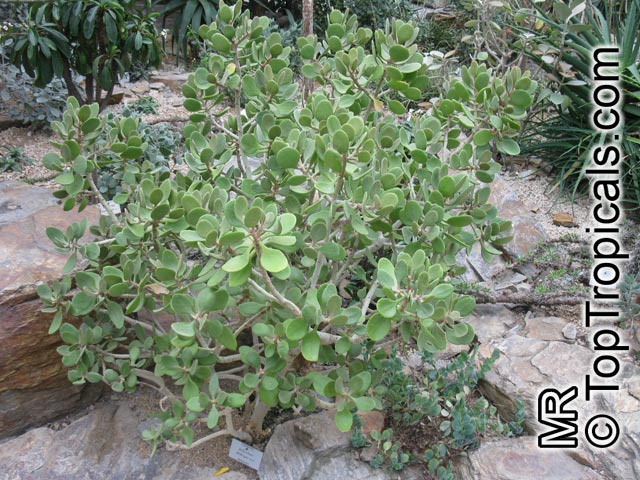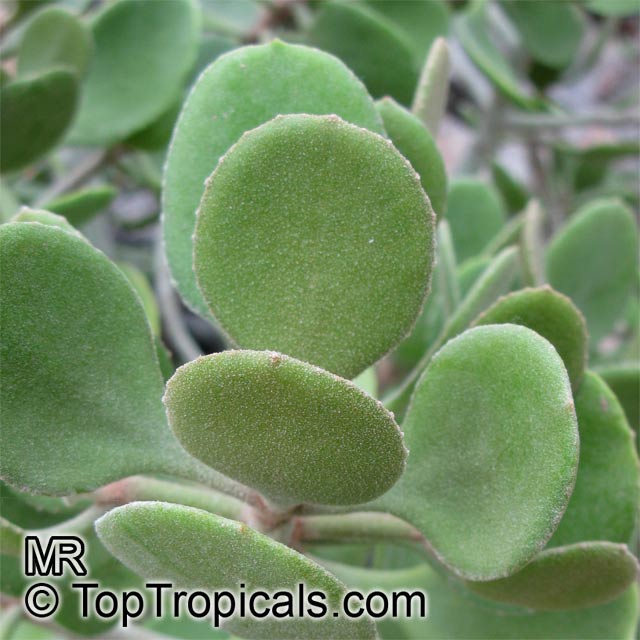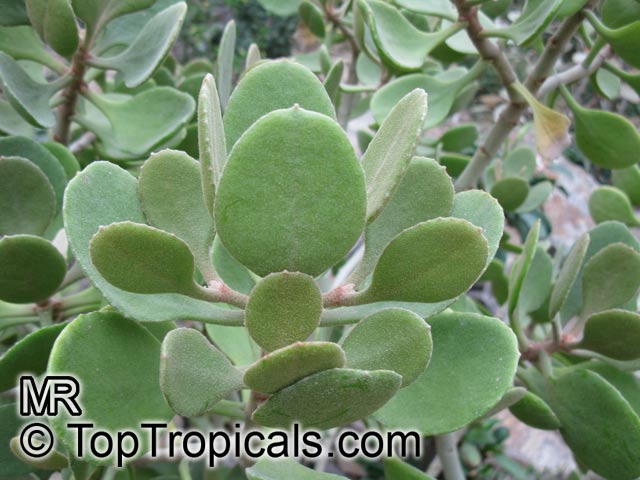Kalanchoe - Plant Encyclopedia Results
Top Tropicals Plant Encyclopedia
| Number of plants found: 29 | Next | 
|
Go to page: | 1 | 2 | 3 |
Botanical names: Bryophyllum beauverdii, Kalanchoe beauverdii
Common name: Kalanchoe
Family: Crassulaceae
Origin: Madagascar






Bryophyllum beauverdii, more commonly known as Kalanchoe, is a vine native to Madagascar. It is a small plant, usually growing no more than 2-5 feet tall. Its leaves are up to 2 inches long, and have unique black-violet color. While the plant prefers full sun, it is also able to thrive in semi-shade and requires moderate to occasional watering. It is a hardy plant and can be grown outdoors in USDA Zones 9-11.
Kalanchoes are great for garden beds as both a ground cover and a climber. Its unique leaves and flowers will add color and interest to your garden. As an indoor houseplant, Kalanchoe is one of the best gifts for gardeners, being easy to care for and long-lasting.
When planting Kalanchoe outdoors, ensure it is in well-drained soil in a sunny area. The plant prefers soil with a slightly low acidity. Water regularly but don't overwater - allowing the soil to dry out between watering can help prevent root rot. Mulching helps to provide the plant with a more consistent temperature, as well as retaining moisture in the soil.
For those living in colder regions, Kalanchoe can be grown in pots and stored in a cool, dry place during winter. During the colder months, water only occasionally, and avoid too much direct sunlight, as the strong sun can damage foliage.
Overall, Kalanchoe is a beautiful, vibrant plant with plenty of color to add to your outdoor and indoor garden. With regular care, you can enjoy its unique leaves and flowers for many years to come.
Botanical names: Bryophyllum daigremontianum, Kalanchoe crenato-daigremontiana, Kalanchoe daigremontiana
Common names: Mother of Thousands, Mother of Millions, Devils Backbone, Mexican Hat Plant
Family: Crassulaceae
Hardiness: 30°F











Bryophyllum daigremontianum (Mother of Thousands) is a small shrub grown in USDA Zones 9-11 that grows 2 to 5 feet tall and makes an excellent ornamental foliage and flowers in landscape. This succulent African native enjoys a warm climate but can survive dry conditions and the salt of the seaside. Growing in full sun or partial shade and receiving adequate rainfall, this evergreen plant displays showy flowers in shades of pink, red and crimson.
To care for your Mother of Thousands succulent, place in a sunny location with good air circulation in a well draining soil. Keep it moist during the spring and summer months, allowing the top few inches of soil to dry slightly between waterings, and reduce watering during the winter months. Adding a little bit of fertilizer in the summer months will ensure your Bryophyllum daigremontianum produces healthy leaves and flowers.
If you'd like to grow Mother of Thousands in cold regions, you can create a suitable environment in a container and bring it inside during the winter. When potted, use cactus soil or a soil made of equal parts of sand, peat moss, and potting soil, and use a container with drainage holes. While it is better to keep it in a warm spot, it can survive cooler temperatures, such as a garage or a cool basement, if you allow some direct sunlight. Additionally, you can use a grow light to ensure your Bryophyllum daigremontianum gets the light it needs. Make sure to keep it moist, but not too wet, and repot as needed.
Mother of Thousands is not only an ornamental plant, but it serves as a traditional medicine plant with ethnomedical properties. Its sap can be quite irritating, so be sure you wear gloves when handling it. In conclusion, this attractive succulent is a great and easy-to-grow addition to your garden or container, and its drought tolerance makes it a valuable part of coastal, low-water gardens.
Botanical names: Bryophyllum delagoense, Kalanchoe delagoensis, Kalanchoe tubiflora, Bryophyllum tubiflorum, Bryophyllum verticillatum
Common name: Chandelier plant
Family: Crassulaceae
Origin: Tropical and South Africa






Very prolific round tubular leaves forming plantlets on the ends that quickly start new plants if they fall to the ground. This plant needs a rather dry atmosphere and complete exposure to sunlight. Throughout the summer, the soil should be kept moist, but in the winter, very little water is needed.
Botanical names: Bryophyllum fedtchenkoi, Kalanchoe fedtschenkoi
Common name: Kalanchoe
Family: Crassulaceae
Origin: Madagascar






Bryophyllum fedtchenkoi, otherwise known as Kalanchoe, is a small plant native to Madagascar that can grow 2-5 feet in height. It is an extremely ornamental species, containing leaves of bluish-green hue with brown margins that can take on a pink hue when exposed to a sufficient amount of full sun. These foliage-rich plants are hardy in USDA Zones 9-11, and are typically seen in seaside climates due to their salt tolerance.
The flowers of Bryophyllum fedtchenkoi are vinous in colour, ranging from a deep red to a crimson hue, with their inflorescence reaching 12" tall. The blooms are incredibly attractive, making it a popular choice for gardeners.
Growing this bushy-branched specimen is easy - and it can be done in pots for those living in colder climates. When planting in pots, it is important to use a well-draining material, and avoid moist and waterlogged conditions for best results. Moderately watering about once a week during dry seasons, and keeping the plant in plenty of full sun should not pose too much of a challenge, and should allow the Kalanchoe to thrive.
Botanical names: Bryophyllum gastonis-bonnieri, Kalanchoe gastonis-bonnieri, Kalanchoe adolph-engleri, Bryophyllum adolph-engleri
Common names: Giant kalanchoe, Donkey Ears; Life Plant; Miracle Leaf; Sprouting Leaf; Sprout Leaf Plant; Leaf of Life; Good Luck Leaf, Tree Of Life
Family: Crassulaceae
Origin: Thailand








This rare variety brought from Thailand has large fleshy leaves 1-2 ft in length. Leaves and stems are covered with silvery coating. Flowers are very showy, red with orange-yellow or light yellow. When planted in groups, these plants make very unforgettable view, covered with flame-like flowers. Like other kalanchoes, leaflets form easily, they are fuzzy and silver. Easy to grow just from one leaf set on top of moist soil. Very fast growing, drought tolerant small shrub. Tolerates almost any conditions.
Recommended Fertilizer: SUNSHINE Robusta - Rapid Growth Booster
Botanical names: Bryophyllum pinnatum, Kalanchoe pinnata, Bryophyllum calycinum
Common names: Bahamas Breath Plant, Hawaiian Air Plant
Family: Crassulaceae
Origin: Bahamas








Native Hawaiian plant. Easy to grow just from one leaf set on top of moist soil. Very fast growing, drought tolerant small shrub. Tolerates almost any conditions. Spectacular bloomer! Other common names: Donkey Ears; Life Plant; Miracle Leaf; Sprouting Leaf; Sprout Leaf Plant; Leaf of Life; Resurrection Plant; Canterbury Bells; Cathedral Bells; Mexican Love Plant; Floppers; Good Luck Leaf; Tree Of Life; Hawaiian Air Leaf; Palm Beachbells. Bahamians call it Life Leaf or Ploppers. In the Bahamas it is mostly used for Asthma or shortness in breath.
Botanical names: Bryophyllum proliferum, Kalanchoe prolifera
Common name: Blooming Boxes
Family: Crassulaceae
Origin: Island of Madagascar




A very interesting giant specie, inch thick jointed stems are waxy, as are the opposite pairs of fleshy, succulent leaves. Terminal inflorescence of yellow flowers from dangling four-sided box-like bracts yields a multitude of plantlets. Propagation: Bulbils coming after the flowers, underground stolons.
Botanical name: Kalanchoe beharensis
Common name: Velvet Leaf
Family: Crassulaceae
Origin: South Madagascar








Kalanchoe beharensis need full sun to part shade with intermediate to warm temperatures. Water sparingly at all times. The use of fertilizer is discouraged. They thrive in nutrient poor soils (equal amounts of loam and sand with gravel added for drainage). The stems are usually unbranched and may reach a height of 10 feet or more. Propagation: Kalanchoe beharensis is propagated by the removal of plants around the base of the main plant and by leaf cuttings. K.B.'Fang' is named for the stippled, fang-like texture on the underside of its leaves. A superb cultivar of beharensis. Habit of growth is similar to beharensis but the leaves are smaller. The leaves have brown margins in ideal light.
Botanical name: Kalanchoe blossfeldiana
Common names: Flaming Katy, Christmas Kalanchoe, Florist Kalanchoe
Family: Crassulaceae





Kalanchoe blossfeldiana is a small shrub typically grown as an annual in cooler climates. It is a symmetrical plant with 2-5 feet tall and dark green leaves, and bears brightly colored flowers in the late autumn to early winter. The four petal flowers come in a a wide range of shades, from dark reds and pinks to oranges, golds and whites.
The plant enjoys full sun, but does tolerate some shade. It requires moderate amounts of water throughout the warmer months, but care must be taken not to overwater it, as too much can weaken the plant and make it susceptible to pests and diseases.
In cultivation, Kalanchoe blossfeldiana is best suited to USDA zones 9-11 and can be grown in cooler climates as an annual in pots. When planting, ensure the area is sheltered from strong winds and provides plenty of sun, and select a fast draining soil mixture, such as one with a large proportion of perlite and/or sand. For best results, regularly fertilize and water, and bring the potted plant indoors during the colder months.
This small shrub is tolerant of flooding and frost, however, it is not cold hardy and extreme temperatures can cause significant damage to the branches and foliage. In order to protect the plant, it is best to either bring it inside, or to place in a sheltered and sunny spot.
Botanical name: Kalanchoe dinklagei
Common name: Kalanchoe
Family: Crassulaceae
Origin: Madagascar






Native to Madagascar and commonly known as the "Madagascar Tree," Kalanchoe dinklagei is a unique succulent plant with unique foliage, making it an eye-catching specimen. Usually grown as a large shrub 5-10 ft tall, it can reach heights of up to 20 ft and form a small tree.
Kalanchoe are sun-loving plants, and they thrive when given full sun exposure. When young, they can be grown in direct or diffused light, although direct sun in the late morning or early afternoon is recommended. Water should be moderate, minimum once a week in the growing season, but soil should be allowed to dry between waterings. Overwatering will cause yellowing and rotting of leaves and stems.
Kalanchoe dinklagei produces fragrant pink and white, off-white flowers in early spring. These flowers can cascade delicately down the sides of the container.
Kalanchoe dinklagei can be grown in USDA Zones 9-11 and is suitable for growing in containers. Keep in mind that in cooler climates, extreme temperatures should be avoided, so overwinter indoors or in a warm location. Plant Kalanchoe in well-draining, nutrient-rich potting soil, and in a pot that has drainage holes. Place the pot in an area where they can receive full sun, and remember to water moderately, allowing soil to dry between waterings. If you are growing Kalanchoe in a colder climate, you can move the pot indoors and maintain in a warm, humid environment. For best results, refrain from fertilizing too often as this can cause leaf urling.
| Next |  |
Use link to repeat this search:
https://toptropicals.com/cgi-bin/garden_catalog/cat.cgi?find=Kalanchoe&search_op=and&keyword_op=and&language=e&number=10
&no_change_lang=1&user=tt&sale=1&first=0
